4 Volumes
Constitutional Era
American history between the Revolution and the approach of the Civil War, was dominated by the Constitutional Convention in Philadelphia in 1787. Background rumbling was from the French Revolution. The War of 1812 was merely an embarrassment.
Philadelphia Since the Industrial Revolution
The Industrial Revolution began about the time America declared Independence. The young nation faced a clean slate and boundless opportunities.
History: Philadelphia and the Quaker Colonies
Philadelphia and the Quaker Colonies
Nineteenth Century Philadelphia 1801-1928 (III)
At the beginning of our country Philadelphia was the central city in America.
Philadelphia Legal Scene
The American legal profession grew up in this town, creating institutions and traditions that set the style for everyone else. Boston, New York and Washington have lots of influential lawyers, but Philadelphia shapes the legal profession.
William Penn Conducts a Witchcraft Trial
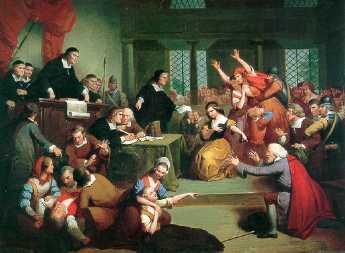
|
| Salem Witch Trials |
When trials for witchcraft are mentioned, most people think of Salem, Massachusetts, where 19 people were hanged as witches and hundreds were imprisoned, in 1692. The Salem trials were apparently provoked by a minister from Barbados, and it is thought the uproar about witches in America was in part related to encountering the spiritualism of the Indian tribes. Whatever its origins, the issue has been in the background for a long time, and occasionally even surfaces today in accusations of "Satanic rituals."
There were trials for witchcraft in New York in 1664, in West Chester in 1672, and in Princess Ann county of Virginia. But the trial of central interest to Pennsylvania occurred in 1683, when Governor Penn presided over it, himself. Pennsylvania had adopted British laws, including one from James I concerning the crime of witchcraft, so Penn probably had little choice but to hold the trial. His fellow judges were his Council; there is little doubt the outcome reflects his opinion.
The accused were two Swedish women, Margaret Mattson and Yeshro Hendrickson, who pleaded not guilty. Numerous witnesses told vague stories, and Mattson's daughter expressed her conviction of her mother being a witch. Governor Penn finally charged the jury, which brought in a memorable verdict. The defendants were found guilty of "having the common fame of a witch" but not guilty in the manner and form.
There are times, and this was one of them, when it is not useful to be overly precise in your meaning.
William Penn: Visionary with Persuasiveness
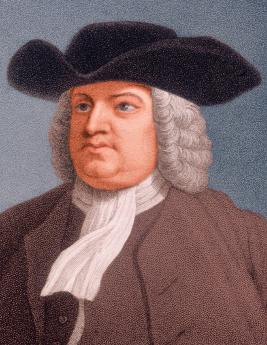
|
| William Penn |
It was a signal and blessed providence which first induced so rare a genius, so excellent and qualified a man as Penn, to obtain and settle such a great tract as Pennsylvania, say 40,000 square miles, as his proper domains. It was a bold conception; and the courage was strong which led him to propose such a grant to himself, in lieu of payments due to his father. He besides manifested the energy and influence of his character in court negotiations, although so unlikely to be a successful courtier by his profession as a Friend, in that he succeeded to attain the grant even against the will and influence of the Duke of York himself who, as he owned New York, desired also to possess the region of Pennsylvania as the right and appendage of his province.
"This memorable event in history, this momentous concern to us, the founding of Pennsylvania, was confirmed to William Penn the Great Seal on the 5th of January, 1681."
-John F. Watson,
Annals of Philadelphia and Pennsylvania in the Olden Time
Concessions and Agreements
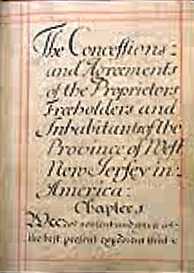
|
| Concessions and Agreements |
The United States Constitution is a unique achievement, but it had significant precursors, many of which James Madison had studied at Princeton. In the days of difficult ocean travel, almost all colonies were bound by an agreement to maintain loyalty to their European owners in spite of receiving latitude to govern themselves. Charters and documents defining these roles were generally written by the owners, and the colonists could pretty much take them or leave them. In the case of New Jersey in 1664, however, a very formidable lawyer and friend of the King named William Penn was drawing up agreements to his own conditions of sale, taking care that the grant of governing authority he received was favorable. Penn's relationship to the King was unusually good, to say the least. He had more reason to be wary of nit-pickers in the King's administration, trying to anticipate every conceivable disappointment for some successor King.
For his part, Penn wanted to make colonial land attractive to re-sell to religious groups who had experienced harsh government oppression; he wanted no obstacles to his announcing there would be no religious oppression in New Jersey. He was offered the role of sub-king although he hastily rejected any such title, and needed to repeat the formalities of the Charter to define his role and reassure his settlers about that matter. Furthermore, he was dealing with the heirs of Carteret and Berkeley, active participants in North and South Carolina. So Penn's method of achieving basic rights was influenced by prior thinking in the Carolinas, as the thinking of John Locke secondarily influenced matters in Delaware and Pennsylvania. These ideas were incorporated in a New Jersey document called "Concessions and Agreements." The concepts were not wholly the ideas of William Penn, but he did write it, and it does contain many ideas that were uniquely his. Understandings about limits were set down, argued about, and agreed to. The owner risked money, the colonist risked his life. Neither would agree unless a reasonable bargain was struck in advance of any dispute. Furthermore, the main value of a colony was beginning to shift from trading rights to real estate rights. Carteret and Berkeley had not only been principals in both the Carolinas and the Jerseys but had been involved in a number of such investments in Africa and the West Indies; New Jersey was just another business deal. It was conventional for documents of this type to define the method of selection of a governor, the establishment of an assembly of colonists, and some sort of council to attend to day to day affairs. In that era, few colonists would cross the ocean without a guarantee of religious freedom, at least for their own brand of religion. Standard clauses which may sound strange in today's real estate world, were then necessary because it was a transfer of not merely land, but also the terms of government. In the case of the Quaker colonies, many of these stipulations were included in the earlier charter from the King. It seems very likely that Penn hovered around and negotiated these points which he wished to have the King agree to; and then once the land was safely his, Penn repeated and expanded these stipulations with the colonists in his Concessions and Agreements . It wasn't exactly a Constitution, but it reads a lot like the one America adopted a century later.
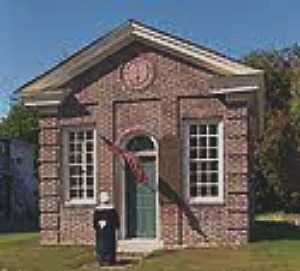
|
| Proprietors House |
Quakers had suffered persecution and imprisonment, and knew exactly what they feared; on the other side, it seems likely Carteret and Berkeley were less interested. So this real estate transfer document conceded almost anything the colonists wanted and the King would stand for, couched in conciliatory phrases. For example, no settler was to be molested for his conscience, and liberty was to be for all time, and for all men and Christians. Elections, by the way, must be annual, and by secret ballot. While law and order must prevail, nevertheless no man is to be imprisoned or molested except by the agreement of twelve men of the neighborhood. On the matter of slavery, no man was to be brought to the colony in bondage, save by his own consent (that is, indentured servants were to be permitted). And in what proved to be a final irony for William Penn, there was to be no imprisonment for debt. Almost all of these innovative ideas survived into the U.S. Constitution a century later, but the most innovative idea of all was to set them all down in a freely-made agreement in writing. This was not merely how a government was organized, it defined the set of conditions under which both sides agreed it would operate.
It was, of course, more than that. It was a set of reassurances to settlers who had been in New Jersey before the English arrived that they, also, would be treated as equals. It was a real estate advertisement to the fearful religious dissenters back in England that it was safe to live here. And it was a reminder to future Kings and Parliaments that this is what they had promised.
The pity and a warning, is that the larger vision of a whole continent governed fairly by common consent may have been too grandiose for a little band of New Jersey Quakers, surrounded as they were by an uncomprehending world. All utopias are helpless when stronger neighbors reject the basic premise. However, it was the expansion of the pacifist concept to the much larger neighboring territory of Pennsylvania that proved to be just too much for such a small group of friends to manage by consensus, particularly when unbelieving immigrants began to outnumber them. But the essential parts of it certainly remained in the minds of delegates to the Constitutional Convention in 1787. When the minutes of the Constitutional Convention speak of the "New Jersey Plan", the Concessions and Agreements was what they had in mind.
REFERENCES
| Concessions and Agreements of New Jersey 1676: William Penn | New Jersey State Library |
| Camden After the Fall: Decline and Renewal in a Post-Industrial City: Howard Gillette Jr.: ISBN-13: 978-0812219685 | Amazon |
East Jersey's Decline and Fall
The colony of New Caesaria (Jersey) had two provinces, East and West Jersey, because the Stuart kings of England had given the colony to two of their friends, Sir George Carteret and John, Lord Berkeley, to split between them. Both provinces soon fell under the control of William Penn but it took a little longer to acquire the Berkeley part, so the Proprietorship of East Jersey was the oldest corporation in America until it dissolved in 1998.
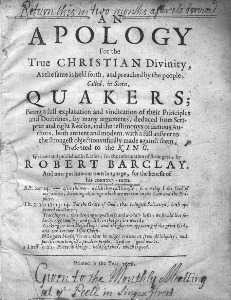 |
| Apology for the True Christian Divinity |
It would appear that Penn intended West Jersey to be a refuge for English Quakers and East Jersey was to be the home of Scots Quakers. Twenty of the original twenty-four proprietors were Quakers, at least half of them Scottish. Early governorship of East Jersey was assumed by Robert Barclay, Laird of Urie, who was certainly Scottish enough for the purpose, and also a famous Quaker theologian. Even today, his Apology for the True Christian Divinity is regarded as the best statement of the original Quaker principles. However, Barclay remained in England, and his deputies proved to be somewhat more Scottish than Quaker. Eighteenth-century Scots were notoriously combative and soon engaged in serious disputes with the local Puritans who had earlier migrated into East Jersey from Connecticut with the encouragement of Carteret. This enclave of aggressive Puritans probably provided the path of migration for the Connecticut settlers who invaded Pennsylvania in the Pennamite Wars, so the hostility between Puritans and Quakers was soon established. The Dutch settlers in the region were also combative, so the eastern province of Penn's peaceful experiment in religious tolerance started off early with considerable unrest. Of these groups, the Scots became dominant, even referring to the region as New Scotland. To look ahead to the time of the Revolution, most of the East Jersey leadership was in the hands of Proprietors of Scottish derivation, with at least the advantage that these were likely to have been very vigilant in seeing Proprietor rights originally conferred by the British King, continue to be honored by the new American republic.
East Jersey was probably already the most diverse place in the colonies when loyalists and revolutionaries took opposite sides in the bitter eight-year war over English rule, with hatred further inflamed when the victors in the Revolution divvied up the properties of loyalists who had fled. The earlier conflict was created by management blunders of the Proprietary leadership itself. Instead of surveying and mapping, before they sold off defined property, like every other real estate development corporation, the East Jersey Proprietors adopted the bizarre practice of selling plots of land first and then telling the purchaser to select its location. In the early years, it is true that good farmland was abundant, but inevitably two or more purchasers would occasionally choose overlapping plots of land. The Proprietors were astonishingly indifferent to the resulting uproar, telling the purchasers that this was their problem. The outcome of all this friction was that settlers petitioned London for relief, and in 1703 Queen Anne took governing powers away from both the East and West proprietorships and unified the two provinces into a single crown colony. The Queen obviously nursed the hope that South Jersey would impose a civilizing influence on the North, but immigration patterns determined a somewhat opposite outcome. Both proprietorships, however, were allowed to continue full ownership rights to any remaining undeeded property.
In later years, the East Jersey Proprietors created more unnecessary problems by attempting to confiscate and re-sell pieces of land whose surveys were faulty, sometimes of a property occupied with houses for as much as fifty years. This East Jersey proprietorship, in short, did not enjoy either a low profile or the same level of benevolent acceptance prevailing in the West Jersey province. A climate of skepticism developed that easily turned any management misjudgment into a confrontation.
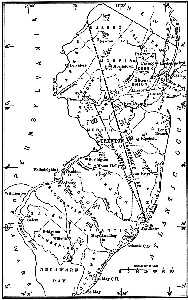
|
| New Jersey Line |
The East Jersey proprietorship operated by taking title to unclaimed land, and then reselling it. In what seemed like a minor difference, the West Jersey group never took title itself, but merely charged a fee for surveying and managing the sale of unclaimed land. The upshot of this distinction was that the East Jersey group got into many lawsuits over disputed ownership, which the West Jersey Proprietorship largely escaped. The nature of unclaimed land in New Jersey is for ocean currents to throw up new islands in the bays between the barrier islands and the mainland, or pile up new swampland along the banks of the Hudson and Delaware Rivers. Such marshy and mosquito-infested land may have little value to a farmer but lately has become highly prized by environmentalists, who supply class-action lawyers with that nebulous legal concept of "standing". The posture of the West Jersey Proprietors is to be happy to survey and convey clear title to a particular property for a fee, but a buyer must come to them with that request. The East Jersey method put its proprietors in repeated conflict over possession and title, with idealists enjoying free legal encouragement from contingent-fee lawyers. By 1998, the Proprietors of East Jersey had endured all they could stand. Selling their remaining rights to the State for a nominal sum, they turned over their historic documents to the state archives. The plaintiff lawyers could sue the state for the swamps if they chose to, but the East Jersey Proprietors had just had enough.
The only clear thing about all of this is that the Proprietors of West Jersey now stand unchallenged as the oldest stockholder corporation in America. It's not certain just what this title is worth, but at least it is awfully hard to improve on it.
Jury Nullification
 |
| Tom Monteverde |
We must be grateful to the late distinguished litigator, Tom Monteverde, for reminding us of the importance of the jury in American history. Juries seldom realize how much power they can have if they unite on a common purpose. In fact, juries have the implicit right to veto almost anything the rest of government does, by rendering it unenforceable. If the jury opinion is a majority view, nothing but a civil war can legally stop them. So it helped Washington to have jury nullification seem an invincible Quaker idea, while the South trusted a rich slave-owner who had renounced power.
 |
| William Penn |
The right to a jury trial originated in the Magna Carta in 1215, but a jury's essentially unlimited power was established four centuries later by Quakers. The legal revolution grew out of the 1670 Hay-market case, where the defendant was William Penn, himself. Penn was accused of the awesome crime of preaching Quakerism to an unlawful assembly, and while he freely admitted his guilt he challenged the righteousness of such a law. The jury refused to convict him. The judge thus faced a defendant who said he was guilty and a jury who said he wasn't. So, the exasperated judge responded -- by putting the jury in jail without food.
The juror Edward Bushell appealed to the Court of Common Pleas, where the problem took on a new dimension. The Justices certainly didn't want juries flouting the law, but nevertheless couldn't condone a jury being punished for its verdict. Chief Justice Vaughn decided that intimidating a jury was worse than extending its powers, so the verdict of Not Guilty was upheld, and Penn was set free. Essentially, Vaughn agreed that any jury that wasn't allowed to acquit was not really a jury. In this way, the legal principle of Jury Nullification of a Law was created. A verdict of not guilty couldn't make William Penn innocent, because he pleaded guilty. A verdict of not guilty, under these circumstances, meant the law had been rejected. Jury nullification thus got to be part of English Common Law, hence ultimately part of the American judicial system.
 |
| Andrew Hamilton |
This piece of common law was a pointed restatement of just who was entitled to make laws in a nation, whether or not nominally it was ruled by a king or a congress. Repeated British evasion of the principles of jury trial became an important reason the American colonists eventually went to war for independence, and probably a better one than some others. The 1735 trial of Peter Zenger was an instance where Andrew Hamilton, the original "Philadelphia Lawyer", convinced a jury that British law, blocking newspapers from criticizing public officials for improper conduct, was too outrageous to deserve enforcement in their court. In that case, jury defiance became even more likely when the judge instructed the annoyed jury that "the truth is no defense". Benjamin Franklin's Pennsylvania Gazette was here quick to come to the side of jury nullification, saying, "If it is not the law, it ought to be law, and will always be law wherever justice prevails." Franklin quickly became allied with Andrew Hamilton, who became Speaker of the Pennsylvania Assembly.
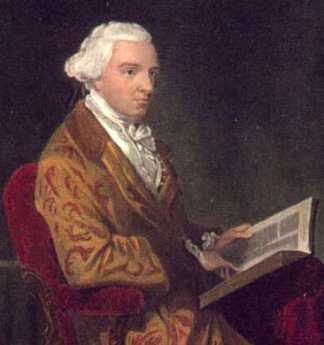 |
| John Hancock |
The Zenger case was often stated to be the origin of the Freedom of the Press in our Constitution fifty years later, but in fact the First Amendment merely provides that Congress shall pass no laws like that. Hamilton had persuaded the Zenger jury they already had the power to stop enforcement of such tyranny, and the First Amendment could be seen as trying to prevent enactment of laws that will foreseeably incite a jury to revolt.
The Navigation Acts of the British government, for example, were predictably offensive to the American colonists, whose randomly chosen representatives on juries were then rendered useless with their wide-spread refusal to convict. This, in turn, provoked the British ministry. John Adams made a particularly famous defense of John Hancock who was being punished with confiscation of his ship and a fine of triple the cargo's value. Adams was later singled out as the only named American rebel the British refused to exempt from hanging if they caught him. As everyone knows, Hancock was the first to step up and sign the Declaration of Independence, because by 1776 there was widespread colonial outrage over the British strategy of transferring cases to the (non-jury) Admiralty Court. Many colonists who privately regarded Hancock as a smuggler were roused to rebellion by the British government thus denying a defendant his right to a jury trial, especially by a jury almost certain not to convict him. To taxation without representation was added the obscenity of enforcement without due process. John Jay, the first Chief Justice of the Supreme Court of the newly created United States, ruled in 1794 that "The Jury has the right to determine the law as well as the facts." And Thomas Jefferson built a whole political party on the right of common people to overturn their government, somewhat softening, it is true, when he grasped where the French Revolution was heading. Jury Nullification then lay fairly dormant for fifty years. But since the founding of the Republic and the reputation of many of the most prominent founders was based on it, there was scarcely need for any emphasis.
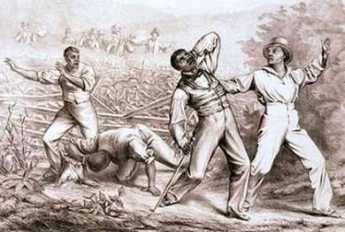 |
| Slave |
And then, the Fugitive Slave Law of 1850 began to sink in. It became evident that juries in the Northern states would routinely refuse to convict anyone under that law, or under the Dred Scott decision, or any other similar mandate of any branch of government. In effect, Northern juries threw down the gauntlet that if you wanted to preserve the right of trial by jury, you had better stop prosecuting those who flouted the Fugitive Slave law. In even broader terms, if you want to preserve a national government, you had better be cautious about strong-arming any impassioned local consensus. A rough translation of that in detail was that no filibuster, no log-rolling, no compromises, no oratory, no threats or other maneuvers in Congress were going to compel Northern juries to enforce slavery within their boundaries of control. All statutes lose some of their majesties when the congressional voting process is intensely examined, and public scrutiny of this law's passage had been particularly searching. Even if Southern congressmen would be successful in passing such laws, it wasn't going to have any effect around here. The leaders of Southern states quickly got a related message, and their own translation of it was, "We have got to declare our independence from this system of government that won't enforce its own laws". If juries can nullify, then states can nullify, and the national union was coming to an end. Both sides disagreed so strongly on this one issue they were willing, for the second time, to risk war for it.
Ku Klux Klan
The idea should be resisted that Jury Nullification is always a good thing. After the Civil War, many of the activities of the Ku Klux Klan were tolerated by sympathetic juries. Many lynch mobs of the Wild, Wild West were encouraged in the name of law and order. Prohibition of alcohol by the Volstead Act was imposed on one part of society by another, and Jury Nullification effectively endorsed rum-running, racketeering, and organized crime. The use of marijuana and abortion are two further examples where disagreement is so strong that compromise eludes us. What is at stake here is protecting the rights of a minority, within a society run by a majority. If minority belief is strong enough, jury nullification issues an unmistakable proclamation: "To proceed farther, means War."
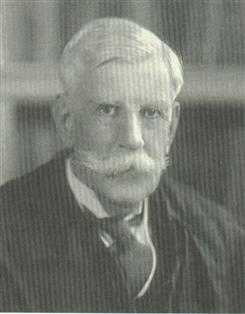 |
| Oliver Wendell Holmes |
That's a somewhat strange outcome for a process started by pacifist Quakers, so the search goes on for a better idea. Distinguished jurists differ on whether to leave things as they are. In a famous exchange, Oliver Wendell Holmes once had dinner with Judge Learned Hand, who on parting extended a lawyer jocularity, "Do justice, Sir, do justice." To which, Holmes then made the somewhat surly response, "That is not my job. My job is to apply the law."
Thus lacking any better approach, it is hard to blame the US Supreme Court for deciding this was something best left unmentioned any more than absolutely necessary. The signal which Justice Harlan gave in the majority opinion on the 1895 Sparf case was the very narrow ruling that a case may not be appealed, solely on the basis that the trial jury was not informed of its right to nullify the law in question. Encouraged by this vague hint, what has evolved has been a growing requirement that incoming jurors take an oath "to uphold the law", officers of the court (ie lawyers)are discouraged from informing a jury of its true power to nullify laws, and Judges are required to inform the jury in their charge that they are to "take the law as the judge lays it down" (ie leave appeals to higher courts). If a jury feels so strongly that it then persists in spite of those restraints, well, you apparently can't stop them. Nobody thinks this is a perfect solution, and aggrieved defendants like the Vietnam War protesters are quite vocal in their belief that the U.S. Supreme Court finally emerged with a visibly asinine principle: a jury does indeed have the right to nullify, but only as long as that jury is unaware it has that right. That's almost an open invitation to perjury if accurate; but while it's not precisely accurate, it comes close to being substantially true.
That's where matters stand, and apparently will stand, until someone finds better arguments than those of Benjamin Franklin, John Jay, Andrew Hamilton -- and William Penn.
The King's Last and Final Word

|
| King Charles II |
In 1662, King Charles II of England signed a charter, giving a strip of land in America to the inhabitants of Connecticut, and that land to stretch from the Atlantic Ocean to the Pacific. And then, eighteen years later, the same king signed a second charter, giving much the same land to William Penn. As lawyers say, these are the facts. In the many lawsuits, arguments, and wars which followed, no one ever seriously raised the point that King Charles was unaware that he was giving the same land twice, so it must be assumed he knew exactly what he was doing, and did it on purpose. In fact, he did this sort of thing many times, in other cases. The legal disputes which this double-dealing inspired, are therefore entirely concerned with whether the King had a right to do it, and if so, whether that right would normally be recognized (i.e. durable) when we threw off the King and became a republic. The matter was considered by many courts many times, and in every single case, the judgment was in favor of Pennsylvania.
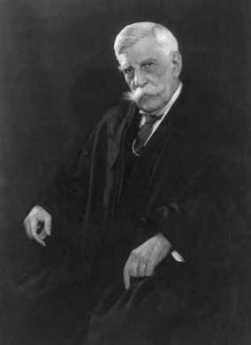
|
| Oliver Wendel Holmes Jr. |
Consider Connecticut's probable attitude toward all this. The colony was settled by Calvinist dissenters, so-called Roundheads for their surprisingly contemporary haircuts, adherents of General Cromwell, executioners of King Charles I during English Civil War. They gave Old Testament first names to their own children, and had always known they couldn't trust that licentious King. Giving their land away after he had promised it to them was just about what they always expected. When, after seventy years of growing families of fifteen to seventeen children, they discovered that Connecticut soil was merely a pile of pebbles left by the glaciers and covered with a thin layer of topsoil, they became even more convinced they had been cheated in the first place, and the bargain was no bargain. The reverse side of this enduring religious hatred will reappear in a few paragraphs.
The Proprietors of Pennsylvania, by this time no longer pacifist Quakers, but while descendants of William Penn, converted Anglicans and great friends with the King, took the matter calmly. The Connecticut lawyers were saying that if you sell or give away some land, it is no longer yours, so you can't give or sell it a second time. That is the modern view perhaps, but the English-speaking world was changing from a feudal, semi-nomadic, culture into a settled agricultural country where fixed boundaries were only starting to be important. That's where the world was going, but at the time King Charles gave away the land, it was far more important for the King to be able to reward successful underlings, and punish rebellious tribes, as the situation warranted. Ownership of land then seemed a nebulous thing at best, and the King was the best judge of how things should be divvied up.
Oliver Wendell Holmes introduced his book on The Common Law, by warning "The life of the law has not been logic, it has been experience." For life to go on and prosperity to endure, some decision must be made and held to, right or wrong. Stare decisis. That's of course fine for judges to say, but it must be observed that when people divide up on this question, where they stand depends heavily on where their ancestors stood on the English Civil War, and where their ancestors happened to be living during the so-called Pennamite Wars. As matters turned out, courts kept deciding in favor of Pennsylvania, and Connecticut kept bringing it up, again.
William Allen, Tory
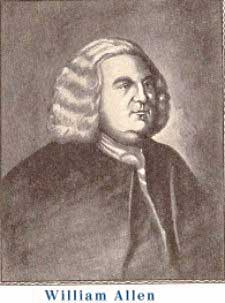
|
| William Allen |
William Allen was once famous for his expensive carriage and a team of horses, at a time when there were only eighty carriages in the colony. He was born wealthy but personally made considerable sums in maritime trade, which in those days included a mild form of piracy called privateering. Taking his accumulated wealth, he invested heavily in colonial real estate. His urban ventures included the land under Independence Hall, and his lands in the hinterland included the present town of Easton. He was a tough businessman, providing "muscle" where needed in a colony dominated by pacifist Quakers. At one point, he imported a thousand muskets and ammunition for the use of settlers in the Lehigh Valley who had difficulties with the Indians and Connecticut invaders. Allentown is named after him.
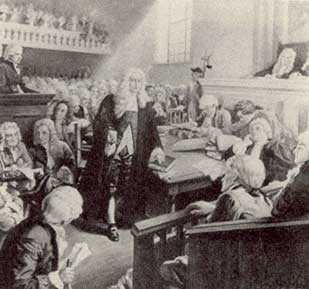
|
| Philadelphia Lawyer |
It is difficult to apply present standards of judgment to Allen. William Penn had been given the colony on condition that he protect and maintain it. That was clearly a difficult challenge for a Quaker colony in the wilderness, surrounded by Indians, French and Spanish buccaneers, and neighboring colonies who were far from pacifist themselves. The system often amounted to giving land to subcontractors like Allen, on condition that they maintain law and order. Furthermore, Allen was quite obviously a person of parts. His credentials as Chief Justice were based on his attendance at the Inns of Court when almost all other lawyers were trained by local apprenticeships. His father in law was Andrew Hamilton, the famous "Philadelphia lawyer" who won the landmark case for Peter Zenger and later became the leader of the Pennsylvania Assembly and mentor to young Benjamin Franklin. His land-dispute services in the negotiations with Lord Baltimore were notable. In general, he was a continuing force for peace and stability, and no one held it against him that peace and stability suited his needs as a landlord and merchant. To him, the battle for independence was just another unsettling disturbance which prevented the colony from achieving its potential.
His daughter married John Penn, the grandson of William Penn, who was the local representative of the Proprietors and later the Governor. All in all, it is not surprising that he retreated to his home on Germantown Avenue, called Mt. Airy, when the revolution broke out. Unlike many other Tories who fled to Canada, he felt his past services would protect him if he remained quiet and secluded until the war was over. He didn't quite make it, dying in his mansion, in 1780.
Articles of Confederation: Flaws
DURING the twenty-five years (1776-1801) government was in Philadelphia, Americans who had rebelled against tight royal rule uncovered many defects in its opposite -- a loose association of states. Loose associations only preserve fairness by operating with unanimous consent, which is, of course, unfair to a thwarted majority, unless a dissenting minority thwarts itself as a gesture of kindness. The Founding Fathers ultimately devised a formula of weakening power by dividing it into layers -- national, state, county, municipal -- and seeking to confine minority dissent to the weakest political unit. Persuasion and peer pressure were given time to work up the ladder of appeal to a wider, more powerful body of citizens. Bottom upward by choice; top-down only in desperation. Furthermore, persuasion first, force as last resort. An implicit third safety valve emerged: if a good idea is smothered by a local concentration of bigotry, appealing to a wider population includes being heard by more viewpoints. No one claims to have authored this whole prescription or foreseen its hidden benefits; it apparently evolved by trial and error. There was another latent discovery for America's sparse population in a hostile wilderness: maintaining harmony was more essential than efficiency. It would be hard to consolidate more Quakerly concepts of governance in one document. Not exactly assembled, it emerged and was admired. The local Quaker merchants were living proof that harmony made riches for anyone, while force only works against weaker people. George Washington the cavalier general came to Philadelphia and gave it a softly Virginian twist, over and over: Honesty is the best policy. It seems to have originated in one of Aesop's Fables.
 It is not necessary that the [Constitution] should be perfect; it is sufficient that [the Articles of Confederation are] more imperfect. 
|
| James Madison |
Recently examined documentation reveals James Madison, the main theoretician of the closed-door Constitutional Convention, to have been severely contemptuous of state legislatures at this time in his life, and rather severely defeated by John Dickinson in a political quarrel in mid-convention about the powers of small states. From this fragile evidence emerges the idea that in balancing the powers of state and national governments in the "federal" system, it may have been someone else's idea that the greater freedom to move out of an offending state into a more favorable one, would appreciably restrain state legislative abuses. Even with this feature built into the system with the national government to enforce it, Madison is said to have been in a state of depression that the Convention refused to agree to his idea of giving Congress veto power over state laws. It took some time for improved transportation to strengthen this competition between states, but it may not be an accident that Delaware now leads the way in responding to the implicit opportunity.
Philosophy and history are different. The Framers gradually acknowledged a patched charter of tribal allegiance was insufficient and thus adjusted to the idea of a central government. They tweaked a decentralized model of governance to get the states out of the road, without antagonizing them so much they would not ratify it. Although it is commonplace to say the Articles of Confederation were a weak failure, the Articles did reflect American attitudes at the beginning of our formative period. The Constitution would not have been acceptable if the Articles of Confederation had not first been given a trial. By the end of the 1787 Philadelphia negotiation, the nature of the final proposal was to define a few absolutely minimum powers for a national government, identify a few other powers as destructive when in the hands of any other level of government, and leave a vast undefined area: where new and novel problems would be tried out in the states, then passed to a national level if necessary. Anticipating constant mid-course corrections was an important objective for even a minimalist Constitution, not the least of those challenges was to create ways to keep it minimalist. Simplicity itself keeps it hard to change. Starting at the bottom of the layers of government continues to this day to introduce new and unexpected problems to the "laboratory of the states" or even lower, working upward only as proven necessary, or spread nationally only after the solution is highly successful. It is a legacy of slavery, the Civil War, and direct election of Senators (Amendment XVII) that many Americans still fail to welcome the merits of this approach, or lack the patience to try it for their pet ideas. Considering the Articles of Confederation and the Constitution as two documents with continuous goals, we got it right, the second time.
And we got it right in the environment of Eighteenth-century Quaker Philadelphia, where a tolerant examination of new ideas was more venerated than in any other place in the civilized world. With a combination of wisdom and impasse, minor issues were left to the future. It is true this sometimes creates problems of neglect. But it makes it possible to define those few issues which must never change. An unexpected virtue of minimalism surfaced eighty years later: many men understood it well enough to die for it.
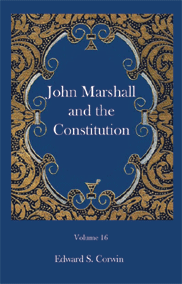
|
|
Edwin Corwin's "John Marshall and the Constitution" |
Much has been written about the separation and balance of powers between the three branches of the federal government. However, the real balance of power in the Constitution in 1787 was vertical, between the central government and the constituent states. Balancing power horizontally, within the central government's branches, is a way of preventing one side of this other argument from tilting the state/federal balance in its own favor, or slowing down the effect of any victories by one side. In other words, it preserved citizen liberty to choose. From this continuing two-dimensional struggle emerges the explanation for filibusters, the seniority system, the confirmation process for Supreme Court and Cabinet appointments. It also calls into question the Seventeenth Amendment, where the state legislatures lost the power to appoint U.S. Senators. In 1786 the states had all the power, in 2009 state power is much diminished; but it is not entirely gone by any means. It is true the cry for states rights, essentially an appeal to the Deity for Justice is futile. If states are to wrest power back from the federal government, it will be by the adroit exercise of powers buried within the balanced powers of the federal branches, but it can succeed if the public ever wants it to succeed. The Framers seem to have overlooked the possibility that federal power could someday outgrow its blood supply, simply growing too big to manage. It is also true the Framers neglected the possibility of a protracted period of disagreement between two halves of the electorate. At least in these particulars, there is room for the further evolution of the Constitutional principle.
While features of the present Constitution can sometimes be linked to the correction of flaws in the Articles, one by one amendment never seemed to be quite enough. Subsequent analysis of Original Intent has often had to contend with the unspoken intent of earlier negotiators to strengthen partisan advantage in later struggles. The political battles being fought at the beginning, which except for slavery are substantially the same today, were sometimes being promoted for reasons which now seem merely quaint. Fine, everyone can agree it was complex. Still, there was a recurring uneasiness: what was the underlying flaw in the Articles? What, as they say, is the take-home point?
One widely accepted summary, probably a correct one, of what was centrally wrong with the Articles of Confederation, lies in a concise observation, which follows, from Edward S. Corwin's book John Marshall and the Constitution:
"The vital defect of the system of government provided by the soon obsolete Articles of Confederation lay in the fact that it operated not upon the individual citizens of the United States but upon the States in their corporate capacities. As a consequence, the prescribed duties of any law passed by Congress in pursuance of powers derived from the Articles of Confederation could not be enforced."
And that's how many Revolutionary Americans, possibly most of them, had wanted to have it. They were in revolt against all strong government, not just the King of England. They surely would have applauded Lord Acton's declaration that "All power tends to corrupt, and absolute power corrupts absolutely." Thirteen years of near-anarchy taught them they must at least give some limited powers to a central government, but it was to be no more than absolutely necessary. For some, the Ulster Scots, in particular, even the absolutely minimum amount was still just a bit too much. In effect, these objectors wanted a democracy, not a republic.
To deconstruct Professor Corwin's analysis somewhat, the equality-driven followers of Thomas Jefferson believed the insurmountable obstacle for uniting sovereign states is that they are sovereign, and won't give it up. The merit-driven followers of Alexander Hamilton, Robert Morris, and George Washington bitterly resisted; in business and in war you need the best leaders to rise to power. The function of common men is to select the best among themselves to be leaders. Only James Madison seems to have grasped that ideal government might tend more toward a republic for purposes of the enumerated federal powers plus enumerated powers specifically denied to the states. For lesser issues, perhaps a purer democracy would be just as workable. However, in operation, it took scarcely a year to discover that the common man would not automatically select the best man he knew to be his representative. In fact, there exists a considerable populist sentiment, that wealth and success outside government are actually disqualifications for office. To some extent, this reverse social Darwinism is grounded in an unwillingness of the upper class to serve in government, perhaps because service to the country interferes with the lifestyle of unrestrained power and wealth which other occupations allow, but is forbidden to public servants. In any event, we persist in the fruitless argument whether America is a democracy or a republic; it was designed to be a mixture of both. Within the time of the first presidency, the unattractive realities of mixing human nature with elective politics transformed the meanings of the Constitutional document to something that was never written there, and other nations have largely failed to grasp. It apparently also worked a major transformation in its main author. James Madison first quarreled with his ally, Alexander Hamilton, and joined forces with the Constitution-doubter Thomas Jefferson. His mentor and idol, George Washington, essentially never spoke to him again.
---------------------------------------------------------------------------------------------------------------
States rights no longer confronts America directly, because the Founding Fathers managed to get around it until the Civil War, and then the Fourteenth Amendment enabled the federal judiciary to attenuate state sovereignty somewhat further without eliminating the architecture of a federation of states. In other words, in two main steps we deprived the states of some sovereignty, but no more than absolutely necessary, and we took more than a century to do it. The European Union currently faces the same obstacle; this is how we solved it. If they can get the same result in some other peaceful way, good luck to them. Our framers used the language "Congress may...or Congress may not..." They only dared to strip state legislature of a few powers because they needed the legislatures to ratify the Constitution, a gun you can only fire once. Thus, they forbade states the right to issue paper money, the power to interfere in private contracts, and such, as enumerated in Article I, Section X, where the operative phrase is "The states are forbidden to..". The framers were willing to strip the unformed Congress of many more specific powers than the all-too-existing states; the Constitution can be read as a proclamation of the powers which any central government simply must possess. There might be other desirable powers, but here is the minimum. After eighty years, individual Southern states asserted their unlimited powers extended to nullification and secession, and because of a perceived need to preserve slavery would not back down. The Constitutional consequence of this national tragedy was the Due Process section of the Fourteenth Amendment, which has since been purported by the Supreme Court to mean that whatever the federal government may not do, the states may not do, either. However, Due Process traces back to the Magna Carta and has been so tormented by an interpretation that for the purpose stated, it is growing somewhat too elusive to remain useful. For historical reasons, we never gave a fair trial to the original proposal to address the federal/state dilemma. The Constitutional Convention was held in confidence, many delegates changed their minds along the way, and many ideas were more perceived than enunciated. It is plausible that the original strategy originated with Madison's teachers and emerged from many discussions, but there were several delegates in attendance with the sophistication to originate it. In a convention of egotists, there were even a few who would put their ideas in someone else's mouth.
The concept of how to curtail power in a non-violent way, can be called Regulatory Competition. Mitt Romney seemingly plans to promote the idea as a central feature of his political run for President of the United States, using a variant he has developed with Glenn Hubbard, the Dean of the Columbia University School of Business. The idea does still work reasonably well with state taxes and corporate regulation. If a state raises a tax, estate tax for example, in a burdensome way, people will flee to a state with more reasonable taxation. Corporations have learned how to shift legal headquarters to Delaware and other states which court them, and in really desperate cases will move factories or whole businesses. There is little doubt this discipline is effective, and little doubt that some cities and states have been punished severely for encouraging an anti-business environment. Whether the Fourteenth Amendment could be cleverly amended to expand this competitive effect without reintroducing segregation or the like, has not been seriously considered, but perhaps it should be. There are however not too many alternatives to consider.
As far as advising our European friends is concerned, it would be important to point out that the original version of Regulatory Competition completely depends for its effectiveness on the freedom to flee to some other state within the union. A common language is a big help to unity, but the ability to move residence is essential, so for practical purposes, both a common language and freedom of migration are required. Underlying such concessions is a sense of tolerance of cultural differences. That is unfortunately where most such proposed unions have either resorted to violence or failed to unite. And of course, the power which might otherwise be abused must then be shifted from the federal, back to a state level. What surfaces is a sort of one-way street? It remains far easier to devolve into little statelets than to unite for the benefits of scale. A working majority under the likes of Thomas Jefferson might have been assembled in the Nineteenth century but was held back by coping with the expanding frontier. During the Twentieth century, it would have been held back by the need to deal with world power. The Second Tea Party seems to have some inclination along these lines, but it remains to be seen whether some overwhelming need for world power will once more overcome the obvious national ambivalence about it.
The revised proposal for the regulatory competition takes the proposal to a different level, possibly a more workable one. Workers in the United States can freely move from one state to another but are restrained by national laws from equally free movement between nations. Removing that barrier makes the European Union attractive, although it inflames local nationalism. Since it seems more palatable to allow the currency to move, perhaps a little tinkering would be sufficient to permit uniform monetary rules to be the hammer which forces nations into permitting free trade on a global scale. The people themselves can remain at home in their national costumes, perhaps perfecting their religions in more churches and language skills in more schools. Meanwhile, the insight of Adam Smith would prevail for the long-term prosperity of everyone. Each party in a transaction feels enriched by it, the seller preferring to have the money, and the buyer preferring to own the goods. Multiplied a trillion-fold, these improvements in everyone's condition result in the steady enrichment of all.
Perpetual?
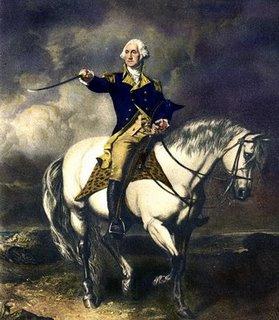
|
|
George Washington Was he the 11th President of the United States? |
We must be indebted to Stanley L. Klos for his recent book called President Who? in which he makes a persuasive case that George Washington was actually the eleventh President of the United States, there have been ten previous Presidents under the Articles of Confederation. The awkward fact that the Articles were not ratified until 1781, is a different sort of issue which possibly helps explain some of the confusion.
In general, the attitude had been that the ten previous Presidents had merely been the presiding officers of Congress, holding an office we might now call Speaker. Indeed, the President under the Constitution doesn't "preside" over anything definable, although the Vice-president clearly presides over the Senate, at least on the infrequent occasions when he is in the room. All of this would seem to be nit-picking wordplay by history hobbyists, except for one thing.
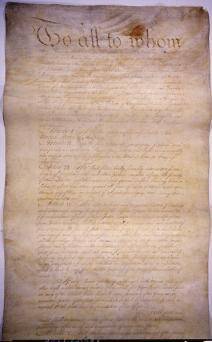
|
|
Lincoln raised the issue whether states who ratified the Articles of Confederation, among other documents, were bound in perpetuity to be members of the United States. |
Abraham Lincoln was having a hard time finding a reason to challenge South Carolina's right to secede, which was later depicted by the state as simply revoking its previous ratification of the Constitution in 1789. If they could join the Union, they could un-join the Union, so, Goodbye.
Not so, said Lincoln. When South Carolina ratified the Articles of Confederation in 1778, those Articles clearly stated the Union was to be perpetual, or at least the Articles uniting the colonies were to be so. Articles of Confederation: Article XIII. Every State shall abide by the determination of the United States in Congress assembled, on all questions which by this confederation are submitted to them. And the Articles of this Confederation shall be inviolably observed by every State, and the Union shall be perpetual; nor shall any alteration at any time hereafter be made in any of them; unless such alteration be agreed to in a Congress of the United States, and be afterward confirmed by the legislatures of every State. That sounds pretty perpetual to most readers, making the Constitution merely a clarification of details, or at most an amendment to the Articles of Confederation. There is a strong implication that the intent of Article XIII was to prevent individual states from making a separate peace with Great Britain, or Britain from claiming conquered territory was no longer American.There's no doubt the Articles do say perpetual and no doubt South Carolina signed them. However, it is equally certain that Alabama, Arkansas, Louisiana, Mississippi, and Texas did not sign the Articles. Six hundred thousand casualties later, this fine legal dispute was settled in Lincoln's favor, but not before the Gettysburg Address further muddled Constitutional Law by proposing in effect that the Declaration of Independence formed the basis for the Constitution. However, a speech at a ceremony hardly qualifies as a national ratification, and the Gettysburg Address did not achieve much acclaim for several more decades, suggesting later politicians were doing some special pleading, To include either the Declaration or the Gettysburg Address in a discussion of Constitutional intent is to ignore a lot of contemporary history. Many of the clauses and even some of the wording of the Constitution is taken directly from the Articles to the Constitution, whereas the claim tracing origin in the Declaration of Independence is based on the conflict between the two in the "All men are created equal" versus the later assignment in the Constitution of only 3/5 of a vote for slaves. The party of Thomas Jefferson can only make the claim that the Declaration made an assertion which was later overturned by the Constitution, only to be reversed again by the Civil War and the Fourteenth Amendment. Only the Articles and the Constitution itself can claim to have been intended as a system of governance, with at least some attempt made to obtain general ratification, followed by long periods of conforming to them, to display even stronger ratification. It may be humanitarian, but it is not good history to assert that a Declaration is Law.
So now Philadelphia has two large, competing, institutions at either end of a long grassy Mall on Sixth Street, Chestnut to Vine. Each has a paid staff, busily organizing new points of view in competition for legal authority as well as visitors. One really must wish that Lincoln had found some other legal theory to justify military action. The Articles of Confederation, which were anyway not fully ratified until 1781, established a military alliance of thirteen otherwise fairly autonomous states. The Constitution, beginning with the words We, the People, created a nation of citizens, in 1788.
There's quite a difference, and the second was emphatically based on dissatisfaction with the first. It thus is a favorite theme for those who argue for a "living" Constitution, in which any change at all is legitimate if enough people clamor for it. My own view of this, if anyone cares, is that our Union is the only example in history where a number of viable sovereign states voluntarily and permanently surrendered their powers to become a "more perfect union". Many others have tried to do the same, starting with the French Revolution and continuing with the United Nations and the European Union. So far, every other attempt has been a failure. So I am very reluctant to see us tinker with the Constitution because the invisible balances are so subtle and largely unspoken. It may not be perfect, but so far it is unique in being the only one that seems to work. Such pious worship of a mystery seems to offend a lot of people, so let's get a little more pointed.
The greatest enemy of the Constitution at the time it was formed was Thomas Jefferson, the Ambassador to France at the time of the French Revolution, which he much admired. Jefferson was reluctant to confront George Washington, so his resistance to the Constitution was circumspect. However, he formed a political party with the main principle of opposing strong central government. One of the activities of his party was to start to celebrate July 4 as a National holiday and to downgrade the importance of Washington's birthday as one. There can be little doubt that Washington's birthday has been dropped from the national calendar and replaced by President's Day, while the celebration of July 4 continues to be an occasion for speeches and fireworks. John Adams engaged in a long correspondence with Jefferson after both had stepped down from the Presidency. While the two made their peace with each other on many subjects, Adams never forgave this celebration of the Declaration as a sacred text, when in fact he believed it had little to do with history and was outspoken in his scorn for its importance. One can only imagine the apoplectic speech Adams would give today if he could come alive and comment on the dilution of Washington's birthday with Lincoln's, diminishing the memory of both. And as for his scorn for dating the beginning of the Revolution to July 4, 1776, when in fact fighting had been going on at Lexington, Concord, Bunker Hill and other places for years, well. If it comes to a battle of documents, a respectable case can be made that the beginning of the Revolutionary War was in December, 1775 when the British Parliament passed the Prohibitory Act, effectively declaring war on the rebellious colonies, meanwhile dispatching a war fleet of several hundred ships to America to subdue us.
John Dickinson, Quaker Hamlet
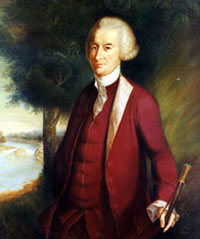
|
| John Dickinson |
John Dickinson (1732-1808) would probably be better known if his abilities were less complex and numerous. It would have been particularly helpful if he had consistently remained on only one side of the important issues of his day. Born in a Quaker family and buried in a Quaker graveyard, he was for years a notable Episcopalian and soldier. He outwitted John Penn, the Pennsylvania Proprietor who was trying to keep Pennsylvania from sending representatives to the Continental Congress, by having the Pennsylvania representatives hold a meeting in the same small room of Carpenters Hall at the same time as the Congress. But he ultimately refused to sign the Declaration of Independence. Although he was the main author of the Articles of Confederation, the Constitution which replaced it would not have been ratified without his idea of a bicameral Congress. Although he was Governor of Pennsylvania, he was also Governor of Delaware, has been the central figure in the separation of the two states. In fact, for fifteen years he was a member of the Legislature of both states. Dickinson seems in retrospect to have been on every side of every argument, but he was immensely respected in his time.
Two events seem to have been central in the organization of his life. The first was his education as a lawyer. At that time and for a century afterward, lawyers were trained by apprenticeship. Dickinson, however, studied in London at the Inns of Court for four years and was by far the most distinguished lawyer in North America for the rest of his life. Furthermore, he absorbed the principles of the Magna Carta and the approaches of Francis Bacon so thoroughly that he never quite got over his pride in his English heritage. Throughout his leadership of the colonial rebellion, he acted as a better Englishman than the English themselves. His demand was for American representation in the British Parliament, not independence from England. It would not be hard to imagine Dickinson standing before a firing squad, gritting the words of St. Paul, Civis Romani Sum.
His other pivotal experience was the Battle of Brandywine. Dickinson had been the organizer or chairman of the two main Pennsylvania military organizations, the Pennsylvania Committee of Safety and Defense, and the so-called Associators (today's 111th Infantry, the first battalion of troops in Philadelphia). Both of these particular names were a characteristic gesture to conciliating pacifist Quaker feelings. Nevertheless, when Dickinson refused to sign the Declaration, he did temporarily become so unpopular he resigned his military commands. A few months later, when General Howe landed at Elkton at the narrow neck of the Delmarva peninsula, Dickinson enlisted as a common soldier to defend the southern perimeter of the defense line Washington had hastily thrown up to defend Philadelphia. Shortly afterward, Dickinson's friend and neighbor Caesar Rodney made him a Brigadier General in charge of the garrison around Elizabeth New Jersey, but the Battle of Brandywine taught an important lesson. Little states like Delaware and Maryland could not possibly defend themselves witho
A Pennsylvania Farmer in Delaware
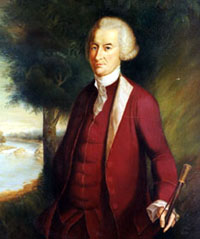
|
| John Dickinson |
It is difficult to have a coherent view of the mind of John Dickinson. Seriously offended by the Townshend Acts, he rightly perceived them to be the work of a few malignant personalities in British high places who would mostly soon be replaced. Later on, he refused to be troubled by the inconsequential Tea Act, which he appraised as a face-saving gesture of reconciliation, but more recent historical information demonstrates was more likely aimed at avoiding an unrelated vote of no-confidence in Parliament. Unfortunately, Dickinson was too remote from these events and additionally could not comprehend reckless hotheads among his own neighbors. Reckless hotheads in turn seldom comprehend the measured meekness of Quakers. In any event, although Dickinson played a major role in the Declaration of Independence, he refused to sign it when the time came, evidently sensing an opportunity to separate the three lower counties from Pennsylvania and its Proprietors. A few months later when the British actually invaded the new State of Delaware on the way to capturing Philadelphia by way of Chesapeake Bay, Dickinson enlisted as a common soldier and fought at the Battle of Brandywine. Obviously, he was seriously conflicted.

|
| John Dickinson's Farmhouse |
Dickinson had become internationally famous for twelve letters he had meant to publish anonymously. The Letters From a Pennsylvania Farmer were written about 1768 out of resistance to the Townshend Acts. Because the three counties which were to become the State of Delaware were then still part of Pennsylvania, many school children have become understandably confused about the actual location of the man who became governor of both states, simultaneously.
The causes of the separation of the two colonies are still a little vague. Delaware schoolchildren are taught the two states separated, but often report they didn't retain much information about why it happened. The Dutch and Swedes who originally settled southern Delaware were not sympathetic with Quaker rule, which could be seen as a reaction to their living here for generations as Dutchmen before William Penn arrived, but then saw the colony sold out from under them. As a further conjecture, there might have been friction with the Quakers over slavery, similar to the hostility of other Dutch settlers in northern New Jersey when William Penn purchased that area. This pro-slavery attitude resurfaced in both areas during the Civil War. One alternative theory which has considerable currency in Delaware is local dissension about Quaker pacifism during the Revolutionary War. On a recent visit to Dickinson's home outside Dover, a school teacher was overheard to instruct his flock that the Dutch Delawarians wanted to fight the British King, but the Quakers wouldn't give them guns. "We value peace above our own safety," was the unsatisfying response they received from the Pennsylvania Assembly. But that line of reasoning bumps up against Dickinson's role in local affairs, his ambiguity over the Declaration, and his vacillation in warfare. One would suppose the simultaneous Governor of both states would play a major role in the separation of the two.

|
| over Air Force Base |
Dickinson's plantation, quite elaborately restored and displayed, is tucked behind the Dover Air Force Base. Perhaps all that aircraft noise will discourage sub-development in the area of Dickinson's plantation and the rural atmosphere may persist for years. At the time of the Cuban missile crisis, your correspondent happened to be driving past, observing the sky filled with bombers, just circling and circling until the diplomats settled matters. Since eight-engine bombers are seldom seen around Dover, it has always been my presumption that they came from elsewhere to be refueled at Dover; but that's just a presumption. One of the pilots later told me he was carrying nuclear "eggs" and was completely prepared to take a long trip to deliver them.
To get back to Dickinson's wavering about the Declaration, maybe there was a good reason to waver. Joseph J. Ellis (in His Excellency, George Washington) relates that after the devastating British defeat at the Battle of Saratoga, Lord North made an offer to settle the war on American terms. In a proposal patterned after the concepts of the separatists in Ireland, America could have its own parliament as long as it maintained trade relationships with England. As an opening offer, that comes pretty close to what the colonists had been demanding. Governor Morris was active in disdaining this offer, although it is unclear whether he was acting alone or as the agent of others. The offer came too late to be accepted, but it might have shortened the war by six years, and we might now have a picture of the Queen on our postage stamps.
REFERENCES
| His Excellency: George Washington: Joseph J. Ellis: ISBN-13: 978-1400032532 | Amazon |
| Letters From A Farmer In Pennsylvania To The Inhabitants Of The British Colonies (1903): John Dickinson: ISBN-13: 978-1163969533 | Amazon |
Pennsylvania Prison Society

|
| Duke of York |
William Penn, who spent considerable time in British prisons, established a penal code for his new colony which largely swept away the draconian punishments established by the code of the Duke of York. Until as late as 1780, jails were mainly confinement hotels for debtors, prisoners awaiting trial, and witnesses. For actual punishment, the methods were execution and flogging. Penn's Code for Pennsylvania restricted execution to the crime of murder, and flogging to sexual offenses; everything else was punished by fines and imprisonment. Hidden in this code, of course, was the need to invent and construct prisons to service the imprisonment. It would take over a century to address this need, and Philadelphia still has not completely caught up with the need for more prison cells. Without a prison system, the Penn code was impractical, and the colonial penal code retrogressed toward floggings, pillories, and hangings after Penn's death.
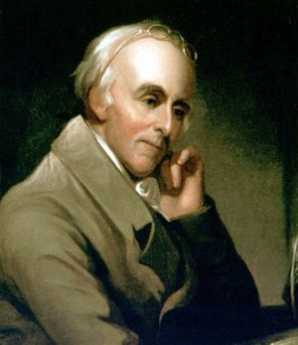
|
| Dr. Benjamin Rush |
In colonial Philadelphia, the main prison was on Walnut Street, with sixteen cells. A neighboring Quaker, Richard Wistar, started a soup kitchen in his own home, taking the soup over to prisoners. By 1773, he had established the Pennsylvania Society for Assisting Distressed Prisoners, which was unfortunately disbanded by the occupying British Army in 1777. In 1783, Dr. Benjamin Rush with the assistance of Benjamin Franklin, Bishop White, and the Vaux family, founded the Philadelphia Society for Alleviating the Miseries of Public Prisons, which after a century changed its name to the Pennsylvania Prison Society. The Prison Society believes it is the oldest continuous non-profit society in America.

|
| Eastern State Penitentiary |
The Prison Society has had several major changes in direction. The original concept was to substitute public labor for imprisonment, a less costly arrangement than imprisonment while avoiding a return to floggings and dismemberment. However, the degrading sight of prisoners in chain gangs caused a public outcry, and the approach was abandoned. In the spirit of the French and American revolutions, loss of liberty was seen as the greatest punishment conceivable. Added to this was the Quaker concept of inspiring remorse through silent meditation, and the eventual outcome was the construction of the Eastern State Penitentiary on what was then called Cherry Hill. In 1823, it was ominous that Eastern State Penitentiary was the largest structure in America. Although the concept was widely admired and imitated, the prolix Charles Dickens took a violent dislike to the idea of never talking to anyone, and led a reversion away from penitentiaries back to simple prisons. In the days before Alzheimers and schizophrenia were well characterized, the spectacle of massive recidivism was added to the rumor that protracted solitude led to insanity.

|
| Catherine Wise |
From Catherine Wise the Communications Director of the Pennsylvania Prison Society, the Right Angle Club recently learned that the current evolution of the American penal system has led to a steady state, but a troubled one. There are 2.2 million inmates in American prisons today, more than any other nation including Russia and China. Of these, 75,000 are confined in Pennsylvania, 9,000 in Philadelphia. Recidivism is 67%, the cost is $31,000 per year per inmate, the majority of inmates have been involved with illicit drugs, a growing number are infected with HIV and Hepatitis C, mental illness runs around 20%. The cost of incarceration is growing faster than the cost of either education or healthcare for the community. Prison overcrowding is extremely serious, the programs for managing parole and integration back into society are weak and underfunded. Eighty percent of the inmates are non-white, most prisons are located in remote regions too far for easy visiting, medical care in prison would not seem at all acceptable in general society. The Prison Society has no difficulty finding projects which are urgently needed. Just for an example, take the peculiar prison statistics; it really seems improbable that only 9,000 of the 75,000 Pennsylvania prisoners are in Philadelphia. Then reflect, NIMBY, that no one wants a prison or its visitors near his home, except areas of rural poverty welcome the employment a prison brings. Reflect for a moment that "jails" are paid for by local county taxes and contain prisoners with less than two years to serve. "Prisons" are paid for with state taxes, and contain those sentenced to longer than two years. Finally, add the fact that nonvoting Philadelphia prisoners in rural prisons are counted by the census as residents of the rural area for the purpose of distributing legislative and congressional seats. The rural politicians love the system, the urban neighbors love to be rid of the prison environment, but the prisoner families can't visit the prisoner. Who cares? Who even notices?
During the first World War, Quaker interest in prison matters was greatly stimulated by the imprisonment of many Quaker conscientious objectors to the wartime draft; since that time prison conditions have again become a central interest of the religion. It's hard to prove but is confidently asserted, that violence and mistreatment of prisoners are appreciably less in Pennsylvania than the rest of the country, California for example. In any event, The Pennsylvania Prison Society is a particularly effective advocate for humane treatment because of credibility achieved over two centuries, with newspaper editors on its board, and sympathetic affiliations with the legislative judicial committees. It knows what it is talking about, as a result of over 5000 annual prison visitations, and it has served the prison administrative corps by performing volunteer work, accepting contracts for parole projects, arranging bus trips for prisoner families to remote prisons, and working for improved funding for prisons. At the moment, there are six highly imaginative bills before the Pennsylvania Legislature, devised and researched by this outside organization with credibility, and political clout. Although the Society takes an occasional contract for a project, it is itself entirely funded by outside contributions, and because of occasional adversarial situations, asks for no funds from the state. Even the contract funds have been questioned, and are only accepted when the working relationships fostered are more useful for the prisoner clients than any co-option which might result.
One final word about medical care in prison. It's not as good as medical care for non-prisoners, and unfortunately it probably never can be. The remote rural location of prisons makes it difficult to obtain physicians and nurses, regardless of wage levels. It's dangerous to be around prisoners, as any guard will tell you, and it's more dangerous to be in control of narcotics amidst a population of addicted convicts. Malingering is nearly universal, both to obtain desired drugs and to spend "easy time" in the infirmary. Many prison escapes are engineered around the necessarily weakened security of the medical system. The prison budgeting system has all the rigidity and weaknesses of any governmental medical system, and in this case, it's run far out of sight of the public. Even the bureaucrats in charge are victimized by other bureaucrats. The average duration of incarceration in Pennsylvania is longer than in most other states; the prisons have to keep mental patients because the mental hospitals have all been closed. Fifty years ago, when there was no place to put a non-criminal with tuberculosis, he was put in jail. The parole system is underfunded, there is not nearly enough community support to absorb ex-con. Behind all this is a shortage of prison facilities. The legislature has got itself into a position that if it moved more prisoners into the outside, more prisoners would just fill the vacancies, costs would go up, and things wouldn't look much better. Only after the backlogs have been absorbed, would there be much visible effect.
Parliamentary Procedure (1)
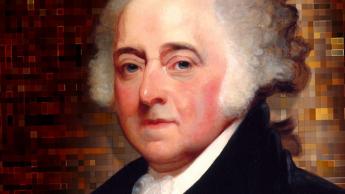
|
| John Adams |
The Constitution provides that the Vice President of the United States shall be the presiding officer of the Senate. Accordingly, during the Presidency of John Adams, from 1797 to 1801, Thomas Jefferson was the presiding officer of the U.S. Senate, down at 6th and Chestnut Streets. According to recent books by Ellis, McCullough and others, it must have been an exciting experience to preside over that particular Senate.
Just what was running through Jefferson's mind during that formative time of Senate procedure is largely left to conjecture. We hear it said that Senate debate was rambling, raucous, and sometimes physical. Since Jefferson himself was the most controversial person in the room, his rulings from the chair may well have been resisted. In any event, Jefferson proceeded to publish the first American Manual of Parliamentary Practice,

|
| Thomas Jefferson |
patterned after the rules of procedure of the British parliament. An uncut copy of this book is still on the shelves of the Philadelphia Atheneum, a block away. Its contents can be summarized as sensible elaborations of two basic rules: the deliberative body only takes up one topic at a time (discussion of anything which wanders from that topic is ruled non-germane), and the rights of the minority are to be respected. Since America had just concluded an eight-year war with England, it is a little surprising that the behavior of the English Parliament would be considered something to imitate, and by Thomas Jefferson, of all people. It is vital for any deliberative body to have a set of rules, agreed in advance, about how to conduct debate and reach a conclusion. Controversy can get pretty heated at times, and it is then too late to be making rules which might favor one side or the other. Establishing rules in advance is if anything more important than what those rules say. Jefferson was thus quite right in publishing such rules, with the intention that the first act of any newly elected group would be to adopt the rules in the book as the agreed standard for whatever happens to come up later. The uncut version at the Atheneum is symbolic; you don't have to keep discussing procedure if the procedure is agreed.
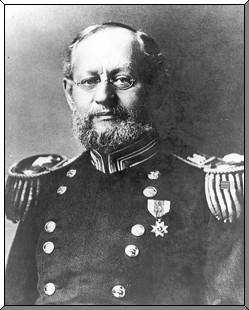
|
| General Henry M. Robert |
General Henry M. Robert wrote a revised version of Jefferson's rules in 1876, familiarly known as Robert's Rules of Order, which now govern the U.S. Congress. The main difference was to accommodate the creation of expert committees--on Ways and Means (taxes), Foreign Relations, health, etc, as the business of Congress grew more complex, and Congress met for longer and longer periods of time. Roberts Rules have thus become a special-purpose rule-book, and bodies like the American Medical Association or the American Bar Association, which meet for short periods yearly, find it more appropriate to substitute the use of "reference" committees. A reference committee is sort of a jury, intended to be a representative sample of the larger body, which is selected by the presiding officer to sort out a large amount of business and facilitate debate by the larger group as a whole. A reference committee system is better addressed by rules of order written by Mrs. Sturgis or Dr. Davis, than the more famous one by General Robert.
Underlying these seemingly dry technical issues is the struggle of an overburdened large group

|
| AMA |
to learn what its own collective opinion is, and to see that it is properly stated. As the agenda grows, it is necessary to designate smaller reference committees to hear testimony and present it fairly to the full convention when it assembles later. The referenced committee makes recommendations, but the full body reserves the decision to itself. In this way, the American Medical Association can make several hundred complex decisions in a week, almost universally recognized as representing the current opinion of the whole Association. Every few years, a decision is reversed, but remarkably seldom .
Eventually, a complex agenda grows to the size where a deliberative body must delegate a certain amount of power to experts, and the
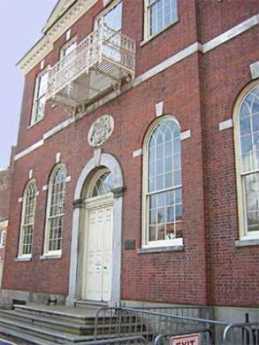
|
| U.S. Congress |
U.S. Congress is well past that point already. It must consider an average of 25,000 bills per session. The typical state legislature considers an average of 10,000 bills; without a set of rules, nothing can be accomplished within such an overburdened agenda. No one surrenders power easily, and Congressmen are correct to insist that a republic elects the specific people it wants to see making the decisions, and lets them organize their own process. Therefore, General Robert describes the intentionally obscure rules which have evolved to govern the delegation by the elected members, of specific matters to specific committees of its own members. To put it bluntly, some handsome extrovert who happens to have got himself elected to Congress can be assigned to some unfamiliar topic and expected to learn what it is all about, with his power constrained until he does. Rule by seniority makes a lot of sense in such a situation, although obviously, some learn faster than others. Accordingly, the deliberative body must have rules which assist the process of weeding out chairmen who acquire seniority faster than they acquire expertise, while at the same time sympathizing with the difficulties all members regularly experience, publicly thrust into unfamiliar topics. Most smaller deliberative bodies do not need the rules which Robert's have evolved to manage seniority difficulties without opening the gates to ruthless power manipulators, unfortunately, but commonly an over-represented group in politics.
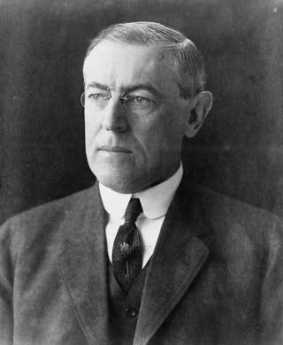
|
| Woodrow Wilson |
made himself a student of these arcane matters, and approved of the idea that, "Congress in Committee, is Congress at work" In recent decades, he would surely have been upset to see the degree to which the power of unelected experts has grown, at the expense of the power of home-made experts who none the less have been elected to exercise power in a general sense. The elected but amateur experts are in a constant struggle with experts provided by special- interest lobbyists, and experts in the bureaucracy who are provided by politicians in the executive branch. Lately, the executive branch is winning, and Congress had better look to its rules.
In this way, we begin to see how Parliamentary rules are different from Parliamentary procedure, although each influences the other. Parliamentary procedure is now a highly stylized, fast-moving game, greatly enjoyed by practiced players. Quick shots are applauded, and bumbling by presiding officers provokes instant indignation. Failure to call for votes in the negative was outlawed in 1604, there's no excuse for doing it this afternoon. Failure to call for debate of a proposal is an oversight too gauche to endure. Raucous "calling for the question" is as rude a form of behavior as taking off your shoe and pounding it on the table. Don't expect to get anywhere if you do things like this within an experienced group of players.
Now, modifying Parliamentary rules is something else. Changing or deliberately violating the rules of an organization is something only experts attempt, and usually with evil intent. Politicians sometimes can't be trusted with their own rules. The citizenry will be very sorry if, at a bare minimum, at least members of newsmedia editorial boards don't get more sophisticated about parliamentary rules, instantly sensing that something is up when someone wants to "modernize" them. The most egregious proposals of all are the ones which blandly propose to "bring the rules into conformity with current practice." Reflecting on such purring argument for a moment, it emerges that someone has been violating the rules for some time, and wishes to be condoned for it.
In one very important respect, Parliamentary procedure is accidentally mismatched to our legislative system. We elect a President or a Governor or a Mayor for a set period of time, and only remove him from office for egregious misbehavior, and in the case of Presidents only once in our history. In a Parliamentary system of government, by contrast, every Prime Minister expects to be removed by a vote of lack of confidence, which is a possibility every single day he is in office. The strategy of springing a trap could well underlie every proposal or budget measure; every move by the opposition could turn out to be a move in a chess game whose goal is to overturn the government. Consequently, Parliamentary debates are remarkably snide and uncivil in a Parliamentary system; no one dares to give an inch. In the American system, disorderly and mean-spirited remarks by the opposition are simply a nuisance, best ignored by the party in control. After two hundred years, our own legislative bodies have been slipping back a little into the savage reckless language heard in Parliaments abroad. Since the most important unwritten word in the Constitution is "compromise", one looks forward to the day when the voting public inflicts an unmistakable punishment for legislative intransigence. As Winston Churchill once growled, it's "Half foreign, and thoroughly reprehensible."
Parliamentary procedure(2)

|
| Cartoon Fight |
Although Parliamentary procedure started out as a way of reducing the number of cracked skulls in an angry group of arguing ruffians, it mainly did so by demonstrating how much more you get done, when you argue courteously. It really does work better if you have more logic on your side. Orderly, a courteous procedure is best. Furthermore, one topic at a time is also best, achieved only if the guys with other topics are confident the group will eventually get to their topic in its turn. And if you know the referee is neutral, will not allow a vote to be taken as long as someone still wants to speak. Or when the group is tired of the argument, it still can't quit until both sides have been heard, and the negative votes have been called for and counted. What emerges from these simple rules is an amazing discovery of the collective will of the whole group. If a large group of strangers convenes to discuss a topic, following these rules it is seldom that any doubt emerges of the collective opinion of the group. Right or wrong, the opinion of the group.

|
| Shareholders |
So if you want to determine what the medical profession thinks about abortion, or what the legal profession thinks about trial by jury, or what a whole nation thinks about going to war -- just choose representatives fairly, and let them conduct discussions according to Parliamentary Procedure. That's a democracy; that's a republic. That's a system many people have died to preserve.
However, during the 19th Century a different type of organization, the corporation, appeared. It gets things done, it makes prosperity, it is successful. But it has never adequately achieved a credible system for determining its own wishes. If every shareholder held one share and elected representatives democratically, the meetings of shareholders and directors might become little republics. But shareholders negotiate the price of their shares by bidding, and some people acquire many shares. If one person collects 51%of the shares, there is no further room for parliamentary dispute; the opinion of a majority of the shareholders is the opinion of one person. Because a corporation is a creation of government, it mirrors the process of government within what is called "corporate governance". We tend to follow the outward forms of parliamentary process even when in fact there is no substance to them. We thus can observe the amusing farce of the well dressed, well-mannered majority owner of a corporation -- smilingly and courteously listening to an angry shareholder with only one share, sometimes rising from the audience with a bull horn. Shout all you please, the man with the three-piece suit is going to have his way.
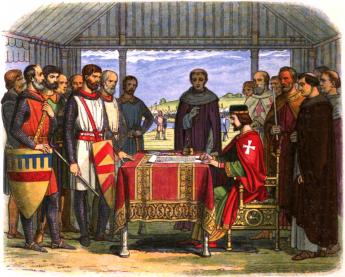
|
| Runnymede,King John, |
But corporations have become so large and successful, that to raise adequate capital they sell thousands or even billions of ownership shares. In those situations, which very nearly run all that matters in the country, a shareholder of a fraction of one percent of the outstanding shares may be able to control the corporation. A dozen of such people can band together and act as though they own the company completely. Ownership through mutual funds or index funds makes shareholder control even more remote. Quite commonly the shareholders lose control entirely, and the hired managers exercise effective control. A system designed to determine the collective will of the shareholders thus eventually reaches the point where the will of the shareholders can be ignored by the people they hired. In effect, the number of voters and the number of shares has outgrown parliamentary rules and procedures, and in fact, continuing to use that format leads to mischief. The hired employees occasionally arrange for salaries for themselves of hundreds of millions, or they can turn the corporation into a private charity, or even ruin it as an economic entity by careless slothful management. The legal term for this process is "imperfect agency", and the country seems to be getting annoyed enough to want to make some changes. But if it is intended to determine the will of the owners, someone will have to devise an agreed way of finding out what the will of the owners really amounts to. If we don't, we are going to have to reconsider clubs, spears, and swords. Welcome to Runnymede, King John, we have a matter we wish to discuss with you.
IF ALL MEN WERE ANGELS, NO CONSTITUTION WOULD BE NECESSARY
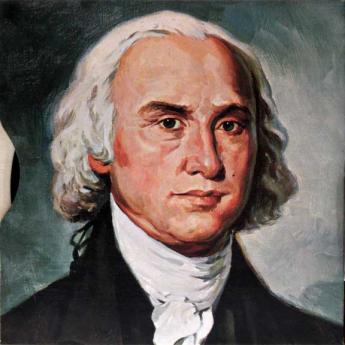
|
| James Madison |
JAMES Madison, Washington's floor manager at the Constitutional Convention of 1787 in Philadelphia, stated the main necessity for holding the Convention at all arose from selfish and untrustworthy human nature. The assembly probably understood exactly who he had in mind, although that is a little unfair to residents of Virginia. He really meant everybody. In the theology of the time, mankind was stained with original sin. Particularly in France, many 18th century romanticists responded to the Enlightenment by defiantly declaring human nature is born pure in heart. In their view, current evils grow from the pollution of civilization, without which it might be possible to have no government at all. At its root, such romanticism was an outcry against progress and civilization, blaming the world's troubles on the Industrial Revolution, so to speak. From Madison's skeptical viewpoint, the most awkward feature of the Romantic Period was its adoption by his Francophile friend and neighbor, Thomas Jefferson, the current American ambassador to France. Madison recognized that Jefferson and Patrick Henry were prepared to assail any attempt to add the slightest power to a central government, particularly if it weakened the power of Virginia. As indeed they promptly came forward to do and nearly succeeded.
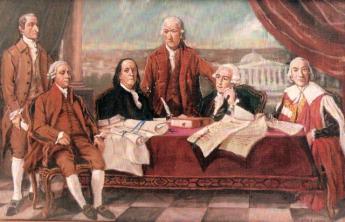
|
| Treaty of Paris |
After fighting an eight-year war for freedom, American belief was wide-spread that it was time to draw back from such anarchy. But there was widespread suspicion in every other direction, too. England seemed to concede, not defeat but only current military overstretch, possibly displaying reluctance to see its former colonies with full sovereignty. George III might wait for America to weaken itself and then try to take them back. Britain almost couldn't do anything right; it was also possibly up to no good when the Treaty of Paris astonishingly conceded land to the Mississippi instead of stopping at the Appalachians. Even our ally France nursed regrets for its somewhat older concessions after the French and Indian War. If even the two mightiest nations of Europe could not maintain order in the vast North American wilderness, perhaps they felt the inexperienced colonies would soon collapse from the effort. Further intra-European wars seemed likely, and could soon spread from Europe to the Western hemisphere. The guillotine was bad enough, Bonaparte would be worse. Our governance as a league of states was in fact, only a league of armies. The Articles of Confederation would not quell inter-state rivalries in peacetime, as only four years (1783-87) experience after the Treaty of Paris were clearly foreshadowing. It was time we listened to Benjamin Franklin, who had been arguing since the Albany Conference of 1745 for unification of the colonies, and to Robert Morris who had been arguing for a written constitution since 1776, a bicameral legislature since 1781, government by professional departments instead of congressional committees, and the ability to levy national taxes -- since at least 1778. Professor Witherspoon of Princeton had provided some ideas about how to make these proposals self-enforcing, Washington was firmly behind a Republican system and opposed to a monarchy. On the other hand, everyone knew that under the Articles of Confederation the thirteen States had often refused to pay their share, abused their ability to deal independently with foreigners, dealt unfairly with their neighbors, and capriciously mistreated their own citizens. It was time to act boldly. With a blue-ribbon convention of national heroes behind these simple ideas, surely it would be possible to convince the sovereign state legislatures to dethrone themselves.
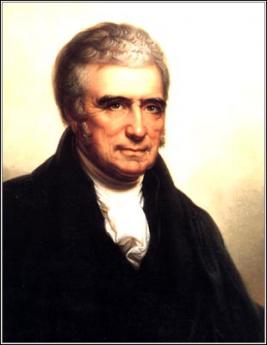
|
| John Marshall |
Two men quietly applied even deeper thinking than that; Benjamin Franklin of Pennsylvania, and John Marshall of Virginia. Both of them had served in state legislatures, both were dismayed by the experience. Franklin also had a long period of close-up observation of the British Parliament, suffering personal abuse there, and had reason to reflect on the earlier abuses by that Parliament under Cromwell during the English Civil War. Certain bad tendencies seemed universal in legislative bodies. Although John Marshall was not a member of the Virginia Constitutional delegation in 1787, he was active in the politics of the group it represented back home. Both Marshall and Franklin had reason to be uneasy about misbehavior in representative bodies, whether called legislatures, congresses, or parliaments. When people said states misbehaved under the Confederation arrangement, they really meant legislatures misbehaved. Franklin did what he could within the Convention to curb this observed behavior by enumerating limited powers and endorsing power balanced against power. When he had nudged it as far as he could, he wearily agreed to give the product a try. Franklin did not trust Utopias, but he had lived among Quakers for years, observing one Utopian society which seemed to endure without resorting to tyranny.
The Constitutional provisions in Article I, Section X became the heart of what the 1787 Convention wanted to change about the relationship of the national and state governments.
States are forbidden to ...
"emit bills of credit, make anything but gold or silver a legal tender in payment of debts, pass any bill of attainder, ex post facto law, or law impairing the obligation of contracts."
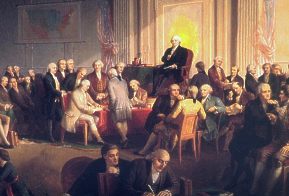
|
| 1787 Convention |
This brief clause is almost a presentment of what state legislatures were doing, which serious patriots regarded as wholly unacceptable. Failure of states to abide by the terms of international treaties must be included in such a summary, although the new Constitution went beyond the powers of states by locating treaties beyond the power of even Congress to change, once ratified. Some observers in fact feel that within the First Article clause, protecting the sanctity of contracts was really the nut of the matter. In one way or another, most states seemed to resort to paying their debts with inflation, somehow failing to recognize that borrowing never pays debts, it only postpones them. The great bulk of this new nation's business was to be conducted as voluntary agreements between two contracting parties. The State -- and the states -- were to stay out of the private sector, except as referee, to see that both sides kept their agreements. As a footnote, the matter of government intervention in private affairs was to rise again in the behavior of the Executive branch in the 1937 Court Packing uproar, and in the 2009 health insurance legislation. Some critics, therefore, have discomfort that the heaviest Constitutional weight was placed by the Founding Fathers on protecting private property. Are not other issues more important, they ask, like life, liberty and the pursuit of happiness? The Founders, of course, we're here not ranking benevolences by value; they were stating principal urgencies for convening the meeting. In a strange unintended way, they here stumbled on the right to property as the foundation for all other rights. But John Marshall understood it was true and was to spend thirty years hammering it into place. People broke individual promises by defaulting on debts; they simply did the same as governments, using inflation.
On the Subject of Rights

|
| Scotch-Irish Presbyterians of Appalachia |
MOST Americans of the 18th century regarded themselves as members of some minority group. The constitutional Founding Fathers, mindful of Cromwell and the English Civil War, were concerned that majority rule might evolve into tyranny. They searched to protect minorities. Because everyone could imagine being outvoted on some dispute, minority status was a universal American concern about democracy. There was a particularly hot political center of Bill of Rights agitation among Scotch-Irish Presbyterians of Appalachia which persists after two centuries, consequently among Southerners and western Pennsylvanians. In those strongly religious days, it seemed self-evident minorities had "divine" rights, conferred by God, which legislatures must not violate, and legislatures repeatedly seemed to agree. As dissenting minorities later became increasingly secular, the language of rights shifted to "natural" rights, without changing much else. Created by the purely logical analysis of the Enlightenment: a right was something anyone would willingly confer to others in order to preserve it for himself. In more contemporary language, the evolving demand is now for "human" rights, whose mystical authority grows from the intensity with which it is demanded. Although "Vox populi" sounds Roman, the concept of infallibility ("Vox Dei"), is an outgrowth of victory in the American Revolution. Underneath semantic wrestling, one essential is demanded: no government, whether by the king or elected majority, may overrule it. The unthreatened majority easily wearies of such agitation and remains more pragmatically concerned with efficiency, peace, and prosperity. Our two political parties began with Bill of Rights outcry, one party appalled by the French Revolution, the other applauding its feisty spirit.
 A little rebellion now and then is a good thing . . . .It is a medicine necessary for the sound health of government... God forbid we should ever be twenty years without such a rebellion. The people cannot be all, and always, well informed. The part which is wrong will be discontented, in proportion to the importance of the facts they misconceive. If they remain quiet under such misconceptions, it is lethargy, the forerunner of death to the public liberty . . . . and what country can preserve its liberties, if its rulers are not warned, from time to time, that these people preserve the spirit of resistance? Let them take arms. The remedy is to set them right as to the facts, pardon and pacify them. What signify a few lives lost in a century or two? The tree of liberty must be refreshed, from time to time, with the blood of patriots and tyrants. It is its natural manure. 
|
| Thomas Jefferson, 1787 |
The founders of the American republic arrived at a compromise formula: strengthen majority-rule government to a point where it can be effective, but keep government too weak to tyrannize a minority. This Constitutional effort first grew out of a general perception that the Articles of Confederation were too weak to be effective, so the new federal government must be able to control the states in a small number of specified areas. But having achieved that, a reverse concern immediately arose. Since slaves and poor people would probably always outnumber rich ones, how can a democracy be prevented from freeing slaves, or poor people from voting themselves the property of rich ones? This concern was surely heightened by earlier maneuvering by two Virginians. Madison and Washington pressed to have Convention delegates be made up of prominent people, preferably former officers of the Continental Army. Their plan to ensure ratification was for legislatures to make way before a Convention of celebrities. It probably did not occur to the two Virginia plantation owners that this selection process might seem to be purely motivated to ensure the best interests of rich people. Rich people usually have power, regardless of not having a majority. Except for perhaps Gouverneur Morris, Convention delegates, however, were not aristocrats but self-made men, and with few exceptions successful ones. It remains hard to argue with their instinctive reaction that if laws make it impossible for those who have been successful in the past to become a self-made success, then it is impossible to see anyone achieving success. Eighty years subsequently the slave component of this issue was finally settled, but sectional bitterness took its place.
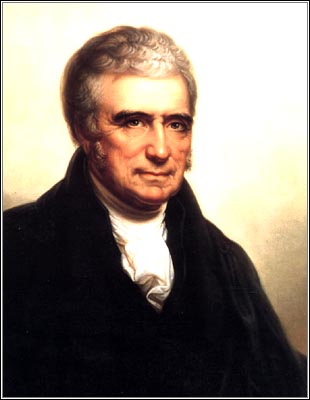
|
| Chief Justice, John Marshall |
The Constitutional Convention weakened the new government to avoid its misuse by a popular majority. They designed separation of its powers, perhaps hoping a balance of power would develop among the Legislative, Executive and Judicial branches, each selected in different ways. As the matter was finally ratified, it seemed a little inadequate. James Madison, in particular, rebelled against the final step of giving the Supreme Court the power to review for constitutionality the laws passed by Congress and signed by the President. It remained for the fourth Chief Justice, John Marshall, to assert judicial review in 1803, sixteen years after the Constitutional Convention. Perhaps with an eye toward symbolism, he did so in a case called Marbury v. Madison.
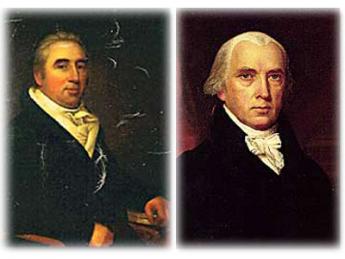
|
| Marbury v. Madison |
This case, strengthened and amplified by later cases with the same outcome, was to enshrine the Constitution as the capstone of the enforcement system of the United States, with all lesser laws consistent with constitutional powers enumerated -- powers implied, and powers are forbidden. This capstone structure, rather than American provincialism so noticed by Europeans, explains why American law has drifted from common law to statutory law, while references in Supreme Court opinions to viewpoints in foreign law are greeted with derision. Foreigners are not given a vote in our system, and our system is grimly determined to recirculate the opinions of its own citizens through the system, especially through the choke-point of the Constitution. In biochemical terms, the Constitution is the rate-limiting factor. It is far too late to try to make it easier to amend the Constitution, just as it is surely too late to eliminate the Electoral College for selecting the President. Too many balance-wheels have been hooked to these fundamentals. Blame it on interest groups if you please, but seriously disturbing these fundamentals will prove unsettling enough to undermine any interest groups that assail them.
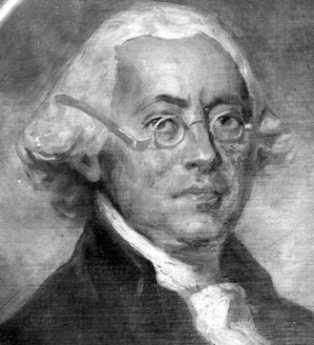
|
| James Wilson of Pennsylvania |
With the blocking of other avenues to constrain majority rule, the system has possibly provided a new one, which may someday be named after James Wilson of Pennsylvania. Wilson lived at the corner of 3rd and Walnut, making it convenient to sign both the Declaration of Independence and the Constitution. Although he spoke 168 times at the Constitutional Convention, his name is most often associated with the idea that basic legal principles should be part of the general background of all educated citizens. Sometimes referred to as the founding professor of the first law school, the University of Pennsylvania, Wilson recognized that the actual practice of the law soon drifts from legal principles to settling on legal mechanics. Law students eventually come to learn that what matters most is what a judge recently handed down as an important opinion setting a new precedent. Step by step the law moves from principles to precedents, and from early precedents to recent precedents. The system is said to be a higher variant on the scientific method -- hypothesis, tests of the hypothesis, modified hypothesis and then tests of the modified version -- first created by Sir Francis Bacon. The law, in short, drifts away from Original Intent but does so proudly, denying a subversion of original principles but asserting a reasoned response to actual experience. Perhaps, in this enlightening process, new human rights can be discovered. Such as a right to abortion based on a right to privacy, based on something else you will have to read the original opinion to recall. It is not necessary to be a fundamentalist Christian to be alarmed by this process when it travels so far from the choke point of the Constitution, overturning dozens of state laws as it goes. Perhaps the most serious criticism of Roe v. Wade is that only two alternatives exist for those who wish to modify it: either undermine the Supreme Court by packing it with supporters of change or else amend the Constitution, which would be nearly impossible to do. Entirely too many plain non-lawyers who have no objection to abortion have read the Constitution and are now mistrustful. Mistrustful of the reasonings of Justice Blackmun, of the profession which acquiesced to his action, and of the intellectual migration process being defended. Whether they know it or not, they are followers of James Wilson, of 3rd and Walnut, Philadelphia.

|
| Jennifer Nedelsky |
Jennifer Nedelsky is a Canadian lawyer who has been active in promoting an alternative to our system of using a constitutional right as a legal "trump card for displeasing laws.", as well as the failed European attempt to invent dozens of new human rights as a way of limiting government power. In Canadian law, a feature is called the "time-limited notwithstanding clause." The legislative branch in Canada is permitted to pass laws which violate a constitutional right, "notwithstanding that right for five years". It is possible to understand the appeal of this legal safety valve, to wait out the popular appeal of a mere fad, or to provide emergency relief in the face of unexpected circumstances. Some of the enduring problems with the legislation passed during the Roosevelt court-packing era might have been more generally acceptable with this clause attached. And it might even address the temptation recently embraced by Rahn Emanuel, that no crisis should ever be wasted. It is true that some appalling legislation does occasionally turn out to be useful. More often, however, it is a well-intended and highly acclaimed law which turns out to create a muddle.
Ultimately, however, we are likely to fall back on the comfort that our Constitution more or less as originally created, has lasted over two hundred years while no other constitution can match that claim. Others have their proposed systems but we have our proven one.
Unwritten Features of the Constitution
 Considerable anger is sometimes directed toward Judges who find unintended provisions in the Constitution. On the other hand, James Madison and some other Founding Fathers were careful to design the Constitution to create outcomes that are far from explicit. 
|
In their early writings, James Madison and the Federalists who participated in drafting the Constitution repeatedly emphasized their allegiance to republican ideals, republicanism, and a republican form of government. This sounds a little odd today, since obviously they were not alluding to the present Republican and Democratic parties, which had not been created. It seems natural to us to regard a republican form of government as a gradual extension of a democratic one, when the size of the electorate grows so large it cannot be readily managed by voice votes in a town meeting, when therefore it becomes necessary to select proxies, or representatives. That description greatly underestimates the subtlety of the Founding Fathers.
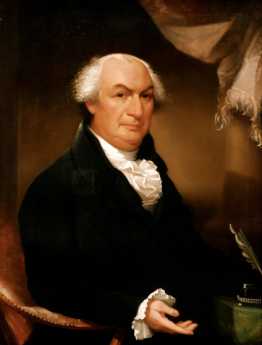
|
| Gouverneur Morris |
Two centrally important members of the Convention, James Madison and Gouverneur Morris, felt especially strongly about a feature that does not occur to many others. When the voters in a particular district pick a representative, they are generally trying to choose one who will not only reflect issues of local importance, but one who will be able to persuade representatives of other districts to vote favorably. In this way, representatives tend to be selected who are taller, handsomer, more intelligent, richer, and more famous than the average person in the district being represented. Not by much, perhaps, and sometimes not at all. But as a general thing, the election of representatives tends to create a House of Representatives who are superior in certain ways to the average person being represented. When candidates and political parties engage in public combat, an impression is given that "politicians" are low characters, but that is in fact not usually true. Many factors will discourage the best candidates from participating in disagreeable contests, and many stratagems are employed in an attempt to elect the worse of two candidates. But it is seldom the case that a successful candidate is less attractive or talented than the average person in his district. Republican governments almost always are composed of more distinguished persons than average, exposed to greater temptations perhaps and subject to more detailed scrutiny.
Madison was so taken with this idea that he proposed the Senate should be made up of people drawn from the House of Representatives in a second round of voting, thereby further purifying the result. For various reasons this approach was not adopted by the Convention, but it does have a logic to it, and it clearly illustrates that Madison was looking for results not always explicitly stated. Gouverneur Morris, on the other hand, was openly enthusiastic for this outcome, because he perceived that the government would be largely concerned with the rules of commerce and therefore the selection process would likely lead to a Congress that was richer and more able in those qualities of importance to commerce. On the one hand, America would gain national advantage in the Industrial Revolution then under way, and it would anyway be highly desirable to select richer people. In his later years, Morris was given to blunt and open preference for the smart set, and is often described as a covert aristocrat. At the time of the Convention however it seems likely he was making a perfectly valid point which had escaped many of his colleagues.
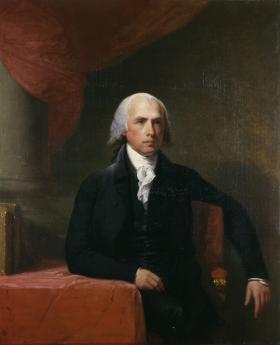
|
| James Madison |
Both Madison and Morris were seriously concerned about a flaw in the republican form of government. They thought it obvious there would always be more poor people than rich ones. Without some effort to rebalance things, the poor would inevitably destroy the common good by using their numerical strength to redistribute wealth from rich to poor. In doing so, everyone would be worse off, even the poor. The poor were more likely to be uneducated and thus more likely to put their own enrichment ahead of almost any other issue, using their own grievances as a justification. There was almost universal agreement among other members of the Convention, because it was well recognized that the main need for a new constitution had grown out of the egregious conduct of state legislatures under the Articles of Confederation, particularly in watering the currency with paper money, and profligate use of debt forgiveness. It would be impossible to have a prosperous country if it suffered from instability, destruction of merit incentives and respect for the property of others. If debts were capriciously forgiven, no one would lend. With paper currency printed indiscriminately, savings would be impossible.
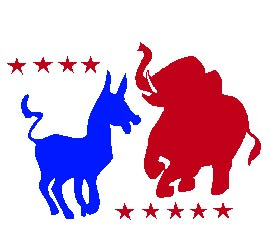
|
| Political parties |
Accordingly, the Convention set about balancing these innate tendencies as well as it could. There was general agreement that election districts with larger population size tended to produce better candidates. Not only employing the reasoning that in a larger district it would be harder to elect an unknown, insignificant person, they felt they could also see examples justifying faith that a larger number of competing internal interests would hold each other in check within the person of their elected representative. An indirect way of accomplishing this was to limit the total number of districts while also providing they be of equal population. Political parties were soon to come forward as a way of raising campaign funds, but nevertheless a person of greater means would have an advantage in a larger district, and persons of greater means could be expected to have greater talents, or would in any event be more likely to resist the pressures for redistributing the wealth of the rich. Members of the Senate were selected by the state governments (at least, as long as state assent was necessary for ratification of the Constitution), but the 17th Amendment changed that to popular election, with a clear resulting decrease of state influence and power. On the other hand, a heavy majority of Senators in the 21st Century continue to be independently wealthy, thereby still accomplishing two original objectives of the founding fathers at one stroke.
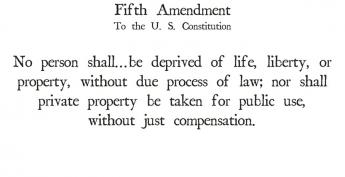
|
| 5th Amendment |
The original working concept of the Federalists was that the skills and prestige of the rich and powerful would promote the owners of property into elective office, and their power would be joined to that of judges, presidents, cabinet officers, and military officers to form an effective counterbalance to the majority voting power of the poor or others who lacked property to protect. The Federalists differed with the anti-Federalists on the source of danger to be guarded against; one group feared impetuous and ignorant greed inciting the multitude, while the other group mainly feared corruption and power-hunger among the powerful few. But both political parties acknowledged that each potential danger was realistic to some degree, and hence there was reason to hope both sides could agree to a balance of power as a sensible check on each other. True, the Fifth Amendment's "takings" clause did specifically provide for just compensation for private property seized by government under Eminent Domain, and the Eleventh Amendment protected state governments against private lawsuits in Federal court, but these seem rather feeble additions to the protections against potential tyrannies of the unpropertied majority, as soon to be seen in the revolutionaries of France. Thus an initial assessment would have to be that protection of the minority with property against legislative assault by the unpropertied majority, was only strong in the short run. But it was likely to succumb in the long run to majoritarian tyranny, as the less educated gradually learned how to use their voting power. To strengthen the balance, therefore, resort was made to limiting the voting franchise to owners of property, and specifically to freehold property, without debt. There was shrewdness to this idea, since it hints at a perception that future class divisions might not lie between rich and poor, but between creditors and debtors. The voting exclusion of females, children and slaves was surely irrelevant to the main issue, based on the 18th Century assumption that any votes from those excluded would anyway be passive, dominated by the male head of household. In any event, the limitation of voting power to freehold property owners was apparently a step too far, and did not last long.
It is not certain how consciously another important feature was considered. State legislatures prior to the Constitution were held in such disdain, that stripping them of the power to corrupt truly important issues was almost a universal goal. Awkwardly, a peaceful transfer of state power over the military and the currency could not be accomplished without securing the agreement of the states who had to ratify the Constitution. This was accomplished by specifying the strictly limited powers of the new Federal government, and ceding control of everything not specifically mentioned, back to the states. One by one, the functions which were vitally important were debated and defended in detail; the list was short. Everything else remained under state control. To go about things in this way had one significant advantage over complete federal control, and Madison specifically anticipated it. If a state government abused its power, the victims of that abuse could escape by relocating to a neighboring state. The potential abuse easiest to understand was a burdensome tax rate. But all of the commercial rules of the new entities called corporations were even more to the point, since rich people could move whole factories and businesses if they perceived enough grievance at home. Powerful people had ways of getting the attention of state governments, their U.S. Congressmen and Senators, and the constituents who voted for them. In New Jersey at present, 4% of the taxpayers pay 76% of state taxes; it is easy to demonstrate that the 4% are moving to other states about as fast as they can. Whether by industry or individually, the residents of a state know very well what their alternatives are in other states, and corporations can negotiate them directly. Whether to bluffing or actually moving, state politicians respond to the threat and which has considerable indirect effect at a national level. The system of checks and balances extends far beyond the words of the Constitution, and well beyond the rules of the Federal government. Its unwritten power extends beyond the control of a handful of Supreme Court justices, spatting over original intent. Its potential weakness, of course, lies in the Court's relative inability to protect what is not stated to be any of its business.
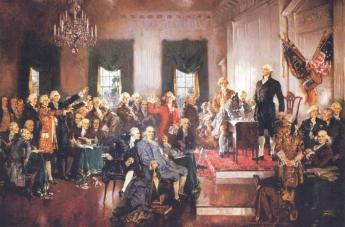
|
| 1787 founders |
One final point about the unspoken cleverness of our Constitution. Some of its most important powers were either unrecognized or intentionally unmentioned by its originators, to whom we look for original intent. After two centuries, we can see as they could not, that it was not merely the first time thirteen sovereign states gave up their power voluntarily and more or less cooperatively. In two hundred or more years, it begins to look as though nobody else can even imitate it successfully. One therefore hesitates to suggest changes of any sort, for fear some unrecognized balance will become unbalanced. Madison believed that increasing size leads to better government and better candidates for office; few would dispute that our Federal government generally does a better and more professional job than the fifty states which make it up. But stop to consider the United Nations. Invested with as much enthusiasm and much more idealism than our 1787 founders, the U.N. flounders and fumbles, and after fifty years must still be assessed to be a failure. Madison would seemingly have predicted that a bigger organization would be even stronger, even electing an assembly of giants. It hasn't worked out that way, and it is impossible to define what it lacks that the American Constitution has in abundance. By itself, this is the strongest possible argument for what is called original intent, but is really just a fearful plea to -- leave it alone.
Government Features Under Stress
A flexible and adaptable Constitution is not exactly the same as a "Living" Constitution, which has come to imply the courts can amend it without the nation following prescribed procedure for amendment. An exception is made for strictly judicial issues, so some observers prefer to focus on that nebulous boundary. What seems to be missing is a way for the public to express the feeling that liberties are being taken with the Constitution, without reaching for drastic remedies like impeachment. Mr. Dooley famously remarked that the Supreme Court reads the election returns, but it often has more affection for stare decisis than the public does.
Manipulation of the Legislature.
The founding fathers spent much time and energy wrangling about the size of electoral districts, generally agreeing that larger districts produced a better representative. James Madison was persuasive that poor people would always greatly outnumber rich ones and would follow the example of the French Revolution in stripping rich people of their property, with disruptive consequences. Possibly because the Industrial Revolution made a much larger proportion of the population prosperous, or possibly for other reasons, the much-predicted outcome did not significantly occur. Rather, we have seen progressive waves of new immigrants start at the bottom of the economic ladder and work upward in a generation or two. Rather than view poor people as a permanent underclass, we can mostly regard poverty as one stage in a process which usually leads to better positions in society. At the present time, the argument about the relative sizes of the economic classes has devolved into a debate about the optimum size of the immigrant class, which in turn depends mostly on our ability to assimilate those who cannot assimilate themselves. Nevertheless, Hannah Arendt and others have taken Madison at his word and searched the Constitution for clever ways in which that notorious schemer might have had his way. Somehow, the provable fact that affluent classes exercise their right to vote more vigorously than indigents do is taken to be proof of the Madisonian outcome. President Barrack Obama apparently saw some sort of political opportunity in the statistics, and we are therefore likely to hear more about this.
 The representatives of the people immediately turn their backs to their elective constituencies after the election and begin to address their new main concern, which is how to deal with their new colleagues. 
|
 Influencing elected colleagues is their life; elections are periodic threats to that career. 
|
It can be predicted that Americans will continue to prefer the approach of achieving equality by making poor people richer, to the alternative of making rich people poorer. But it can also be safely predicted that grumbling about republican (representative) government will continue, because of certain features of human nature that were poorly anticipated by the founding fathers. Although it should be obvious we have long outgrown any plausible alternative, the representatives of the people immediately turn their backs to their elective constituencies after the election and begin to address their new main concern, which is how to deal with their new colleagues. If they are fortunate enough to represent a "safe" district, they may not even pause to reflect much on the electorate at election time. They are not to be blamed for this; influencing elected colleagues is their life; elections are periodic threats to that career. It should thus be immediately clear that voters can most readily increase their influence on legislative bodies by maintaining a roughly even balance of political parties within their districts. In a word, gerrymandering has become a far more important obstacle to voter influence than race and social class will ever be. Gerrymandering in the House of Representatives, that is, because the Senate and other districts with immovable boundaries cannot be gerrymandered. Our system requires boundaries to react to population changes; therefore the control of legislative boundaries must somehow be removed from political control. The simplest approach would seem to be to avoid all mention of techniques and specifics, except one. The election should be voided unless it produces a reasonably balanced outcome; one that approximates the vote split of the entire state. Another measurement objective might be to reduce protracted incumbency in cases where boundary adjustments prove impractical.
 A sincere representative of the people often finds his worst enemies are the leadership of his own party, seeking to control his vote. 
|
 Political families pass these secrets around within the political class, and we become more of an aristocracy than we imagine. 
|
Once elected, a sincere representative of the people often finds his worst enemies are the leadership of his own party, seeking to control his vote. The methods employed to gain power over the freedom of a representative to vote his conscience are numerous, devious and highly effective. The consequence of this game is that experience is so much the master over innocence that families pass these secrets around within the political class, and we become more of an aristocracy than we imagine. No doubt the rules of the chamber evolve over decades or even centuries and respond to realities which most outsiders cannot appreciate. In all probability, the key to making reasonable rule changes is to transform the rules committee into a committee of the whole for a longer time, perhaps a whole week, at the beginning of each session. It is the nature of politicians to scheme in an elaborate game of chess, and it would be unwise to create the chaos of protracted rule modification as part of some devious contraption. But limiting rule changes to a single voice vote at the beginning of a whole legislative season is also unwise.
What might help is drawing the attention of think tanks and colleges to this clandestine issue. In rural state capitols, the first need is for the creation and funding of think tanks, now largely absent. As the newspaper industry experiences relentless shrinkage, philanthropic attention may well be necessary. The assiduous attention of lawmakers to these mundane issues is such that the publication of a few books on the topic might achieve enormous benefit.
Manipulation of the Courts.
The Constitution does not directly mention English Common Law, and strictly read could be held to limit the federal court system to disputes under the statutes and treaties created by the legislative and executive branches. That is, a Court of enumerated powers to match the enumerated powers of the Legislative branch. At present, many lawyers seek to transfer cases to Federal Court because the Judges are superior to state judges. The resulting competition is often salutary, but it is a sad commentary on the typical state judiciary. Since the nation began to function without any statutes passed by the Congress at all, and until the time of the Civil War had less shelf space devoted to all of the accumulated statutes than to the volumes of Common Law, it would have to be assumed it was intended by the Constitutional convention to let the courts themselves decide how much weight to give to the laws of our former masters. In any event, that is about what happened. One by one, as cases came before it, the Supreme Court made references to particular points of common law that became binding on the lower jurisdictions. This unspoken and somewhat obscure process gave rise to a rather questionable concept known as The Law, and therefore sometimes to conflicts between statutes and The Law. The early courts were careful to avoid open conflicts as much as they could, and tended to search for technical and procedural flaws upon which to base their determinations. John Marshall, who did most to forge new concepts of the role of the courts, was particularly careful to avoid open conflicts with clearly specified statutes until he was ready to declare the Supreme Court's right to "review" them. Step by step, the common law was restated to originate with the Court. In time, the findings of the Court became an extension of the Constitution. Americans scoff at the interminable volumes of the proposed European constitution, contrasting them with the few short statements of our own. But if the accumulated findings of the U.S. Supreme Court were appended to the brief preamble we call the Constitution, ours would be far larger. It might claim to be far more flexible but it is also more arbitrary. Flexible or arbitrary, its main weakness is to be so hidden from public view that one bad mistake would cripple its effectiveness. Roe v. Wade came pretty close.
A question has to be raised whether the Supreme Court missed an opportunity to organize and proclaim the organizing principle of Common Law, which in its present form was created by Lord Chancellor Sir Francis Bacon. Picking up on Galileo and other early 16th Century thinkers, Bacon's common law follows the principles of science. A hypothesis is offered, then it is tested and revised hypothesis is offered. Then the new hypothesis is tested and revised. It is called the scientific method, but might just as well be called the legal method. No principle endures unless it withstands continuing testing. The hypothesis from any source is given a respectful hearing, but it is not allowed to stand unless it is lawful. That is unless repeated testing confirms its validity. Statutes, on the other hand, are created by the opinion of half the voters, plus one. We thus have created half the system of the scientific method by passing laws and sending them to the courts for the accumulation of experience. The life of the law said Holmes, has not been logic, it has been experienced. What our system lacks is for some way to recirculate the experience of the courts back to the legislators, for reconsideration.
System Overload

|
| Paper Stress |
We may be a nation of laws but not of men, but that does not mean the more laws we have, the better. The United States Congress currently considers about 25,000 bills each year, but at least they have fairly adequate staff to help them, and they work full time, year round. By comparison, it is more appalling to learn that the New Jersey Legislature considers 10-12,000 bills a year since you have to multiply that by fifty on the assumption other states act the same way. And almost more disconcerting to learn that New Jersey passes 300 laws a year, meeting thirty times a year in three-hour sessions. It must then be reflected that new laws are then sent to the executive branch for implementing regulations. The regulatory process ordinarily results in a notice of proposed rule-making, a comment period, evaluation of public comments, and then finally the issuance of final rule-making. The Federal Register publishes all this activity and runs to more than a hundred thousand pages a year. Periodically, the whole business is restated in the Consolidated Code. Even though each enacted law only goes through this process once, quite a large industry is created just to disseminate new laws. In the process, we make a travesty of the ancient doctrine that ignorance of the law is no excuse . No one at all knows what the law is. The legal profession has been driven to specialization and subspecialization, just so one lawyer can claim a comprehensive grasp of a tiny portion of this stuff. Consequently, we see law firms of a thousand or more lawyers emerge in an effort to cover the entire field and keep up with it. Law firms thus are driven into the communication system employed by ant hills and beehives, as well as rising administrative and communication costs. The public is terrified of involvement in a system which was designed to protect their rights and promote their interest, but with charges of $600 per hour can easily bankrupt anyone who has a serious issue. The country watched Richard Nixon and William Clinton accumulate millions of dollars in legal costs; when the President of the United States, himself a lawyer, cannot afford to defend himself, things are reaching some sort of limit.
A few years ago, overcrowding in the Philadelphia prisons got to the point where a Judge Shapiro ordered Mayor Ed Rendell to stop sending any more prisoners to jail until conditions improved. That was fine for convicted felons, but enthusiasm in the rest of the community was restrained. The overloaded judiciary tends to respond to the avalanche of litigation by almost forcing litigants to settle rather than go to trial, and if a trial is unavoidable, to seek a lighter sentence by foregoing a right to trial by jury. Plea-bargaining is routine. Finally, a whole section of this legislative torrent has been moved away from challenge by the concept of "standing". Using the principle that someone may not use the courts to settle a grievance unless he can show some harm to himself has been caused, or some advantage to him would result from winning the case, the concept of standing has been driven by court overload to be ever more strictly applied. I cannot sue my town for having too few school crossing guards since I am too old to need them, and personally no better off if we have lots of them. It thus is inevitable that concerned citizens are driven away from the courts for relief from high-handed behavior by government, or inefficiency, or unnecessary cost. Directed by the courts to further their goals in the legislature, the citizen finds that legislatures can do little except pass more laws. Passing too many laws is already the underlying problem. The political parties have lately chosen to take sides on de-regulation and re-regulation, but this formulation is really intended to influence the relative size of the private and public sectors of the economy. That's quite a different issue from excessive particularization of instructions and warnings, and excessive use of the legal system in both the private and public sectors. There's a concept known as "capricious abuse of judicial process", for which citizens can be punished, but legislatures somehow cannot. Those who designed and sanctified limited government in 1787 when we started with no statutes at all, do not seem to have anticipated the danger of excessive growth.
Constitution V: The Unforeseeable
At the 1787 Constitutional Convention in Philadelphia, the Framers had pride in their accomplishment, but great anxieties about how long it would survive. Few of them would have predicted it would survive for several centuries, unmatched in durability by any of its imitators. A dozen wars and unimaginable changes in the nature of American society have not shaken it. It survived two particularly ominous threats, the Civil War, and the 1937 Roosevelt Court-Packing episode, but more remarkably it survived momentous, unpredictable, changes in our political, social and economic environment.
The Invention of Political Parties.
It emerges in retrospect that the founding of the American republic took place during The Enlightenment, a comparatively brief interlude of general allegiance to rational behavior. Almost all efforts at the representative government for thousands of years had previously developed many political parties, and vicious ones at that. The Framers expected that elected representatives would disagree about policy and decisions, but would refuse to win political arguments by personally attacking the political opponents who expressed disagreement. The Enlightenment was world-wide, but the American version had strong doses of Virginia Cavalier courtesty and Pennsylvania Quaker humility of speech. Scarcely anyone in the former colonies was true to the manner born, and so almost everyone was both self-conscious and a little unrealistic about the mannerisms of gentlemen. Mix that with an aversion to the aristocracy recently rejected, and there emerged a hesitation to declare a true gentleman would want to be elected public representative for any reason except sincere desire to serve the public as a duty, and certainly not to seek raw power itself. George Washington was the particular exemplar of this model. Renouncing personal power at the moment of his greatest military acclaim, Washington was outspoken about his hatred of partisanship. Resigning as the victorious leader of the armed forces, his return to private life was an act that exited notice and admiration from the whole world, which had fully expected him to create a throne and sit on it firmly. He soon refused to come out of retirement to accept the Presidency unless it was offered unanimously, and agreed to only one term of office. After he was persuaded to accept a second term, he adamantly refused a third because he wanted to establish a tradition of voluntary transfers of power. Along that line, he was seriously concerned that he might die in office, preventing him from establishing a tradition of peaceful transfer of power. No one dared suggest political parties in Washington's presence, but the moment John Adams became President, partisan ugliness began. And it was Thomas Jefferson who was itching to begin it. Jefferson never considered waiting patiently for Adams to complete two terms, but began attacking him during the first one. However much Washington wanted to establish an enduring tradition of courtliness, his administration during the Philadelphia years now sticks out as a quaint aberration.
So the republic was started and established for at least Washington's term, with the proclamation that partisan politics of the sort universally seen before and afterward was only to be deplored. This period was the ten-year temporary period when Philadelphia was the nation's capital, so the concept persisted in Philadelphia as the dominant local standard for another fifty years. Meanwhile, the rest of the country degenerated into the deplorable politics of the frontier, the ignoble, and well, the gutter. Even after Philadelphia evolved into a serious player of machine and state politics, enough guilt about naked ambition remained to restrain the Quaker State from its normal role as a national political power. James Buchanan was indeed elected president but is believed to have been a failure. Since then he serves as an example of why politics are inherently dirty, not suitable for the ambition of authentic Philadelphians. Digby Baltzell blames much of this on Quakerism; that's a partial possibility, but ignores its lack of application to non-Philadelphia Quakers like Herbert Hoover and Richard Nixon, and its visible watermarks stamped on Philadelphians of all religions.
Not mentioning parties, the Constitution says nothing about their number or management. Since the original language contemplated the election of individuals, it leans toward all-or-none victories, thereby sparing us debate about proportional representation. We expect a two-party system, although we do not forbid more than two. The purpose of a party is to help people get elected, so can he win? is the decisive question in the selection of a party candidate. Extremists in both parties disqualify themselves by this test, so when the election finally arrives, comparatively little difference separates the two candidates, and losers can accept the winner. Our elections are unlikely to be followed by civil war, are more likely to be followed by legislative cooperation. Consider the situation with proportional representation among a dozen parties spread over the political spectrum: in nations that try it, one party seldom wins a majority and must form coalitions after the election results are known in order to achieve that governing majority. A succinct summary of the difference is that Americans make their deals before the election; countries with proportional representation have the election first and make deals later after the electorate is excluded. In the rare circumstance when the public wants the wrong thing, proportional representation is a way to do the right thing against the wishes of the public. While it is possible to envision a good outcome from such a situation, it is not easy to imagine public approval of it.
The Mysteries of Property
Everyone was once a nomad. When vast unoccupied land stretched in all directions, ownership meant very little; everyone moved at will. A particular water hole had importance, perhaps, but ownership of it merely meant fighting off others who came near; tribal ownership was a matter of having enough friends to help exclude intruders. If the tribe moved away and came back, intruders again had to be thrown out. This was essentially the situation of native American Indians when the Europeans arrived.
Conventions of land ownership existed under English common law in 1787 but were only a step better organized than the Indian conventions. All land belonged to the king, who might cede large estates to loyal nobles, but could also take it back if the vassal proved disloyal. The Magna Carta and the English Civil War could be viewed as steps in the disruptive process of eventually ceding portions of the King's land to individuals permanently, to have and to hold. The concept of private property became embedded in English common law and was carried over into our own Constitution, although the awkwardness of Indian rights created an incentive to be a little vague. English common law was not so much transferred into our system as recognized to "inform" it, a characterization which allowed the Judiciary to adopt, modify or ignore the awkward parts. Although the rules were imprecise, the Framers of the Constitution and John Marshall's court created a hybrid system, with enough flexibility to deal with remnants of the two preceding theories of land ownership, the farmer and the cowboy. Pre-revolutionary Royal caprice was frozen at the moment of independence, followed by successive recorded transfers through an unbroken chain to the present. If you could establish your position to the satisfaction of the courts, it was your land, your property. This seems to have been the basic model the Framers envisioned when they wrote the Constitution and served as a template for other kinds of ownership when they wrote of the sanctity of contracts. Because this uniform theory of ownership contained some delicate threads of reasoning, well recognized to conflict with the attitudes of the earlier Indian owners, and a little stretched when extended to concepts like intellectual property, it was essential to establish it as uncontested. Land ownership at that time was the main place to store wealth, and transforming a limitless continent into the useful property was the main route to acquiring wealth. Money in the form of currency was a tool for facilitating wealth transfers, banking was a step removed and remained contentious for a century. The property was wealth, and more sophisticated definitions of wealth were treated as property organized around the principles of real estate. When the Framers spoke of the sanctity of voluntary contracts they also had in mind preventing the recent abuses of debt forgiveness under state legislatures responding to unfettered majority rule. If the chain of ownership broke at any point, and particularly if contracts were unenforced the Framers had reason to fear the country could fall apart.
The certitudes of the Eighteenth century were also the certitudes of the Nineteenth; and even for most of the Twentieth century, those who challenged it were regarded as nuisances, intellectual triflers, perhaps Bolsheviks. The courts, however, began to observe evolving ideas of society conflicting somewhat with this central core of our law. Small businesses protested the unfairness of competing with big business, unrestrained by governmental antitrust laws. Labor unions rebelled at the situation of worker powerlessness in their eternal struggle for higher wages against huge companies intent on reducing costs. Private companies could not possibly compete against businesses run by the government, but perhaps it would be more profitable for all businesses to be run by the government. One by one, foreign socialist and communist countries have tried it and were competitive failures, but perhaps Singapore and China, or Denmark and the Netherlands, have perfected government ownership to a point where some corporate state could impoverish us if we persist in the old economic model. So far, it has not been necessary to argue justice and logic; the economic failures of other systems make adoption of their legal ideas laughable.
Nevertheless, the premise of unlimited open land is disappearing. Only 2% of workers in the economy work in agriculture. If the land is no longer the unwritten monetary standard, perhaps its requirements should no longer be the tentpole of the legal system. Perhaps the government has a legitimate role in health care, support of the arts, support of the poor and retired, education of the young. An underlying concept seems to be that certain economically unprofitable but desirable activities will not flourish in a property-based economy unless they are identified politically and reimbursed by taxation. Perhaps in an information age, the government is the logical and most efficient management of information. Perhaps if the government interfered more in private transactions, society as a whole would benefit. It can be difficult to tell how much this sort of reasoning is based on changing concepts of private ownership, and how much is a claim of collective rights; the two visions tend to merge in weakening individual control of the property, while enlarging public claims to the same property. Something called Society is claimed to exist and claimed to have rights.
This assault on old attitudes currently achieves prominence in the Green revolution, where residents of urban skyscrapers feel passionately about swamps and mountain tops they have never seen. If an eagle roosts on a farmer's land, somehow it is not the farmer's eagle, it is everybody's eagle. Green revolutionaries need to become far more explicit about their rights to the private property of others if they hope to convince judges that they have a case, but their ardor is not deniable.
Eleventh Amendment
There are certainly a lot of Ingersolls in Philadelphia. A lot of Jared Ingersolls, a lot of Charles Ingersolls, and even a lot of Charles Jared Ingersolls. At a dinner party, a lady whose maiden name is Ingersoll was asked about Charles Ingersoll, and was forced to say, "Just how old would you say he is?"
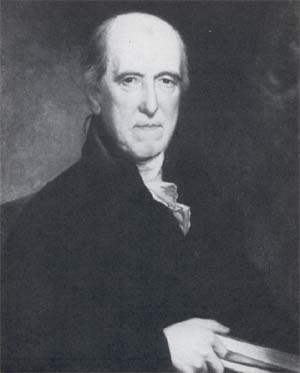
|
| Jared Ingersoll, Jr., |
The one we are talking about here is Jared Ingersoll, Jr., the son of a Tory who had once been tarred and feathered by Revolutionaries in New Haven. Young Jared was in England at the Inns of Court when the Declaration was signed, became a fervent Revolutionary, and represented Pennsylvania at the Constitutional Convention. It was thus difficult to predict where his sympathies would lie in the settling of debts and grievances associated with the Revolutionary War; in fact, he might be as impartial as any lawyer to be found at the time. At their best, all lawyers reach for the peaceful settlement of grievances, serving their clients best by finding a solution that puts an end to reprisals. Furthermore, he had excellent legal training, something which could not be said of most apprentice-trained lawyers of that time, and had faithfully attended every single session of the Continental Congress, while commenting very little about his own views. The first ten amendments are the Bill of Rights which had been promised during the ratification process, so the Eleventh became the first real amendment, in the sense that it specifically reverses some feature of the original design. To present observers it may not be easy to surmise just what the purpose might have been to outlaw the method which had been established for an injured citizen to sue a state. To be blunt about this point, the colonists wanted to welch on paying debts to Loyalists and Englishmen, those hated enemies, without admitting this was their motive. The spin they put on this shabby attitude was that states were now sovereign entities without a king, and since historically a British king could not be sued without his consent, therefore neither could the states. Probably the best that can be said for this cloud of words is the point that suing the government should not be made too easy, for fear of overwhelming the court system with endless clamor. The historical episode surrounding the Eleventh Amendment is an important one in our national struggle to balance the accusations of hypocrisy and chiseling, with the opposite tendency of slavish adherence to procedure, or "due process".
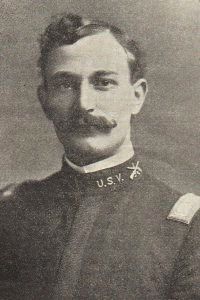
|
| Alexander Chisholm |
Ingersoll had attended the Constitutional Convention as part of the most influential state delegation of insiders and was set up to practice law in the capital city of Philadelphia just a few blocks from the heart of government. A case came up. The estate of Captain Robert Farquhar, an Englishman, was owed $169,613.33 for "goods" sold in 1777 to agents of the embattled State of Georgia during the Revolution. The executor of Farquhar's estate, a resident of South Carolina named Alexander Chisholm, then sued the state of Georgia after the war was over for that state's extinguishing the debt by a statute passed after the contract. This had been the rather common treatment of Loyalist debts by other colonies and thus enlisted their sympathies to Georgia in this case. Furthermore, it was the sort of uncivil behavior that had enraged John Jay and George Washington, leading them to press for the Constitutional Convention. On the other hand, the new state governments were hard-pressed for cash and had to contend with highly combative citizens who resented even the suggestion that they play fair with people who had so recently been trying to kill them. Furthermore, it was entirely realistic for them to fear a flood of lawsuits from people they mercilessly pursued under what "everyone" considered the rebellion's accepted rules of engagement. It was thus clever for Georgia to seek the help of Ingersoll in appealing to the Supreme Court, and the previous tarring and feathering of his Loyalist father was not entirely irrelevant. Ingersoll, unfortunately, lost his case of Chisholm v Georgia when the Supreme Court (John Jay, CJ) declared that Chisholm was indeed entitled to sue the State of Georgia. It is hard to see how Ingersoll (and his colleague Alexander Dallas) could have won this case when the Constitution which he helped write plainly provided the rules for citizens of one state suing another state; it seems remotely possible that the officials of Georgia were attempting to shift the blame of an inevitable loss of the suit:
Article III - Section 2 -The judicial Power shall extend to all Cases, in Law and Equity, arising under this Constitution, the Laws of the United States, and Treaties made, or which shall be made, under their Authority; to all Cases affecting Ambassadors, other public Ministers and Consuls; to all Cases of admiralty and maritime Jurisdiction; to Controversies to which the United States shall be a Party; to Controversies between two or more States; between a State and Citizens of another State; between Citizens of different States; between Citizens of the same State claiming Lands under Grants of different States, and between a State, or the Citizens thereof, and foreign States, Citizens or Subjects.
John Jay ultimately revealed the depth of his dismay at dishonoring debts when he negotiated Jay's Treaty during the Adams administration, providing for adjustment of such debts. Adams, in turn, was to reveal where his own sympathies lay by refusing to announce -- for three years -- the reversal of this position by the Eleventh Amendment, stirred up in his own state. Adams' rather flagrant abuse of a technicality might well have led to another constitutional amendment, except for the Supreme Court later ruling that official enactment of amendments did not require Presidential announcement, but took effect upon ratification by the required number of states.
Adams, in turn, had ample political problems in his home state of Massachusetts. John Hancock, then Governor, called a special session of the Massachusetts legislature to propose an amendment to reverse the Constitutional language on which the Supreme Court's decision had relied: It soon became clear, or perhaps Ingersoll was determined to make it seem clear, that Georgia had been smart to employ this political insider. Congress soon enacted, and the necessary states soon ratified the Eleventh Amendment. It stated that a citizen of another state may not sue a State government in Federal Court:
Amendment XI. The Judicial power of the United States shall not be construed to extend to any suit in law or equity, commenced or prosecuted against one of the United States by Citizens of another State, or by Citizens or Subjects of any Foreign State.
Later decisions included citizens of the same state, so in effect, this amendment stated that no one may sue a State Government unless the state agrees to be sued. That's essentially what is true of the federal government; the states were given the same sovereignty with all of its features, as the federal government and that was an intentional slap in the Federalist faces.
It sounds as though Jared Ingersoll might have been a states-righter, although nothing in his past or future behavior suggests that he was anything but an ardent Federalist. He was even proposed as vice presidential candidate for the Federalist Party. No one called him wishy-washy, or a traitor or a covert anti-federalist, and he never acted like one. He was just a lawyer with a client.
The Supreme Court Arrives, A Little Late
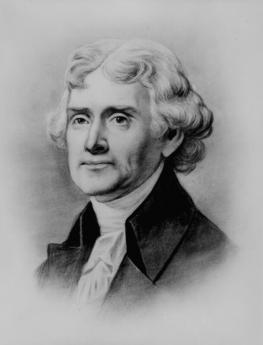
|
| Jefferson |
Thomas Jefferson became President in the country's fourth Presidential election; John Marshall was the fourth Chief Justice of the United States. These two Virginians hated each other personally, and each hated what the other stood for. Jefferson had been aboard when the Constitution was written, and when he came home it was too late to change it. But it didn't suit him at all, whereas Marshall devoted his whole life to strengthening it. The Constitutional System had evolved pretty far in sixteen years, except for the Supreme Court. From the Moment Marshall administered the oath of office to Jefferson, the war over the Court was on. Marshall was precise, concise, and implacably logical. Jefferson issued great clouds of uplifting rhetoric that were often hard to follow. People of those two personality types almost always detest each other.
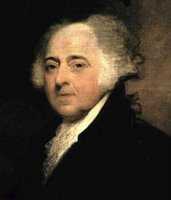
|
| John Adams |
By this time, it was becoming clear that minority rights were most effectively protected by confronting the party in power with the near certainty of being soon out of power, hence soon exposed to retaliation. The problem this solution generated was then how to maintain national stability when power was constantly shifting. Marshall's solution was to have a semi-permanent judicial system, with the power to overrule both President and Congress on fundamental, Constitutional, issues. It is not clear whether this concept had always been in his mind, or whether the experience of seeing his Federalist party swept out of office made him cast about to find ways to preserve their will. It now scarcely matters, since outgoing President John Adams had made a whole pack of "midnight" appointments as he left office, and Jefferson promptly tried to throw them out. That, in essence, is what the famous case of Marbury v. Madison, was all about. When the smoke cleared, Marshall had established that the Supreme Court could overrule the other branches of government if it could find support in the Constitution. And the Constitution largely means whatever the Supreme Court says it means. That was a bitter pill for Jefferson, who had proclaimed and campaigned on the principle that the will of Congress was supreme.
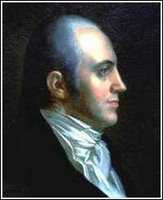
|
| Burr |
The other sweeping concept which Marshall introduced into our system of government was to transform the Supreme Court from a mere tribunal into a pulpit for announcing fundamental principles of law. His method was to decide cases on the basis of wide ranging constitutional principles when the same decision could have been made on narrow technical points. In the famous trial of Aaron Burr,, Marshall could quite properly have refused to hang a former Vice President just because Jefferson hated the man, especially since the main witness against Burr was a notorious liar and scoundrel. Instead, these features gave Marshall the cover to expose weaknesses in the constitutional definition of treason, which contained muddled thinking but vexingly specific language. One man's legal clarification is another man's legislating from the bench, of course, but the innovation was nevertheless Marshall's. By holding the lower courts strictly to the letter, this approach concentrated interpretative latitude in one place, where it cannot escape public notice. The European Union, struggling to match the American model, will be hard put to match this particular unwritten subtlety.
REFERENCES
| American Sphinx:The Character of Thomas Jefferson Joseph J. Ellis ISBN-13: 978-0679764410 | Amazon |
Unwritten Constitution
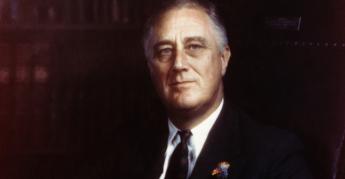
|
| Franklin Roosevelt |
After Franklin Roosevelt was elected to the Presidency four times, the 80th Congress reacted by proposing what is now the Twenty-second Amendment of the Constitution, that two terms are all that will be permitted in the future. The supporters of Roosevelt have continued to argue that the Amendment was a mean-spirited insult to a man who was no longer able to defend himself. In their view, the Amendment implies that Roosevelt wished to be a dictator, in the pattern of most dictators from Julius Caesar or even earlier. That would seem an unfairness to a man who apparently had sufficient popularity to be re-elected for as many decades as he lived. Dictators, by contrast, characteristically have a succession problem leading them to believe realistically a bloodbath might ensue in the aftermath of relaxation of iron rule during a transition. That is indeed the usual case; if there were nothing more to it, this Amendment would not have much justification. That is not all there is to it.
It might well be said that George Washington started an unwritten rule by voluntarily stepping down after two terms since he too could have been re-elected as many times as he pleased. Furthermore, political parties as we know them had not then been invented, so he could not have been motivated by the reasons I now wish to explore. He apparently just felt in his bones that a limited period was best, and the nation came to agree with his opinion. Ulysses Grant and Theodore Roosevelt both seem to have toyed with the idea of longer presidency but retreated in the face of public hostility. Just why the public felt that way is not clear; much was said about Washington's wise words, but that seems unconvincing.
-->As the country has grown in size, the man we elect to leadership is mainly elected for symbolizing the attitudes of the network of acquaintances he brings along to power. What we know as political parties only partly represent that power network. It is composed of those who seek an agenda that is not currently being addressed, plus those who oppose the agenda that is being pursued. When the combined numbers become a majority, the incumbents are replaced, and the cycle then goes on to repeat itself indefinitely. In that sense, the terms of office state a minimum. It is disruptive to replace governance too soon and too often. The Constitution is silent on the other side of it, of how long is too long, probably because there were no useful models to follow in this first democracy of modern times. We have to surmise that Washington reflected on this question for a period of time before he announced his answer with his own example. Eight years is long enough.
Washington surely had ample opportunity to observe the gradual assumption of power by the network of people who actually carried out public policy, to the point where they bitterly resist the loss of their power which is inevitably the consequence of losing their leader. He may have lost his taste for glory but they have not. Indeed, when you can see signs of their rebellion, you know it is time for the whole lot, to go. It is really pretty hard to see the frail, sick, disabled Roosevelt hungering for more power; it was his cronies who did. That he could be persuaded to make the effort is as good as a sign as you can find, that it was well past time for him to retire.
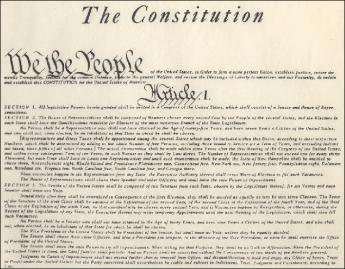
|
| Article Constitution |
We live in an age of aphorisms, called bites of sound. The argument might well be reduced to saying that since power corrupts, there does come a time to throw the rascals out. When the new reforming heroes take over, power will similarly corrupt them in time, so we must throw them out, in turn. It's a system we sort of eased our way into, and after a while, we came to feel that eight years is about long enough to get your reforms reformed, not quite long enough for corruption to become entrenched. And after two hundred years, we finally got around to making it official. Instead of talking about plumbing inspectors taking bribes, or lobbyists paying for Vicuna coats, or drunken congressmen cavorting in fountains with women of light repute, let's go right to the central figure in the controversy, the man who was indispensable even when he was uremic. The example has to do with patent protection, deemed important enough to write into the third Article of the Constitution, even though term limits were left vague.
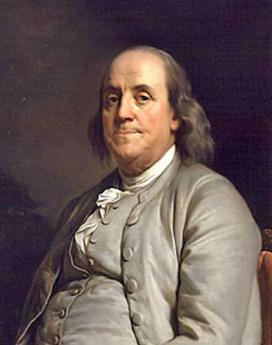
|
| Benjamin Franklin |
Franklin Roosevelt hated monopoly, as do most of the rest of us. He carried this antipathy to the point of opposition to all patent protection for inventions, which Benjamin Franklin felt promoted innovation, but which FDR saw as creating a monopoly. Both tradition and the Third Article stood in the way of his doing much about it, at least overtly. However, he did control the appointment of federal judges, who controlled the enforcement of patents. We are told that all judicial nominees were interviewed privately on their views about patents, and one by one the judiciary was filled with patent-hating judges. Roosevelt, as mentioned, was elected four times, and it reached the point where it was effectively impossible to enforce any patent. The Eighth Judicial Circuit in Minneapolis did not sustain a single patent until 1969 since Roosevelt appointees continued on the bench long after new presidents, even new political parties, had come and gone. Regardless of how we may feel about trial lawyers and Bleak House lawyers, and litigation -- and even ridiculous assertions of patent protection for the human genome or patents for business methods -- the state of patent protection is most readily demonstrated by the number of patent lawyers. In 1950, there were only ten patent lawyers in Philadelphia, 4000 in the whole country. In 2007, there are four thousand patent lawyers in Philadelphia and over a million nationwide. Whether the instinct is to see this as a good thing or a bad thing, it is certainly proof that the Constitutionally protected right of patent protection was snuffed out by a process entirely contrary to Constitutional intent. And that process, whether saintly or utterly corrupt, was only made possible by flouting the traditional limitation on terms of office.
Delaware's Court of Chancery
 |
| Chancery |
Georgetown, Delaware is a pretty small town, but it's the county seat so it has a courthouse on the town square, with little roads running off in several directions. The courthouse is surprisingly large and imposing, even more, surprising when you wander through cornfields for miles before you suddenly come upon it. The county seat of most counties has a few stores and amenities, but on one occasion I hunted for a barbershop and couldn't find one in Georgetown. This little town square is just about the last place you would expect to run into Sidney Pottier and all the top executives of Walt Disney. But they were there, all right, because this was where the Delaware Court of Chancery meets; the high and mighty of Hollywood's most exalted firm were having a public squabble.
Only a few states still have a court of Chancery, but little Delaware still has a lot of features resembling the original thirteen colonies in colonial times. The state abolished the whipping post only a few decades ago, but they still have a chancellor. The Chancellor is the state's highest legal officer, and four other judges now need to share his workload, which was almost completely within his sole discretion seventy-five years ago. In fact, the Chancellor usually heard arguments in his own chambers, later writing out his decisions in longhand. The Court of Chancery does not use juries.
Going back to Roman times, the Chancellor was the highest office under the Emperor, and in England, the Lord Chancellor is still the head of the bar in a meaningful way. Sir Francis Bacon was the most distinguished British Chancellor and gave the present shape to a great deal of the present legal system. A court of Chancery is concerned with the legal concept of equity, which is a sense of fairness concerning undeniable problems which do not exactly fit any particular law. The Chancellor is the "Keeper of the King's conscience" concerning obvious wrongs that have no readily obvious remedy. You better be pretty careful who gets appointed to a position like that, with no rules to follow, no supervisor, no jury, dealing with mysterious issues that have no acknowledged solution.
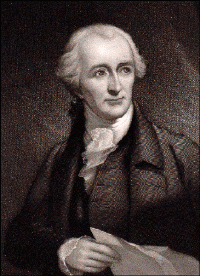 |
| George Read |
Delaware's Court of Chancery evolved in steps, with several changes of the state Constitution over a span of two hundred years. As you might guess, a few powerful chancellors shaped the evolution of the job. Going way back to 1792, Delaware changed its Supreme Court from the design of its Constitution, and George Read was the new Chief Justice. However, it was all a little embarrassing for William Killen, who had been the Chief Justice, getting a little old. Read refused to have Killen dumped, and in this he was joined by John Dickinson, who had been Killen's law clerk. So Killen was made Chancellor, and a court of Chancery was invented to keep him busy.
Under a new 1831 Constitution, the formation of corporations required individual enabling acts by the Legislature and limited their existence to twenty years. However, the 1897 Constitution relaxed those requirements and permitted entities to incorporate under a general corporation law and allowed them to be perpetual. By this time, other states were distributing equity cases to the county level, but Delaware was too small to justify more than a single state-wide Court. That court was attractive to corporations because it could become specialized in corporate matters, but retained a pleasing number of equity cases among common citizens, thus retaining a folksy point of view. In unique situations or those without a significant history of public debate, it was thought especially desirable to strive for unchallenged acceptance of the court's decision.
But other states thought they could see what Delaware was up to. In 1899 the American Law Review contained the view that states were having a race to the bottom, and Delaware was "a little community of truck farmers and clam-diggers . . . determined to get her little, tiny, sweet, round baby hand into the grab-bag of sweet things before it is too late." However, that may be, corporations stampeded to incorporate in the State of Delaware, and the equity of their affairs was decided by the Chancellor of that state. In one seventeen year period of time, the U.S. Supreme Court reversed the decision of the Chancellor only once.
 Chancery's jurisdiction was complementary to that of the courts of common law. It sought to do justice in cases for which there was no adequate remedy at common law.  |
| A. H. Manchester Modern Legal History of England and Wales, 1750-1950 (1980) |
Some legal scholar will have to tell us if it is so, but the direction and moral tone of America's largest industries has apparently been shaped by a small fraternity or perhaps priesthood of tightly related legal families, grimly devoted to their lonely task in rural isolation. The great mover and shaker of the Chancery was Josiah O. Wolcott (1921-1938), the son and father of a three-generation family domination of the court. Most of the other members of the court have very familiar Delaware names, although that is admittedly a common situation in Delaware, especially south of the canal. The peninsula has always been fairly isolated; there are people still alive who can remember when the first highway was built, opening up the region to outsiders. Read the following Chancelleries quotation for a sense of the underlying attitude:
"The majority thus have the power in their hands to impose their will upon the minority in a matter of very vital concern to them. That the source of this power is found in a statute, supplies no reason for clothing it with a superior sanctity, or vesting it with the attributes of tyranny. When the power is sought to be used, therefore, it is competent for anyone who conceives himself aggrieved thereby to invoke the processes of a court of equity for protection against its oppressive exercise. When examined by such a court, if it should appear that the power is used in such a way that it violates any of those fundamental principles which it is the special province of equity to assert and protect, its restraining processes will unhesitatingly issue."
That is a very reassuring viewpoint only when it issues from a person of totally unquestioned integrity, a member of a family that has lived and died in the service of the highest principles of equity and fairness. But to recent graduates of business administration courses in far-off urban centers of greed and striving, it surely sounds quaint and sappy. And many of that sort have found themselves pleading in Georgetown. Just let one of them a bribe, muscle, or sneak into the Chancellor's chair someday, and the country is in peril.
Fees for Trial Lawyers, Section 1983 Variety

|
| Abuse |
We are indebted to Nicholas D'Alessandro, Jr.,Esq. for opening our eyes to the marvels of "1983 cases". That's lawyer slang for Section 1983, Chapter 21 (Civil Rights), Title 42 (The Public Health and Welfare) of the United States Code. In effect, we are talking about a Reconstruction-era law passed in 1871, to protect ex-slaves from persecution by local Southern governments, "acting under color of law". During the entire first century after its enactment, about 270 lawsuits had been brought under this seemingly unobjectionable law.
Well, last year alone there were over 30,000 cases. The number has been steadily growing in the past twenty years, even though it is commonly believed Reconstruction is a best-forgotten episode in a tragic era of the past. Without significant objection, it is generally accepted that the main stimulus for 1983 cases is the recent (and extraordinary) feature of awarding full compensation for legal costs of the plaintiff. In other nuisance lawsuits, the contingent-fee system awards the lawyer a percentage (usually 33%) of the damages, making it unattractive to pursue minor cases. In a 1983 case, however, a trial lawyer could bill $350 an hour for many hours, while pursuing a case worth $100 in damages. A large proportion of these cases allege a local police officer deprived a citizen of his civil rights in the course of arresting him for a traffic violation.
Taken in the aggregate, awarding billions of dollars in fines against local governments can be imagined to represent a punishment of local taxpayers for not reigning in their police officers. They represent a signal from the federal government that it believes local law enforcement is too vigorous in the pursuit of minor infractions and creates an incentive to be less so. Alumni of the Vietnam War protests and other civil disobedience are probably sympathetic if they ever find themselves on juries in such cases.
In recent years, a growing source of 1983 cases have been related to local zoning laws and regulation. Many citizens claim they have been stripped of their property rights when forbidden to put a filling station in their front yard. Others darkly suspect local officials of taking secret bribes to re-sell the property to Wal-Mart, whenever government confronts the owner with taking his property by right of eminent domain. In cases like this, the sympathetic jurors are likely to be Jeffersonians, with a hunting rifle hanging above their fireplace. Such fiercely independent people, however, are given pause by knowing they must appeal the action of local officials to the federal government, acting under a federal law called Section 1983. The frustration must be intensified by learning the U.S. Supreme Court has declared it will not second-guess a local government by granting a writ of certiorari unless the action "offends our conscience". A careful search of the records of the Third Federal District (our own) fails to discover a single instance when that conscience was offended enough to intervene.
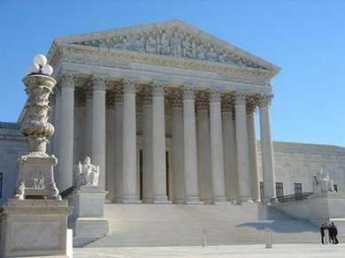
|
| Supreme Court |
But, wait. In 2005, the public flamed up. In keeping with past tradition, the Supreme Court again found its conscience was not offended by the exercise of eminent domain by the City of New London, Connecticut. New London is experiencing hard times, potentially made worse by the threatened closure of the nearby submarine base. Accordingly, it seemed in the public interest to condemn some small private properties in order to assemble a large parcel of land for commercial development. Libertarian groups took up the case of Ms. Kelo, a dispossessed small landholder, and carried it to the U. S. Supreme Court, who declared that the eminent domain didn't bother them.
But Kelo v. City of New London did bother a lot of citizens all over the country. Even making allowance for the hostility to the eminent domain which has been growing for decades, and recognizing it is being stirred up by ideological groups, the Supreme Court still had crossed some sort of invisible line. What New London does with its waterfront is of small concern to the rest of the nation, but for the Supreme Court to declare it doesn't really care about such trifles is quite another matter. A man's home has always been referred to as his castle in this country, and title to a great many properties is only completely clear if you acknowledge the power of that gun on the mantelpiece. Add to that the recent extraordinary rise in real estate prices, and you might expect small property holders to be highly resistant to state takings. One must be sympathetic with the dilemma of the judiciary in trying to balance such intense attitudes with the general welfare of the community, particularly a community with floundering economics. But a Supreme Court that can't be bothered with trifles, that don't worry unless you light a fire under them -- had better expect to get fires lit under them.
Following the Rules
 Contrary to press accounts, I did not warn the President about anything and was very respectful of is Constitutional authority on the appointment of federal judges. 
|
| Sen. Specter |
As the record shows, I have supported every one of President Bush's nominees in the Judiciary Committee and on the Senate floor. I have never and would never apply any litmus test on the abortion issue and, as the record shows, I have voted to confirm Chief Justice Rehnquist, Justice O'Connor, and Justice Kennedy and led the fight to confirm Justice Thomas. . . .
In the lame-duck season after the 2004 Presidential election that is, during that two-month interval between the November election and the January inauguration Senator Arlen Specter (R, PA) said something or other about upcoming Senatorial confirmations of Federal judges. As the probable next chairman of the Senate Judiciary Committee, but known to be in conflict with most of the Republican party on the subject of legalizing abortion, his influence would bear an important influence on the outcome. The Senate Republican leadership then said something or other which had the basic significance of, "You aren't going to be elected Chairman of the Judiciary Committee unless we know in advance where you are going with this matter." Regardless of the merits, and regardless of its eventual outcome, the episode illustrates a little-understood but crucial moment in the history of any Congress. The moment lasts about five minutes, and it only comes once, every two years.
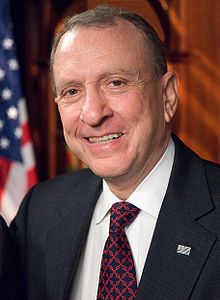
|
| Sen. Arlen Specter, (R) PA |
You can't run a parliamentary body without rules. The first item of business, therefore, must be the adoption of rules. With rare exceptions, the traditional set of rules is proposed and adopted. All done. Don't bother us any more on this topic, because the rules just adopted ordinarily provide major obstacles to change once adopted. Since committee appointments are next on the agenda, and committee membership is vital to legislative effectiveness, and since committee appointments are in the hands of the majority party leadership, this is not the moment for a new legislator to be making trouble. And an old legislator wants to progress toward chairmanship of his prized committee.
Among things which the rules, adopted in a twinkling, provide for is whether committee chairmen are elected by the members of the committee, or selected by the leadership. For the most part, this issue is so sensitive, that traditional resolutions of it rely on seniority. Like the selection of a King by elevation of the first-born male offspring of the last one, the seniority system does not always choose the best candidate, but it avoids bloodshed and allows progress toward the business at hand. After all, when committees are evenly divided and hotly contested, the adversary environment will ensure that the chairmen can't get away with much. Conversely, in a committee heavily weighted toward one side of a controversial issue, that majority will surely get its way. Either way, it doesn't make as much difference who is chairman as it first seems; you might as well let seniority rule.
The rules of the House of Representatives allow the Rules Committee to limit debate on an issue to a time fixed in advance. Hidden in this rule is the power of the leadership to select who is going to speak, who is going to be excluded. When you elected your local congressman, you probably didn't anticipate he might not be allowed to speak on your favorite topic, but that's the way it works out. In the Senate, on the other hand, there is a rule of unlimited debate by any Senator on any topic, for whatever duration. Or almost. When some Senator has had all the blather he can stand on a topic, he is privileged to rise and say, "Mr. Speaker (vice-President), I move that we vote immediately on this and all pending matters." To which the person in the Chair will reply, "That motion is in order, but it requires an affirmative vote of 60 Senators to be adopted. All in favor, please signify by saying 'Aye.' " That's where filibusters come from, and it's all in the rules.
Rules adopted in the first few minutes of the opening session are very difficult to change once adopted. Creating situations the founding fathers never contemplated, perhaps, but also very hard to argue with under all the turbulent circumstances of a democracy. Or, perhaps, a Republic.
Unwritten Lessons For the European Union
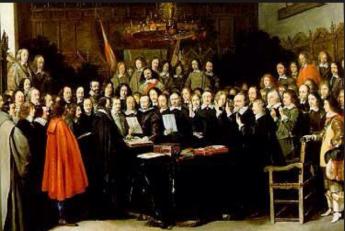
|
| Peace Treaty of Westphalia 1648 |
Europeans, long accustomed to providing Americans with cultural models, sometimes have a little trouble acknowledging the emerging European Union is based on the American design of 1787 Philadelphia. So perhaps it is tactless to emphasize they might encounter some of the same problems. The success of our design is a good reason to imitate it, and may, in fact, be a chief reason to boast about it. But look at it another way. Since we are uncertain why many provisions work so well, we are reluctant to change them; but the proud Europeans cannot be expected to adopt them for a vague reason like that. The main point is to maintain the right degree of vigilance and flexibility, a difficult measurement to make or to transfer to different circumstances. Our Constitution is more right than wrong, so it was intentionally made hard to change. Technically the Constitution has been amended twenty-seven times. Omitting the Bill of Rights, minor technical changes leave us with only five substantial amendments in two centuries, mostly enlargements of the voting franchise. But notice on top of a small base, we have built a legal structure of 100,000 pages of Federal statutes, almost a million pages of regulations, and at least double that number of state laws. Our legal system has many flaws, but smaller ones are easier to change. The great danger for Europeans lies in taking a similarly huge body of multi-nation statutes, then attempting to cram them into a constitution which by definition has been made hard to change. James Madison was not in a position to see this point. Looking for it in The Federalist Papers is futile because they were written to persuade New York to ratify the Constitution, and contain a moderate amount of slant. Add to all that a recognition that the U.S. Supreme Court makes a hundred little amendments every year. It follows it would be bold indeed to list a handful of examples of what the Europeans should avoid at all costs, or omit at their peril. One point seems undeniable, consolidating a number of former colonies is easier than consolidating sovereign nations. Nations start with more sovereignty, so they individually have more power to lose in a consolidation.
 The success of our design is a good reason to imitate it, and may in fact be the chief reason to boast of it. 
|
The people in power in the individual nations of Europe, and the political factions which elected them don't really want to give up power to a central government in Strasbourg and Brussels. They wouldn't be human if they did. Much the same reluctance inspired our thirteen colonies in the Eighteenth Century, and we circumvented it by excluding state officials from the ratifying conventions. Imagine telling that to the Prime Minister of Great Britain. Having multiple sovereignties breeds jealousies, particularly when the issue is governance. Our ratifying process was rancorous, and echoes of it still reverberate. If transitions are too rapid, even from a bad system to a good one, changes can prove disruptive. For ousted incumbents, all transitions are too rapid. The Europeans additionally have a big problem we didn't have, of multiple languages, so harmony will be slower to arrive -- try to imagine a common market in the Tower of Babel. By lacking multiple languages to rally around, we stumbled into a two-party system, which is actually a big improvement over more-or-less proportional representation by multiple parties. Without having any foresight on the issue, we established a system in which "deals" are made internally and voluntarily, between the extremists within each of the two major parties before the November elections, because by then the central issue has become whether the party might not win with a particular candidate standing on a particular platform. The policy positions of the nominees of both major parties draw closer together, and we don't get a revolution when one of them does win, even by a single hanging chad or questionable mortgage. Unfortunately, the candidates are usually so close to the haphazard process of pre-election compromise that they often consider it less binding than the public does. But by major contrast, in an overtly multi-party system a coalition is formed after the election is over, so the "deals" between splinter parties must also be made after the election is over; voters are completely cut out of the most important decision-making. Splinter parties are an easy recourse for nations with many minorities and are to be avoided at all costs. If a unified nation really cannot be constructed without such recourse, perhaps they would be better off with a King. Since political parties were not mentioned in the American Constitution, this advantage of a two-party system has never been widely debated.
Our experience teaches one more important principle, unwritten in the Constitution. The outstanding message of the American experience from 1787 to 1850, especially the twenty year period after Washington's presidency (and quite unforeseen by the Founding Fathers), is that no party in power can see any merit to the rights of the minority until it has itself spent some time out of power. Nor can any party of complainers and reformers see any merit in prudent caution until it has itself spend some time wielding power. Let's suggest a rule to the Europeans: every political faction is untrustworthy until it has spent two terms in office, and then two terms out of office. It would appear it takes even longer for political parties to mature than it does for governments. We achieved this hat trick by starting out with an Electoral College that didn't work very well, most particularly in the tied election of 1800. Once the Electoral College served its purpose of effecting compromise at the Constitutional Convention, we have largely ignored it as a result of the 1800 fiasco. Perhaps another approach is to change it in stages, considering the Articles of Confederation as a preliminary step to enacting a Constitution, as it were. Unfortunately, most European nations can point to several constitutions in their past, without significant progress toward continental unity. It even seems likely the main problem is not in the Constitution at all, but in wider differences between components at the outset. And a long history of struggles in the past, which we forgot when we crossed the ocean because so few wanted to repeat the stormy voyage.
Maybe even that assessment is too generous to our own history; after all, in 1860 we had our Civil War. You'd certainly hate to think it was essential to have one of those until you reflect that Europe really has had four or five major wars during the past two hundred years. Could it actually be true that a peaceful union leads to further peace? George Washington denounced standing armies, while Dwight Eisenhower warned of the military-industrial complex. Perhaps both of them were warning that war-like behavior leads more quickly to war, by eliminating preliminary steps.
REFERENCES
| The Records of the Federal Convention of 1787 | Farrand's Records |
| Chart of the Thirteen Original Colonies | American History |
| U.S. Constitution | Legal Encyclopedia |
Owen Roberts
To this day, no one knows quite what to make of Owen J. Roberts, founder of one of Philadelphia's largest law firms, Prosecutor of the Teapot Dome scandal, Dean of the University of Pennsylvania Law School, Republican appointee to the U.S. Supreme Court. But then-- the source of one of the most radical revisions of our system of government since the Declaration of Independence. Little in Roberts' earlier career seemed to lead up to this action, and nothing in his subsequent civic-minded retirement from the Court seemed to indicate any particularly radical turn of character had taken place. He has been compared with a famous baseball pitcher who threw right-handed or left-handed at will, and unexpectedly, capriciously, who knows why.
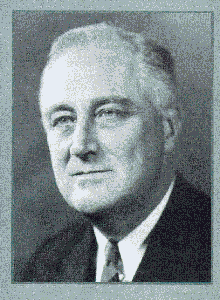
|
| Franklin Roosevelt |
The issue went far beyond one clause in the Constitution, but the commerce clause was the focus point. Under the limited and enumerated powers allowed to Congress by the Constitution was :
The Congress shall have the power to regulate commerce with foreign nations, and among the several states, and with the Indian tribes.
That used to be called the " Interstate Commerce clause" until the Supreme Court announced its decision in the case of Wickard v. Filburn. When linked with the Tenth Amendment, granting to the States the power to regulate everything not specifically granted to the Federal government, this clause in the Constitution was universally taken to mean that the States had control of commerce within their borders, while Congress would control interstate commerce. Wickard v. Filburn took all that power from the states and gave it to Congress, which henceforth would regulate commerce. John Marshall had triumphed again over the hated state legislatures, but the Supreme Court had suddenly lost much of its power to overrule Congress, too. One side had won the argument, by threatening the umpire. The umpire came away less powerful, too. No wonder the jaunty Franklin Roosevelt started annual celebrations called Jefferson-Jackson Day dinners. All three presidents disliked the Supreme Court intensely.
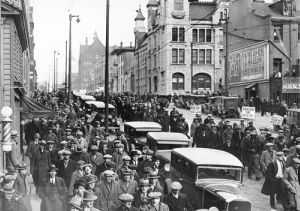
|
| Depression of the 1930s |
To describe the background, the 1929 stock market crash was quickly followed by the economic Depression of the 1930s. No financial panic of this magnitude had been seen before, and there was a political stampede to try new and untested solutions. Even government action which actually worsened economic conditions was felt justified if it conveyed to the frightened public the image that its leaders were taking firm action. Since Socialism and Communism were among the solutions being toyed with by the public, many unfortunate actions were felt justified as a way to control the Bolshevik threat, by pre-empting its promises. Many such New Deal actions were declared unconstitutional by the Supreme Court since they involved sweeping federal revisions in the way all commerce, internal to the States as well as interstate, was conducted.
The Depression and financial panic continued through the 1936 Presidential election, which Roosevelt won "in a landslide". He took this election to mean the public would support him in anything. Immediately after the start of his new term, Roosevelt announced a plan to increase the number of Justices on the Supreme Court, appointing new ones more to his liking until he achieved a majority. He was at pains to point out that seven of the nine life incumbents had been appointed by Republican Presidents. This was, of course, the restraint intended by the Constitutional Convention, almost immediately faced by Thomas Jefferson in John Marshall's court. The idea of packing the Court with new appointees was exactly what Jefferson and Jackson had tried to do. In the meantime, the case of Filburn, a dairy farmer, came up. One of the "New Deal" agencies had assigned him a quota of 200 bushels of wheat he could grow on the side, as part of an effort to raise wheat prices by reducing the supply of it. Filburn had raised 400 bushels, but consumed the extra wheat for his own personal use, hardly a matter of interstate commerce. The Court had repeatedly declared laws like this to exceed the interstate commerce limitation and were thus unconstitutional for the Congress to enact.
Well, Owen Roberts changed his position, and Filburn lost his case. But public outcry was resounding, so Congress overwhelmingly defeated Rosevelt's court-packing proposal. Although the Court would thus have won its struggle with the Executive branch if it had remained steadfast, Interstate commerce became All-commerce by the declaration of its most dedicated opponent. Forever afterward, this change of position was referred to as "the switch in time, that saved nine." and the cuteness of that cartoon caption obscured that Roosevelt had been dealt a public slap in the face. Nevertheless, since that time, the Court has rarely had the courage to rule any action of Congress unconstitutional. Furthermore, the power of the state legislatures has shriveled because all commerce (except insurance and real estate) is regulated out of the District of Columbia, with a corresponding vast increase in the size of the Federal bureaucracy, as Congress relentlessly pushed to intervene in commerce. One important footnote to this uproar was that the insurance industry was intensely displeased with the prospect of federal regulation, and within six weeks lobbied through the McCarran Ferguson Act, restoring the "business of insurance" to state regulation. This act skirted the confrontation between Congress and the Supreme Court by prohibiting federal agencies from engaging in insurance regulation, although the pretense was maintained that the executive branch was free to regulate if it could invent a way to do it.
A few weeks before he died, Owen Roberts had all his papers burned, So, we will never know whether all this uproar was the result he had in mind.
Owen Roberts: A Switch in Time
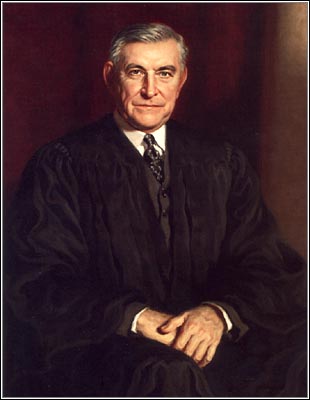
|
| Owen Roberts |
To this day, no one knows quite what to make of Owen J. Roberts, founder of one of Philadelphia's largest law firms. He was Prosecutor of the Teapot Dome scandal, Dean of the University of Pennsylvania Law School, Republican appointee to the U.S. Supreme Court. But then, he abruptly became the source of one of the most radical revisions of our system of government since the Declaration of Independence. Nothing in his prior career and nothing afterward in his subsequent civic-minded retirement from the Court seemed to suggest any radical turn of character had taken place. He has been compared with a famous baseball pitcher who threw right-handed or left-handed at will, unexpectedly, capriciously, who knows why.
The issue went far beyond one clause in the Constitution, but the commerce clause was the focus point. Under the limited and enumerated powers allowed to Congress by the Constitution was :
The Congress shall have power to regulate commerce with foreign nations, and among the several states, and with the Indian tribes.
That used to be called the interstate commerce clause until the Supreme Court announced its decision in the case of Wickard v. Filburn. When linked with the Tenth Amendment, granting to the States the power to regulate everything not specifically granted to the Federal government, this clause in the Constitution was universally taken to mean that the States had control of commerce within their borders, while Congress would control interstate commerce. Wickard v. Filburn took all that power from the states and gave it to Congress, which henceforth would regulate commerce. John Marshall had certainly triumphed over the hated state legislatures, but the Supreme Court suddenly lost its power to overrule Congress, too. One side had won the old argument, by silencing the umpire. No wonder Franklin Roosevelt started annual celebrations called Jefferson-Jackson Day dinners.
To describe the background: The 1929 stock market crash was quickly followed by the economic Depression of the 1930s. Nothing of this magnitude had been seen before, and there was a stampede to try new and untested solutions. Even government action which actually worsened economic conditions was felt justified if it conveyed to the frightened public the image that its leaders were taking firm action. Since Socialism and Communism were among the solutions grasped for, many unfortunate actions were felt justified as a way to control the Bolshevik threat. Many of these New Deal actions were declared unconstitutional by the Supreme Court since they involved sweeping revisions in the way all commerce, internal to the States as well as interstate, was conducted.
The Depression and financial panic continued through the 1936 Presidential election, which Roosevelt won in a landslide. Immediately after the start of the new term, he announced a plan to increase the number of Justices on the Supreme Court, appointing new ones more to his liking. He was at pains to point out that seven of the nine life incumbents had been appointed by Republican Presidents. This was, of course, the restraint intended by the Constitutional Convention, and the idea of packing the Court with new appointees was exactly what Jefferson and Jackson had tried to do.

|
| Franklin Roosevelt |
In the meantime, the case of Filburn, a dairy farmer, came up. One of the New Deal agencies had assigned him a quota of 200 bushels of wheat he could grow on the side, as part of an effort to raise wheat prices by reducing supply. Filburn had raised 400 bushels, but consumed the extra wheat for his own personal use, hardly a matter of interstate commerce. The Court had repeatedly declared laws like this to exceed the interstate commerce limitation and were thus unconstitutional for the Congress to enact.
Well, Owen Roberts changed his position, Filburn lost his case. Forever afterward, this change of position was referred to as the switch in time, that saved nine. Since that time, the Court has rarely had the courage to rule any action of Congress unconstitutional, even though it is true that Congress promptly and resoundingly rejected the court-packing proposal.
And furthermore, the power of the state legislatures has shriveled because all commerce (except insurance and real estate) is federally regulated, with a corresponding vast increase in the size of the Federal bureaucracy, as Congress relentlessly pushes to intervene in commerce among the several states, formerly known as the Interstate Commerce Clause. Franklin Roosevelt had a certain right to gloat at Jefferson-Jackson Day dinners.
A few weeks before he died, Owen Roberts had all his papers burned. Apparently, we will never know whether the present outcome was the result he had in mind. Since he was later the author of Alfred Barnes' will, which strenuously sought to prevent the transfer of the Barnes art collection to Philadelphia County, anything written by a lawyer can apparently be reversed by other lawyers. One would have supposed that either the Original Intent would govern, or else the opinion of the Supreme Court on what the Constitution means, would prevail. Franklin Roosevelt showed us there is a third possibility: the President can overrule the Court by intimidating it.
Seventeenth Amendment

|
| Seventeenth Amendment |
The Seventeenth Amendment of the Constitution provides for the direct election of U.S. Senators; prior to that, the states could decide for themselves how to select their Senators. The Amendment was proposed in 1912 and ratified in 1913. Today, most people have no opinion whether the Amendment was good or bad, necessary or unnecessary. The Progressives of 1912 professed to be shocked, shocked, that wheeling and dealing went on in the state legislatures every time there was a vacancy in the Senate. Indeed, few contestants on TV quiz shows would be able to tell you what the Amendment was about. It would be hard to find a person who would, without further study, be opposed to a reaffirmation of "The Senate of the United States" shall be composed of two Senators from each State, elected by the people thereof, for six years; and such Senators shall have one vote. The electors in each State shall have the qualifications requisite for electors of the most numerous branch of the State legislatures."
If you search for reasons -- why in the world would there be a fuss about this topic, 125 years after the "Constitutional Convention -- several plausible reasons are stated, all of them amounting to legislature incompetence. Such as deadlocks resulting in vacancies remaining unfilled, influence by corrupt political organizations and special interests through the purchase of legislature seats, and neglect of duties by legislators because of politics. Even though news of these matters has failed to persist in the national recollection, they seem plausible enough; it sounds like local politics, all right. But the plausibility was there in 1787, too, and surely the founding fathers expected something like that when they let the States select their Senators as they pleased. The whole idea surely was to give the states additional reassurance that they could block any further transfer of state power to the federal government; direct election of senators clearly reduced the power of state governments in the federal/state struggle. Mostly, of course, by the State Legislators selecting one of their own members to go to Washington.
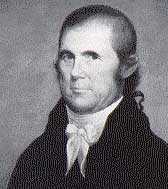
|
| John Marshall |
We have here a tilting of our governance from a Republic toward a Democracy, following the philosophy of John Marshall, of all people, that the behavior of all State legislatures everywhere will inevitably lead to mischief. Just a minute, please, let's give this a little thought. Surely the vast amounts of campaign money required to run for a Senate seat compare with the amount a special interest would have to spend to buy a majority in the Legislature of a State. As a practical matter, most special interests have lost interest in State politics and spend their money in Washington -- except for those few special interests that are exclusively State regulated. This comes down to the insurance and real estate industries, with insurance only there because of the McCarran Ferguson Act. This isn't only because of the Seventeenth Amendment, it also has to do with Franklin Roosevelt's Court-packing attempt, which is discussed elsewhere.

|
| " Plato" using Leonardo da Vinci as model. |
The idea of a Republic, originally set down by the Greek philosopher Plato, was that a small group of elite philosophers (you will have to forgive his professional biases) who meet together occasionally, would be better able to pick a member of their group for higher responsibilities, than would the populace. The inner circle would know who was an alcoholic, a phony, a pervert, a coward or a loafer, whereas these qualities can be concealed from mass audiences long enough to get elected. Such an in-group in a legislature may pick a bad person, or deliberately reject a good one, but they do it on purpose, not because they are fooled. The issue of direct election of Senators comes down to whether you think it is more likely that a legislature will be corrupt, or the voting population will be ignorant. Hard choice.
Meanwhile, election to the State legislature has been reduced to an inconsequential backwater, almost guaranteed to have an adverse effect on the members. There was a time when people who wanted to be U.S. Senator knew they must first run for the Legislature, where their skills could be tested and perfected. National affairs became State affairs, with legislators well aware that they could unseat a Senator whose national behavior displeased them. There are many States, Pennsylvania among them, who collectively pay far more federal taxes than they receive in federal benefits. Call it pork barrel if you like, the present degree of interstate wealth redistribution could not possibly continue at present levels if we repealed the XVII Amendment.
Patent Pending
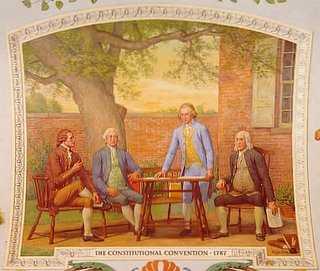
|
| Constitution |
Most of the members of the Constitutional Convention of 1787were also members of the early Senate and Congress during the time when Philadelphia was seat of government. The Constitution had made provision for copyrights and patents "for a limited time", and the early Congresses fixed a reasonable time as seventeen years. A couple of years ago, Congressman Bono sponsored a law, widely supposed to be for the benefit of her constituent Walt Disney extending the time to 99 years. Since the creation of monopolies for a limited time was stated to be for the purpose of encouraging innovation, lawsuits were promptly filed with the contention that 99 years was essentially unlimited, and in any event, would throttle innovation. In the Eldred case, the U.S. Supreme Court reluctantly held that it was up to Congress to decide how long was a limited time, meanwhile expressing its dismay at the earlier Congress which had allowed the time to be so extended by what is widely reported to be a log-rolling contest among lobbyists. The disgust of the Supreme Court was very thinly disguised in its opinion, which quite obviously hoped for Congress to take another look at what it had done.
So now the question arises, of how such a strange provision got to be in the Constitution in the first place. The >members of the convention were mostly farmers and plantation owners, quite recently returned to civilian life after struggling with King George III over governmental intrusion into trade and commerce. Why ever would these people, who were otherwise so parsimonious in their rules and principles, think to intervene in patents and copyrights? It has been suggested that Thomas Jefferson, who was a writer and an inventor, might have been the source of this provision. Unfortunately, Jefferson was three thousand miles away during all of the Constitutional Convention, and was quite dismayed with the completed Constitution when he later returned.
It's a job for some graduate student in American History, looking around for something to write his thesis about. James Madison kept extensive secret diaries of the interior arguments at the Convention, and Benjamin Franklin's Collected works run to over eighty volumes. Surely, among all those scribblings by quill pens, can be found some revealing references to the originator of the bizarre little patent clause. And if it turns out to have been anyone except Ben Franklin, it will be a great surprise. Surely there is a broad hint in the fact that for many years the Franklin Institute essentially was the U.S. Patent Office. Just think for a moment of the value of holding a patent on the invention of electricity. Makes Microsoft seem rather trivial. And as for a comparison with Mickey Mouse, well, really.
Lindbergh Baby Kidnapping Trial
 |
| Lindberg |
In 1935, Bruno Hauptmann was executed for kidnapping the baby of America's "Lone Eagle". Swarms of competing police and reporters made chaos of the scene, and Charles Lindbergh made it all worse by dealing directly with the crime underworld. Even today, some question the guilt of Hauptmann, and even whether the baby is really dead.
We are indebted to George Hawke, who went to prep school near the scene of the crime, for becoming an expert, perhaps the preeminent expert, on the Lindbergh Baby Kidnapping Trial. Charles Lindbergh, the son of a midwest pro-German congressman, flew an airplane alone across the Atlantic in 1927. He became instantly famous, wrote a best-seller called Alone, became Colonel Lindbergh, married Anne Morrow the daughter of Senator Morrow of New Jersey. That's how in short order they came to settle in Englewood, New Jersey, and also could afford an elaborate country place in Hopewell, Hunterdon County. That put them physically at the northern edge of the Philadelphia region at least on weekends, although psychologically they remained part of the New York scene, where many people attracted to publicity seem to gravitate. In 1932 they had a 19-month old son, John, who one evening disappeared from Hopewell, apparently kidnapped.
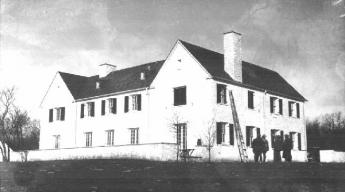 |
| Charles Lindberg Home |
What followed was a Keystone Kops Komedy in the midst of a publicity storm. The local, county, and state police, plus the FBI struggled with each other for the fame of solving the case. Newspaper reporters from all over the country swarmed down the little country road to set up shop. To illustrate the consequences, a home-made ladder was found sixty feet from the house, but no fingerprints were found by the first investigators. By the time the last investigators were done, the ladder had 150 sets of fingerprints on it. Police involvement on all levels can be summarized as a frenzy to be first to solve the case, followed in time by a frenzy to avoid being known for failing to solve it.
Although most of us eagerly following the case were unaware of it, the Colonel decided to take matters into his own hands. As a new celebrity, he was surrounded by many new best friends, and it was suggested to him that he should put out feelers into the Underground, the Mafia Mob. He would pay a ransom, and no questions would be asked. Somehow, a Bronx school principal, Dr. John Condon, was designated to respond to feelers, among them a particularly likely one, from a man who demanded to be met in a cemetery at night. As proof that the baby was still alive, the cemetery lurker sent Dr. Condon the baby's sleeping suit. Ransom was then paid in cash, unmarked, but entirely in gold certificates which had stopped being issued after President Roosevelt took us off the gold standard. The serial numbers carefully recorded. The extortionist then disappeared from sight, and the baby was never heard from again.
As time passed, two things happened. A partially decomposed baby's body was found buried a couple of miles from Hopewell, although it must be admitted it was only a quarter of a mile from an orphanage. The baby's pediatrician could not identify the body, although at the trial others claimed to make such identification. The baby's skull had been fractured, but several detectives had been seen turning it with sticks. The other development was that gold certificates bearing the recorded serial numbers began turning up in the Bronx.
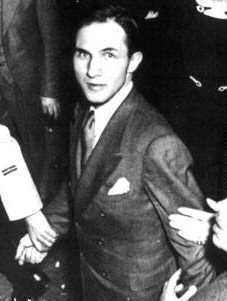 |
| Bruno Richard Hauptmann |
Bruno Richard Hauptmann was apprehended at a filling station after passing a ten dollar bill of the ransom money, and when his house was searched, $14,000 more was found hidden. The police had their man. To say that the house had been searched thoroughly was quite an understatement, but a number of detectives said there was no visible disturbance in the attic. Later on, a rung of the homemade ladder found at Hopewell was found to have exactly the same grain pattern as a piece of attic floorboard, now found to be missing in the Bronx house. Although there was testimony that Hauptmann had been beaten with a hammer, he was deemed a highly suspicious character. He had a criminal record in Germany, and was in this country illegally after jumping ship.
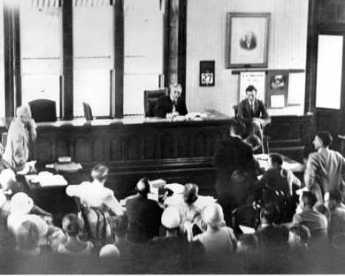 |
| Lindberg Trial |
The Trial of Bruno Hauptmann in the Hunterdon County Courthouse at Flemington was a tumultuous circus. The state of New Jersey spent well over a million dollars on the prosecution, while Hauptmann spent $2900 on his defense, most of it provided by a newspaper, and most of it spent on a defense lawyer who appeared before a jury of farmers dressed in a cutaway, wearing a Carnation and Spats, and who told people in a bar that Hauptmann was anyway guilty. That lawyer seemed visibly inebriated much of the time, and often walked down the main street with a girl on both arms. Miles of new telephone wire were strung into the courthouse area for the reporters, and two switchboards were provided.
There were legal difficulties. At that time in New Jersey, kidnapping was only a misdemeanor, so accidental death in the course of kidnapping was not a capital offense. The Lindbergh Kidnapping Law was hastily enacted to make kidnapping a federal felony, but for the purposes of this trial, it was necessary to prosecute Hauptmann for the crime of Burglary of the sleep suit, with accidental death in the course of that burglary. Hauptmann steadfastly, and to some convincingly, denied everything. He was keeping the gold certificates for a friend.
The jury was understandably confused by all this, but it looked to them as though Hauptmann was surely guilty of something, perhaps extortion, and for all the jury knew Congress would now pass a special law about that, too. The defense did not make enough of the sleep suit, but all the jurors surely knew that such garments could be bought in any department store. There was even some question whether the Lindbergh Baby might not be dead at all, but the fact remained that Hauptmann was definitely guilty of something. He was electrocuted, and the newspapers made a great fuss about that, too.
Sorry, But This May Hurt a Little

|
| Dentist Tooth |
Quite beyond sociological curiosity about what makes one patient sue when many seemingly identical ones do not, is the alarming potential of indemnifying them all. If the tort system already generates unsupportable costs from a small sample, extending those costs manyfold defies all prediction. Something like this happened in asbestos litigation, and that industry seems utterly destroyed. We will later list this issue among the areas most in need of more reliable data, not jibes and denials. Lacking that, concepts of no-fault or alternative dispute resolution must definitely be restrained from going forward. If ninety or more percent of medical injuries are accepted by the patients as simply inevitable in a highly complex system of well-trained professionals doing their best to avoid harm, that is gratifying to hear until the consequences are examined. Take away the courtroom's implication of blame, and almost all such cases would come forward to request what society then declares is their just compensation. That would be an entitlement to end all entitlements.
The Supreme Court Gets Fed Up With Professors
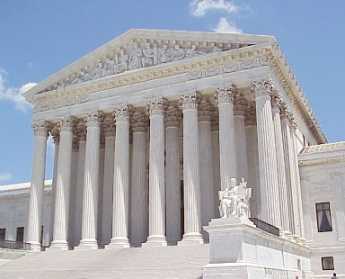
|
| Supreme Court |
In March 2006, years later, the Supreme Court, like a sleeping alligator, suddenly clamped its jaws on the whole Ivy League. Unanimously and without explanation, the Court told Universities they could not block the U.S. Armed Forces from recruiting on their campuses. A number of Ivy League Universities, in this case, the Yale Law School, had turned away Army recruiters because the Professors were offended by the Army's "don't ask, don't tell" policy on homosexual soldiers. The Supreme Court didn't even consider the reasons for the University's' policies, although private opinions of the Court conservatives could readily be imagined. The Court would not even dignify the matter with the thunderous phrases about first principles which otherwise might have seemed tempting. The Chief Justice signed the order, the Court unanimously agreed, and that's as final as you are going to get, for a show of power.
About a month earlier, things had seemed to be going the other way. The Harvard Faculty had forced out their president, Lawrence Summers because he violated their idea of politically correct speech. Quite significantly, two-thirds of the students took the side of Summers in the dispute, a warning that the faculty was getting itself into an isolated position. And if you look back, the nation had divided when it twice elected the younger George Bush, support for East Coast urban elitism was likely coming to the end of a fifty-year dominance of American life. Not to put too fine a point on it, the country was getting tired of the bitter-end Vietnam War protesters, now entrenched in academic strongholds like Robert the Bruce. It may well be that the country was irked by expensive gasoline, French disloyalty, and Middle East intransigence, while the Legal profession was having a private quarrel. Clever of the Chief Justice to allow people to think what they pleased. The Constitution directs the Armed Forces to defend us; interfering with recruitment is at best impertinent, at worst imperils the nation.
The Supreme Courts of the various states and the U.S. Supreme Court within the federal court system retain the power of administration of all the courts which report to them, but they rarely exercise that power actively. As the number of judges has increased significantly in the past thirty years, public oversight of the selection or election of judges has been stretched to the vanishing point. The result has been a strengthening of political control over the courts, a lessening of the quality of the judges themselves, and a growth of the influence of law schools. The same parade of professors keep appearing as friends of the court, the metropolitan newspapers can always count on them for Op-Ed pieces on difficult topics. Their opinions begin to surface as their graduates start to enter law practice. Slowly and relentlessly, the viewpoints of faculty members of the five prestige law schools have come to challenge, and sometimes to up-end, the rigidly organized opinions, right or wrong, of judge-made law. When it reaches the point where law schools can blithely block the ability of the armed forces to defend the country from foreign attack, it is past time to do something about it.
Some things never change. But this is going to change, and soon.
Let's Give the Supreme Court Some Help
For
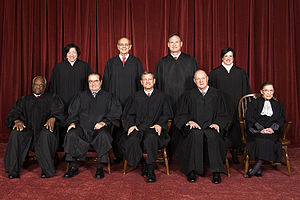
|
| Supreme Court, 2017 |
all the current wrangling about abortion, it continues to be implicit that the U. S. Supreme Court has a problem, which the Court needs to settle. But in fact, the Court didn't create the whole problem. The Court doesn't need to solve all of it.
First of all, privacy. That word doesn't appear in the Constitution, but surely no one is opposed to making privacy a right. Even
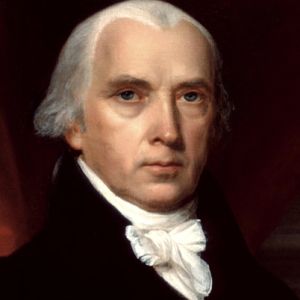
|
| James Madison |
James Madison wasn't opposed to the idea so much as he wanted to avoid cluttering the Bill of Rights with unnecessary detail. Unfortunately, circumstances have now changed enough to make it useful to be explicit about a strictly defined right to privacy. Since no one is truly opposed, what harm would there be in passing a bill in both the House and the Senate, and then having the required number of states ratify it? Once both sides got over the suspicion that somebody was trying to put something over on them, it should be possible to design simple clear language that creates and defines the right to privacy -- and avoids the temptation for somebody to insert some sly wording that does in fact put something over on somebody else. At the very least, creating a written right to privacy by following the prescribed path for amendment should dispel the idea that the abortion issue is part of an elaborate effort to undermine the Constitution.
By itself, this hypothetical amendment would seem like a rebuke to
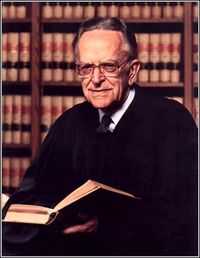
|
| Justice Blackmun |
Justice Blackmun and the rest of the Supreme Court. It needs something else added in order to look like a compromise, which it is. So, what's proposed further is a declared presumption that state laws written before 1890 which forbid the performance of abortion were written with the intent of protecting the health of the mother.
That seems to be historical fact. There was a forty-year window of time between the invention of anesthesia, which made abortion easy to do, and Lister's invention of aseptic technique,
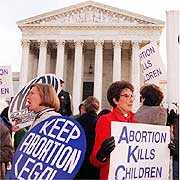
|
| anti-abortion |
which make abortion safe. The anti-abortion crusade, led by the American Medical Association, took place during that window of time. The AMA was alarmed by the medical disasters it was witnessing and urged legal measures to curtail it. When the safety issue was resolved by Pasteur and his followers, the AMA greatly softened its position. It is now surely true that more mothers are protected by abortion than harmed by it. If the courts have a role in untangling this mess, it is to recognize that the original intent of the anti-abortion laws has become lost by ignoring the changed scientific situation.
Well, where would this leave us? It should get privacy out of the issue, by making it clear that the right to privacy in the new amendment is not to be stretched to legitimize
just anything that people want to keep private. Murder, for example, is something everyone might well wish to hide but could hardly be legitimized by a right to privacy. Nor is defecation, which everyone wishes to keep private, to be prohibited just for that reason. Abortion could be constitutionally established as something people have a right to keep private, but abortion -- other than to protect the health of the mother -- is not legitimized or de-legitimized by saying so.
Does teasing out the sophistries then settle the question of abortion? No, but it would reduce the problem to its essence. By the process of teasing away the irrelevance, abortion then becomes a process which is safe, easy to do, and legitimate whenever it protects the health of the mother. Whether to prohibit it when it lacks those features would be a decision for the individual state governments, so long as the threat of public exposure is not used as an enforcement weapon, as every reader of Hawthorne knows it has been.
Perhaps we can even imagine the day when stripped of emotional demons, abortion can be viewed as a rather cumbersome contraceptive method, currently resorted to far more frequently than is sensible.
Look Out For That Ship!
 Tales of the Sea abound, even a hundred miles from the ocean. 
|
We are indebted to the President of the Maritime Law Association of the U.S., Richard W. Palmer, Esq. (who unfortunately died in March 2017 at the age of 97), for both a strange definition and an amusing story. An "allusion" is a collision between a ship and a stationary object, such as a bridge or a dock. As you might imagine, the ship is almost invariably at fault, mainly through errors of the pilot, although hurricanes and other severe weather conditions can make a difference. Moving ships have been running into stationary objects for many centuries, and almost every allision contingency has been explored. Ho hum for maritime law.
The Delair railroad drawbridge over the Delaware River at Frankford Junction is just a little different. It was built in 1896 when the Pennsylvania RR decided it needed to veer off from its North East Corridor to take people to Atlantic City. For reasons relating to the afterthought nature of the bridge, the tower for the drawbridge is located half a mile away, out of a direct vision of the ships going through. Also, a late development in the history of the river was the construction of U.S. Steel's Morristown plant, bringing unexpectedly huge ore boats from Labrador to the steel mill. The captains of the ships pretty much turned things over to the river pilots, for the last hundred miles of the trip.

|
| Delair Railroad Drawbridge |
Shortly after this iron ore service was begun, the inaugural ore boat Captain had a little party with some invited guests. So it happened that the Commandant of the Port, the Admiral in Charge of the Naval Yard, and other equally high ranking worthies like the head of the Coast Guard were on the bridge of the ore boat, taking careful notes of the procedure.
The ship tooted three times, the shore answered back with three toots. In real fact, they were connected by ship-to-shore telephone for most of the real business, but this grand occasion called for an authentic nautical ceremony. Three toots, we're approaching your bridge. Three toots back, come ahead, the coast is clear. The admirals scribbled it all down.
As the ship approached the point of no return, beyond which it could no longer stop or turn in time to avoid an "allusion", the people on the bridge were appalled to see a train crossing the bridge ahead. Several toots, loud profanity on the ship to shore phone.
No worry, answered the bridge, we'll lift the drawbridge in plenty of time. But half a minute later the bridge controller made the anguished cry that the drawbridge was apparently rusted and wouldn't open, to which the captain shouted, "This ship is going to take away your blankety-blank bridge and sail right through it".
At this point, the pilot took matters into his own hands, and violently threw the rudder hard left, swinging the ship sideways, soon nudging the bridge with some damage, but nothing like the damage of a head-on allision. The lawsuit, as one might imagine, was the outcome.
The attorneys for the railroad were pretty high-powered, too, and had piles of legal precedents to cite. But they were quite unprepared for Dick Palmer to put the Commandant of the Port on the witness stand, reading slowly and painfully from his very detailed notes about the conversations on the bridge, about the approaching drawbridge.
And so, Philadelphia can now claim to have experienced one of the very few instances where a ship ran into a bridge -- and the court found the bridge to be entirely at fault.
The Economic Power of Laws
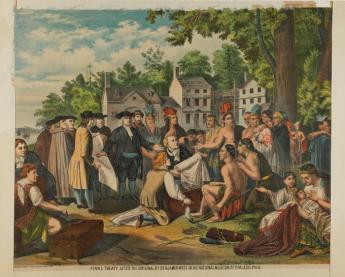
|
| William Penn Treaty |
Philadelphia is tucked down in the Southeast corner of Pennsylvania, right next to Delaware and New Jersey. All three states once belonged to William Penn and started out Quaker dominated. In time, they settled down to a life of independent states, and with the growth of population plus speed of transportation, they are all getting smudged together again. The Quaker influence is there if you look for it, and rather fierce, even hostile, political competition between the states is there, too. But if you were a foreign visitor who doesn't look at maps, you could drive around the metropolitan area without knowing which state you were in. To a large extent, the Rand-McNally lines are a hindrance to commerce and convenience, but they have their value. The quirks of political jurisdiction give the Philadelphia metropolitan area six U.S. senators, and the opportunity to take shrewd advantage of the three legal systems. You can buy things without a sales tax in Delaware, and estate tax lawyers tell me that if you must die, die in Delaware. At one time, New Jersey was a great place to get an uncontested divorce, Pennsylvania a better place to start an unincorporated business. More recently, the New Jersey doctors are complaining that malpractice rates are unbearable, but they are not as bad as they are in Pennsylvania, and it is rapidly becoming true that if you are going to be born, you will need to be born in New Jersey because the obstetricians have all moved there. That's also true in the District of Columbia; obstetrics has just about entirely fled to Virginia. Better watch out where you have your auto accidents, too. Neurosurgeons and orthopedists have also responded to the local disincentives to live near certain types of juries.
Long ago, James Madison designed things this way on purpose. The main author of our constitution hated taxes and oppressive government as much as any other founding father and argued it was a good thing to let neighboring states have differing laws. Corporations which do interstate business hate the complexity of course, but as Madison argued, people do shift their business, their businesses, and even their residence if the neighboring states become too extreme in their differences. It's still worth a thirty-minute drive to buy silverware and China in Delaware, and if you are driving to the New Jersey shore, you ought to fill up your gas tank on the Jersey side of the bridge. At one time, there was a thriving resort town in the Jersey woods, mostly entertaining people who needed a spell of New Jersey residence to be eligible for New Jersey divorces.
These things respond to local circumstances fairly rapidly. I once met a man from the Delaware Chamber of Commerce who boasted that the Chamber could get a Delaware law changed over a weekend if it had some particular commercial advantage. Governor du Pont saw the bigger advantages of this flexibility and got some laws enacted which drew most of the big credit card companies to Delaware, and at least a branch of all the big national banks. Delaware is starting to emulate Lichtenstein , and fairly successfully.
The effect on Philadelphia banking has been disastrous. Once the banking center of the whole continent, Philadelphia now does not have the headquarters of a single major bank. True, banking is becoming an obsolete industry whose products no one really wants, but the particularly severe effect in Philadelphia comes from the fact that if you were going to have a big bank in the metropolitan area, you would have it in Delaware.
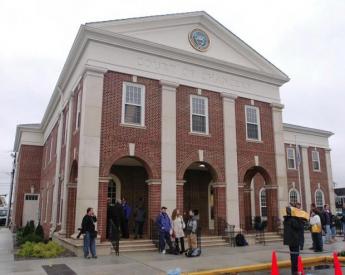
|
| Delaware Courts |
The location of so many corporate headquarters in the little state attracts lots of outside lawyers, of course, and it puts a heavy burden on Delaware Court of Chancery, the court for corporate disputes. The judges are appointed by the governor, and it doesn't take all that much outside money to lean on the governor, so the nation's giant corporations are at the mercy of a very small group of local politicians. The politicians, on the other hand, operate freely in an environment where comparatively few of their constituents have any interest in the goings-on of major corporations from far away.
It's an interesting thing that the legislatures of all three formerly Quaker states are torn with sectional disputes. In Pennsylvania and Delaware, it's the cities against the farmers. In New Jersey, it's the North versus the South. All states are having a hard time balancing their budgets in a recession, but somehow New Jersey has worse deficits than the others, and therefore more quarrels about taxes. The northern politicians dominate the legislature, and the south feels it is often the victim of state laws designed to help the North in its constant war with New York City. Ever since 9/11, the financial district of New York has been sending its subsidiary employees to safer cheaper regions. That might have meant going to New Jersey, but the tax flounderings there have led to many of those relocations going on a few miles to upstate Pennsylvania. You don't ordinarily think of Scranton as a financial center, but take another look. Madison, no doubt, would smile at the tendency, but wrinkle his brow at all the unintended consequences. At least, everyone in the region speaks English more or less, otherwise, the European Common Market could learn a lot from studying our local scene. About fifteen years ago, there was actually an unsuccessful provision on the ballot for South Jersey to secede.
The Supreme Court Revisits Girard's Will
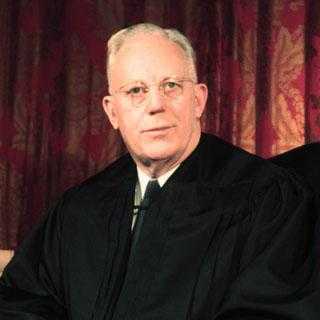
|
| Chief Justice Warren |
In the 1954 case of Brown v. Board of Public Education, Chief Justice Warren wrote an opinion for the U.S. Supreme Court (347 U.S. 483), overturning the 1896 doctrine of "separate but equal" in public school systems which the Supreme Court had laid down in Plessy v. Ferguson, 163 U.S. 537. Warren famously declared that separate was inherently not equal. The Brown decision did not extend to all public accommodations, or even to all schools. It was limited to public schools. Furthermore, in explaining why it took half a century for the Court to discover this principle, Warren pointed out the schools in the South were largely private schools at the time of the Plessy opinion, since the movement toward free common schools, supported by general taxation, had not yet taken hold. The central point in all this was that Brown desegregated public schools and nothing else. Therefore, when the case of Stephen Girard's will ("poor, white, orphan boys") came back before the Court, the issue was whether Girard College was a public school because Girard's will designate the City and State to appoint the trustees.
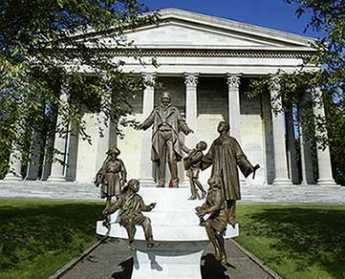
|
| Girard College |
The first black plaintiffs to seek admission to Girard College, at least in response to the Brown v. Board decision, were represented by Raymond Pace Alexander, a black member of Philadelphia City Council. Alexander maintained that the College's racial discrimination, employing the supervision of City and State governments, was unconstitutional. Since Alexander was plainly interested in the education of black students generally, it was important to stress the public school issue. Otherwise, invalidating many wills, and the policies of many private schools, would have been harmful to black students. For example, the Annenberg Foundation has donated $52 million to the United Negro College Fund, the W.K. Kellogg Foundation: $58 million for higher education for Hispanic and Native Americans, the Lilly Endowment: $92 million for the Hispanic Scholarship Fund and United Negro College Fund. The largest such private racially segregated donation is from Bill and Melinda Gates: $1 billion annually for 20 years for full scholarships for black, Hispanic, Native American and Asian students, seeking degrees in engineering, mathematics, science, and education. In the course of protracted litigation, it became clear that the Supreme Court's Brown decision could not be completely reconciled with its 1844 decision (Vidal v Girard Executors, 43 U.S. 127, upsetting the arguments of Daniel Webster) reaffirming all the language of the Girard Will. Girard made Girard College an essentially private school financed by private money. But the choice of the City and State to appoint trustees did create a degree of public involvement. Faced with challenging litigation, the courts would have to invalidate some feature or other of the will to maintain strict conformity with Brown v. Board of Public Education. Which choice -- admit black boys and girls, or find a different way to appoint trustees? Since the trustees selected by other means would very likely be exactly the same people, the choice seemed an easy legal one. The political choice was more difficult.
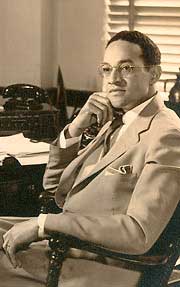
|
| Raymond Pace Alexander |
At first, the Supreme Court seemed to be taking the approach of changing the method of selection of trustees. They deflected (remanded) the matter to the Pennsylvania Supreme Court, which in turn remanded it to the Orphans Court in parallel with a newly-legislated power of the Orphans Court to appoint substitute trustees. The Girard case was headed for the conclusion that Orphans Court should either appoint new trustees or define a way to appoint them. Without the political appointment of trustees, Girard College was a fully private institution, unconcerned with the constitutionality of the Plessy decision, or with the Brown repeal of it.
However, further litigation ensued, with a new focus for the U. S. Supreme Court to ponder. The contention was made that Girard had two purposes in mind when he wrote the will. He wished to help the poor, white, orphan boys. But he also stated that he truly had the welfare of Philadelphia at heart, wishing to foster the prosperity of the City and the health and comfort of its inhabitants. Were these two distinct goals, or was the education of certain orphans a mechanism to enhance the welfare of the City? Involving the leading men of the city in the governance of the College, and acquiring the power and influence of its leading politicians might strengthen Girard College in many important ways. Could it be that the words about the general welfare were more than merely lawyer's boiler-plate? While the general public at that time and subsequently may well have regarded these pleadings as pretty specious, the critical audience for this case was made up of lawyers and judges, politicians and officials. The sitting judge had once volunteered to defend officers of the Communist Party against the charge that they advocated the overthrow of the government by force, so he was not afraid to adopt unpopular opinions. There has been no claim he was himself a Communist. But the viewpoints of immensely rich merchants were likely of secondary importance to him, especially by comparison with City Councilmen.
Judge Joseph S. Lord, in what turned out to be the final judicial opinion, seemed to emphasize a slightly different slant. If Girard had to make the choice now facing the court, between poor, white, orphan boys, and retaining the City as his surrogate trustee, Girard would have made the choice to retain the politician trustees. If that seems unlikely to a great many people, let's help him out a little. Let's suppose Girard the financial wizard could have the benefit of reviewing the first century of actual experience with his will. Is it not defensible to contend that the remarkable investment administration of the Board of City Trusts -- arguably just as effective as his own would have been -- would hold great appeal for this star of American investing? Would it not have been persuasive to this notorious micro-manager, that the quality of schools eventually depends more on who runs them, than on who is in attendance?
In any event, by 1968 after a long and complicated legal battle, the first black students were admitted. The case had reached the US Supreme Court, which declared the provisions of Girard's will were superseded by the Brown decision, and therefore the Trustees were permanently enjoined from denying admission of poor black orphans on the sole ground that they were not white, provided they are otherwise qualified for admission". In a second decision, the Court later added a second prohibition against the trustees denying admission to females.
The U.S. Supreme Court carefully specified that the trustees were the objects of its ruling since they were appointees of the State and Municipal government. In part, this precision had the effect of preserving the 1844 decision of the Supreme Court, upholding the provisions of the Girard will against Daniel Webster's assault, on behalf of Girard's other relatives and potential heirs. By taking a strict focus on the governmental appointment of the trustees, the Supreme Court was able to skirt the awkwardness of continuing the unhampered existence of a considerable number of estates and foundations devoted exclusively to the benefit of minorities.
Malpractice Epidemic?
 The best way to avoid malpractice suits is to avoid committing malpractice in the first place 
|
| The Tort Bar |
Plaintiff lawyers, responding to increasingly effective attacks by the medical profession, retort the best way to avoid malpractice suits is to avoid committing malpractice in the first place. That's more jibe than a serious argument. But if it seriously intends the implication that increased volumes of medical malpractice cases signify increased levels of incompetence, that is unlikely to be true. Medical school applications have become almost incredibly selective for talent (sometimes reaching a level of 12,000 applicants for 200 places), the duration of postgraduate medical training is regularly protracted by several years after the four years of medical school, and legislation is actually being considered to compel these over-achieving trainees to work shorter hours so there can be no legitimate excuses for performance that isn't absolutely tip-top. It seems much more likely that this intensely competitive training environment has pushed medical standards to overly exacting levels of constant self-criticism, which is cited by censorious expert witnesses to imply that only a scoundrel would fail to measure up. In fact, most of the problems grow out of the snide comments of economic competitors, advertising their differing positions in the chain of information transfer.
As far as net effectiveness is concerned, the basic goal for medical care is to prolong human life. Whatever the medical profession has been doing during this alleged epidemic of negligence, people are apparently living longer in spite of it. In 1900, life expectancy at birth in retrospect was forty-seven years. In 2005, it is predicted to be seventy-seven years for infants born today, a gain of thirty years in a century. So to speak, the average person annually lived 16 months when predicted at birth to live only 12, and kept it up every year for a lifetime. During no other century has that ever been true. Despite an alleged malpractice epidemic, remember, allegedly getting worse every year.
So the medical profession takes offense at the surge in malpractice lawsuits, which we feel are unwarranted and ungracious. Congress and the public also need to see that rousing a respected profession to offended self-pity makes it much more difficult for leaders of the medical and legal professions to work together for dispute resolution, continuing quality improvement and effective peer review. The leadership of the medical profession has come to feel that the leadership of the legal profession has neglected its own self-policing duty. In almost every state every year, the number of lawyers disbarred is many fewer than the number of physicians losing their licenses. To imply that the standards for admission to Medicine are lower than the standards of admission to law school is not a statement supported by evidence. Nor is there evidence that self-policing by a conscience-driven profession is less effective than persecution by those who are paid to be censorious. Some research institution is challenged to examine a view widely held by the physician community: the graduates of mainly low-ranked law schools are chiefly responsible for attacking the performance of graduates of the highest-ranking medical schools, so class warfare also infiltrates this issue. These are all perhaps unhelpful rejoinders, and the risk of their further escalation is itself major justification for shifting priority from long-term reform, toward quickly cooling things off.
Malpractice: Insurance War Stories
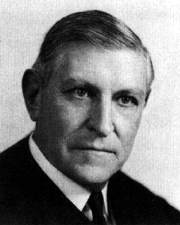
|
| ROBERTS |
The 1937 Supreme Court (Owen Roberts, for the majority) allowed Franklin Roosevelt's New Deal to place the federal government in charge of all American commerce, not merely interstate commerce as the "commerce" clause of the Constitution provides. Congress, however, soon exempted the insurance industry from that federal control by passing the McCarran Ferguson Act. States were thus put back in charge of insurance, and it's about the only commerce they are in charge of. Out of this peculiar political anomaly, grows the present uncomfortably deep penetration of the local insurance industry into state politics. And over time, the unanticipated deep penetration of state politics into insurance.
In return, state governments have conferred at least one favor on insurance lobbyists unwisely. If an insurance company fails, subscribers angrily find themselves stranded. The patchwork solution arises, of assigning the obligations of a failed company to its surviving competitors. With no immediately visible cost to the taxpayers, that seems to rescue the subscribers. But it removes any point to competition, eventually raises premium prices, and overall, broadcasts moral hazard. That is, it doesn't matter how badly they behave, their competitors will have to pay for their mistakes. Moral hazard is the most insidious form of political corruption because it is so seldom punished.
Politically inclined state insurance commissioners have other favors to extend. Malpractice companies work in an environment with a peculiarly long tail. (Translation: It's at least six years before the average case is finally settled and paid.) A brand new insurance company collects premiums for six years before paying out much for claims. True, with unrealistically low premiums they are destined to go bust in six years, but there's a free ride in the meantime, including an available punt in the stock market with unspent cash. Investment income during those six years is chancy, making survival a gamble after six years. Lately, the true finances can be obscured by "finite reinsurance", which guarantees to absorb heavy losses, but often neglects to announce how briefly it will do so. It's the job of the Insurance Commissioner to decide whether premiums are realistic, the job of the auditors to assure that the complexities are transparent, the job of the competitors to complain if premiums are too low, and the moral hazard for the Insurance Commissioner arises -- from knowing in the worst case it won't matter to the subscribers, the competitors will bear the cost. Since Insurance Commissioners are usually politically appointed young lawyers, competing insurance companies are actually in political competition, not economic competition. As we say in Pennsylvania, you must Pay To Play.
These seamy realities can unexpectedly exploit premium differentials between medical specialties. There are a lot of lawsuits against obstetricians, neurosurgeons, and orthopedists; consequently, the premiums for these specialties are quite high. Pediatricians and general practitioners have low premiums reflecting infrequent lawsuits. Now, it might be supposed a company seeking long-term profitability would prefer to ensure clients who don't get sued. But here and there you can be surprised to see a new company with great eagerness for high-risk clients, people who get sued a lot. This paradox rests on the quick accumulation of big-ticket premiums from a mere handful of clients. Competitors are prompted to suspect companies with that behavior are looking to accumulate as much premium revenue as possible during a six-year free ride, even lowering premiums somewhat to generate business. But if they misjudge the stock market during those six years, all the other competing companies will likely be forced to pay for the gamble.
Once in a while, the totally unexpected happens. For example, some years ago thirteen judges in one city went to jail for accepting bribes. The Republicans wouldn't appoint Democrat judges, and the Democrats wouldn't confirm Republican appointees to fill the vacancies. During this impasse, Congress happened to pass a law leap-frogging drug offender cases ahead of everything else on court dockets; the unanticipated consequence was an eight-year period without malpractice trials. It became a sort of judicial coiled spring. Insurance companies accumulated huge reserves, the politicians squeezed down the excessive premiums as "windfall profits", money was made and lost in the stock market, and when finally the judicial logjam was broken, the cases had to be paid. Guess what. There wasn't enough money to pay the claims, and premiums took a big jump. Doctors and lawyers bellowed at each other that it was the other profession's fault. In a sense, that wasn't fair either way, although come to think of it, most judges are lawyers. As are most legislators. And Insurance Commissioners. These particular lawyers may not have participated in the problem, but only they are in a position to fix it.
Malpractice: Reported Medical Errors

|
| Wall Street Journal Errors |
A recent article in the Wall Street Journal reports the state of Minnesota releasing a survey of 378,544 surgeries performed in the hospitals of that state in a 15-month period. During that time, 99 serious medical errors were found, 21 of which resulted in the death of the patient. One error in about four thousand surgeries, and one death in twenty thousand. Because of an understandable reluctance to self-report mistakes, assume this incidence of negligent errors is a bare minimum level of the true incidence. But arbitrarily doubling that to a rate of one death in ten thousand, would be a safety record that calls the malpractice crisis to account. Minnesota is somewhat special, to be sure, frequently held out as demonstrating the lowest medical costs in the country. So go on, then, say the rest of the country has one death in five thousand surgeries. You might be very risk-averse to feel such an incidence warrants destroying our present medical system, imposing some new one with unknowable risk content. That's especially true if you recognize that average American life expectancy got four months longer during those fifteen months. One way to reduce the number of errors would be to perform fewer surgeries, but there are ways of measuring the harm that would do. It's not ever comfortable to defend any error, but it really is necessary to examine the full consequences of any proposal about them.
Let's extend these examples. Since there were only five fatal medication errors in 400,000 Minnesota surgeries, then fatal medication errors must be impossibly rare. An event that only occurs once in eighty thousand cases must represent very special circumstances when it does happen. If people are of the mindset to take 79,000 successful surgeries for granted while applying the most pejorative scrutiny to one case that was unusual, there is no way statistics can change a mindset that the medical system is riddled with error.
My own reaction to these bare statistics is that if there really was only one death from a medication error, there must have been five hundred near-misses. I would conjecture the persons making these mistakes probably caught them before they got serious most of the time, perhaps four hundred times. And then one or two other people caught it most of the rest of the time, leaving the last few cases to escape by pure luck, and one unlucky person making it through to the statistical report. Over a period of two centuries, the hospital has developed systems for catching errors, and most of the systems depend on redundancy. We in hospitals do almost everything three times, screening out a huge amount of human error under stress. Any efficiency expert worth his stop-watch can see repetition and overlap, redundancy, and\waste. Focused factories, as Professor Herzlinger of Harvard styles them, can easily save money by enforcing a discipline of doing it once, and doing it right the first time. That saves money, and that's not a minor issue. But if we yield too far to this pressure, some of those other five hundred medication errors are likely to prove fatal.
A modern hospital employs several thousand employees, of varying levels of skill and training, with a great deal of employee turnover. An occasional incorrigibly incompetent employee can occasionally do real damage before being identified and dismissed. In recent years professional shortages in critical areas can force some substandard employees to be tolerated longer than they should be. By encouraging longer stretches of employment, a congenial slow-paced environment can reduce the incidence of errors but then look out for those efficiency experts. And crowded, tense anthills of activity must perform all day and all night, weekends and holidays. Emergencies appear out of nowhere, the door to the ambulance entrance banging open to a cluster of shouting excited firemen. They can appear at a moment when every single employee is lashed to a heaving deck of other necessities, or wearily starting out the door at the end of a tumultuous day. Some other pious professor or earnest newspaper columnist offers the non-helpful suggestion that we would perform better if we got more rest. What suggestions might be valuable to reduce stress when the loudspeaker blares, Code Blue?
Malpractice: State or Federal Problem?
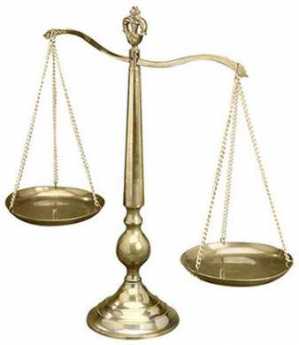
|
| McCarran Ferguson Act |
The 1945 McCarran Ferguson Act prohibited federal agencies from regulating the business of insurance whenever individual states had passed laws on the topic. However, Congress can always modify its own laws, so McCarran Ferguson is not a serious obstacle to a federal tort reform law. Legislative interference in the judicial branch is admittedly somewhat more sensitive, particularly if the U.S. Supreme Court resists. However, the Supreme Court would have to be feeling especially prickly to block Congressional action whose effect is to increase the authority of the federal over the state courts, particularly in circumstances where the state courts appear to be failing.
Proponents of tort reform, the American Medical Association in particular, very much prefer one federal law to fifty state reform laws. Not only does it simplify the scrambling around, but the federal Congress is likely to be more sympathetic to this particular issue. Sixty years of state politics have saturated the various state legislatures with trial lawyers, building up a formidable example of conflict of interest. After all, since 1937 the legislatures have had comparatively little to occupy their attention except insurance. At one point, the Pennsylvania legislature found itself with the speaker, vice speaker, majority leader, and chairmen of both judicial committees all trial lawyers.
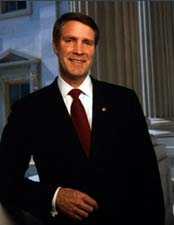
|
| Bill Frist |
And then there are personal circumstances of leadership. The U.S. Senate Majority Leader in 2005 was William Frist, M.D., a distinguished cardiac surgeon. Cardiac surgery is one of the specialties with the highest risk of a lawsuit, and the highest malpractice insurance premiums. His predecessor, Robert Dole, had been openly critical of the trial lawyers as a factor in Senate politics, an attitude that seems to come with the job. For balance, the 2004 President of the AMA, Donald Palmisano, M.D. was a lawyer.
Back of this line-up is the history that a cap on pain and suffering had been passed by the U.S. House of Representatives seven times in the last ten years (only to fail in the Senate), and most of the supporters are still in office. Proponents of tort reform, and opponents too, regard the matter as a foregone conclusion in the House. It's the Senate where it will be decided, requiring 60 votes to overcome a filibuster. Meanwhile, President George Bush, a notably vigorous political partisan, has announced early support. From the Republican point of view, trouncing the trial lawyers would be a delicious thing, but both sides must be wary of public annoyance at partisan behavior.
So, what about Constitutional issues? There really can be no argument about the jurisdiction for tort cases; they are tried in state courts, and no one proposes shifting to federal court. The Ninth and Tenth Amendments, plus two centuries of tradition place tort cases within state courts. The states have seemingly made a mess of the matter, but nevertheless, we are surely going to hear a lot about states rights when this matter comes up in the Senate. Justices Rehnquist and O'Connor have historically been strong advocates of states rights.
The strongest argument for a federal solution, in Congress or in the Supreme Court, lies in the discordance between states repeatedly imposed by individual state constitutions. In this area, the trial lawyer lobby might have over-reached. It can be terribly difficult to amend a state constitution, sometimes requiring super-majorities of both legislative houses in two successive years. When one faction achieves a brief but overwhelming dominance it can sometimes pass constitutional amendments that are very difficult to overturn even when the political climate significantly changes. The consequence: it is comparatively easy to pass tort reform laws in some states, next to impossible to do so in others. Add to that the matter of interpretation of these constitutions by state supreme courts that are often strongly partisan, and you can have a highly inequitable inter-state situation that is nearly impossible to change. One of the main functions of the U.S. Supreme Court is to settle conflicts between jurisdictions. When some states have firm limitations on non-economic awards, while other states effectively prohibit legislation on the subject, it is time to look at a national solution if we are to remain a single nation.
Medical Tort Reform (1)
The U.S. House of Representatives will soon consider a medical malpractice reform (limiting awards for pain and suffering to $250.000) which it adopted seven times in the last ten years. Following almost certain House passage, the proposal will then confront the Senate,
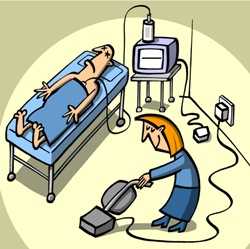
|
| cartoon malpractice |
where it has failed seven times. The politics of the two chambers are not chief concerns of this paper, which strongly advocates passage. The paper contends that unwise incentives for patients to bring suit are important causes of present difficulty, and reducing such incentives offers a comparatively simple opportunity to bring the complex issue to quick stability. Stability is essential before more sweeping changes can be examined. The collection of data in certain areas would reduce the scope for vituperation and ideology, another important step toward a solution. Full recognition must eventually be given to the intertwined complexity of industrial product liability, the McCarran Ferguson Act, hospital and corporate governance in general, the tort system, pass-through of Medicare and Medicaid overhead reimbursement to malpractice premiums, even universal health insurance. Some small step must begin such an interlocked rearrangement, and a cap on pain and suffering has the major advantage of being successfully tested by twenty-five years of experience in California and Indiana.
This paper makes no claim of identifying all the root causes or predicting all the calamitous consequences of inaction. Advocating passage of national laws to reduce plaintiff incentive to sue, it chiefly focuses on the chief arguments historically made against the present proposal, offers some comparatively novel insights in favor, and makes suggestions for collecting data to reduce the latitude for disagreement.
Congress will again take up malpractice tort reform (MICRA) in 2005. perhaps successfully. The 2004 outcome was close. Since the Republicans subsequently made electoral gains in both House and Senate, the leadership is considered likely to re-introduce the same bill and try to hammer it through. The bill's medical essence is to limit awards for "pain and suffering" to $250,000, contrasting strongly with recent escalating awards which have sometimes reached $100 million. Newcomers to the issue may be surprised that so much emphasis gets placed on this point, but thirty years of wrangling experiences in state legislatures have produced this reform alone with proven effectiveness. In the course and semi-jocular language of politics, "nothing helps the malpractice problem unless it involves on
Or, A Few Bad Apples?

|
| Surgeons |
Plaintiff lawyers and physicians do occasionally meet socially. A common way to skirt the awkwardness is to nod agreement that the malpractice problem is caused by a few bad apples in both professions. As competitors, physicians can be censorious; doctors who have never been sued find it easy to accept that those who do get sued must be substandard. This contention has been examined many times, and it is pretty firmly established that doctors who are sued are at least as competent as those who are not. While it's undeniable that sociopaths can creep into any profession, this truism has led to few reform proposals of any great promise. It's not true that every doctor gets sued at least once, but in some specialties like obstetrics a majority are sued, and those specialties soon develop shortages. Certain cities and states have a greatly increased incidence of a suit. Put that together, and you can safely predict impending shortages of particular specialties within certain zip codes. It would be a simple matter to examine the quality of particular medical specialists in those zip codes, and then for fairness examine the local legal climates. The outcome of such a study is rather easily predictable.
To assess the matter in a less confrontational way, look at insurance premiums for malpractice coverage. Doctors with a single case in their history can usually obtain insurance at standard rates, but premiums go up considerably after a history of two or more claims. Shopping the market through a broker will usually not discover an insurance company which will yield on this point. All states permit higher premiums for applicants with a history of multiple claims. Since insurance companies keep careful statistics and analyze them constantly, it seems likely they do have proof that one predictor of future claims is a history of having prior claims. There are other predictors, not necessarily marks of criticism: practicing in certain states or cities is risky. Working in certain surgical specialties is a risk. The bigger a doctor's practice, the more opportunity for claims to arise. Mix all this together, correct one factor against another with computers, and you seem to find a small proportion of cases concentrated in an unlucky few physicians. No further tweaking of the data will specify any characteristics of the suit-prone group. Since that leaves you with the conclusion that the only way to identify the suit-prone is to wait for three or four suits, the matter must be approached with resignation. Fortunately, the contribution of these people to the problem, while undeniable, is small.
In desperation, some even suggest an approach once adopted by Napoleon. He said he didn't like unlucky generals and fired them summarily. The managers and coaches of sports teams are similarly treated, and somehow we accept the injustice of it. But regardless of the merits of such pragmatism in win-lose team encounters, it misses a central point in negligence suits.
The patient, counseled by his lawyer, makes the decision to sue. Studies of many hospitalizations reveal the cases brought to the law are not materially different from many other cases that do not result in a lawsuit. The cases brought to court seem chosen by anger, mendacity, or just bad luck. Their grievance may or may not be justified, but it is not a degree of justification which distinguishes them from 90% of similar cases. Many studies of suit-prone physicians have been made, but it's uncomfortable to conduct studies of suit-prone patients. Who can doubt that identifiable suit-prone patients would discover they had difficulty finding a doctor? In summary of this point, the published levels of malpractice premiums are reasonably good measures of multiple suits. Since some regions have vastly higher premiums than others, it remains to be demonstrated whether those areas somehow have a vastly increased number of suit-provocative doctors. Or whether the variability is more fairly described as a local legal one.
Trial Bar Cavalry Charge
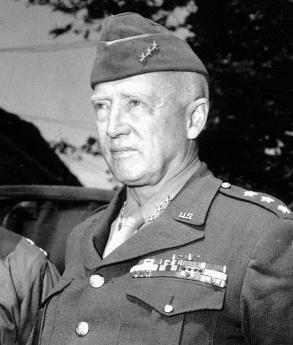
|
| General George Patton |
One of the maxims lawyers tell each other is, "Never ask a witness a question unless you already know what the answer will be." The concept might well be extended to program chairmen when they invite speakers, as the following story will illustrate.
The Right Angle Club recently heard from a lawyer who had formerly been a cavalry commander, and who slid into the General George Patton manner while addressing an audience about the malpractice crisis. Or, as he described it, the so-called crisis. I make my living by suing people, he started, so I got out pen and pencil to take it down. My careful notes indicate he started by saying the medical malpractice crisis does not and never did exist. Every verdict you ever heard of was won by the defendant because the public relations battle has been won by the insurance companies. There was more in like vein, but this is sufficient.
It was of course not the first time I have talked with a malpractice trial lawyer, and many of them are quite reasonable people who feel they are performing a needed service in an honorable way. In the past, however, both doctors and lawyers have maintained icy civility and careful adjectives in these conversations, doing their best to behave like diplomats representing warring parties
The Judiciary and Politics by the End of the Civil War

|
| Sydney George Fisher |
"An opinion has been given in the Dist. Court for the city on the question of the constitutionality of the legal tender notes. Hare & Stroud, Union men, in favor of it, and Sharswood, Democrat, against it. Hare's opinion was published in the North American yesterday and today; Sharswood's in The Age, a Democratic paper, this morning. It seems now established in practice that the judges construe the Constitution according to their political feelings, that the Constitution, therefore, varies with the political majorities on the bench, and that consequently, such supreme law wants the essential attribute of stability."
-Sydney George Fisher, Diary, February 23, 1864
Dark Morning at the Supreme Court
Congress recently extended copyright duration to 99 years if owned by a corporation, or the life of the author plus 50 years if the author retained the rights. Widely referred to as the Sonny Bono law, it was assumed to be a favor from Congressman Bono to the Walt Disney Corporation, whose copyright on Mickey Mouse was nearing expiration. Eldred, a publisher of reprints of old books, took this matter through the courts as an action against John Ashcroft, the Attorney General, to prevent his enforcement of a law which, in their view, violated the intent of the Constitution. Thus, the case of Eldred v. Ashcroft came up for oral argument at the U.S. Supreme Court. Since I was interested in reprinting important books about the dim Philadelphia past and discovered it was now usually impossible to determine who had copyright ownership, I went to Washington to hear arguments which might clarify the best approach to take. And perhaps to take the measure of the people on both sides of the argument.
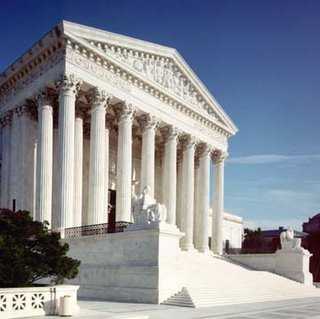
|
| Supreme Court |
fubar So, the Metroliner to Washington and overnight in a hotel. On the advice of people who knew people involved in Supreme Court matters, I set my alarm for 5 AM, arrived at the Court building at 5:30 AM. It was still pitch dark at that hour, and rather cold. Occasional fine showers would describe the weather. When I arrived, there were already 75 people standing in line. Several policemen kept the line in order, and chatted affably with the standees by way of implying that it wasn't their fault. When it's dark and the line is rather impromptu, some people will try to cheat on the queue, especially since many standees didn't know whether it made a difference or what to do if it did. What to do is to shout at the culprits to get back to the end of the line where they belong, which they mostly do after the policeman shambles over. At 9:30 AM, the line started to move forward. The policemen had been counting, too, and came back to about where I was standing. Sorry, sir, this is all that will be allowed in. What to do? Well, you can stand in another line to be formed, for fifteen-minute tourist visits, first-come, first served. As events unfolded, however, a number of people at the very front of the line had been paid to hold a place for someone else and then someone else didn't show up in time to get in as the line surged forward, so there were a few extra seats and I got one. I didn't dare get out of line to count the people behind me, but it was surely several hundred, forced to end up in the fifteen-minute line. The crowd exchanged a lot of grumbles about all this, mostly with a focus on why don't they allow this to be televised. Why not, indeed.
Inhibiting the behavior of the Justices might be one explanation. Some of them sat there silent as a stone, but many of them interrupted at will, and with acidity. Not only are the counsels at a great disadvantage in trying to make nice to people who will decide their case, they are strictly limited to concise presentation, where a interruption breaks the stream of argument. It becomes very clear that the proceedings are not held primarily for marshaling all arguments -- weak and strong -- on both sides, but rather to summarize the strongest, and give the Justices a chance to ask questions. The Justices and their clerks have presumably already read the full arguments which have been printed and handed in. This really isn't a trial. Public comments ("amicus briefs") must be printed and attached to the main briefs at the time the Court agrees to hear the case ("grants a writ of Certiorari")). Since the Court only agrees to hear a hundred cases a year, it "grants cert" less than 2% of the time. A case is supposed to be ripe for decision, all useful arguments having already been voiced, when the cert is granted.
So, under the present understanding of things, it may not be time to put these oral arguments national television. A more important step might be to find an effective way to publish the briefs on the Internet. Even then, the Court will probably squirm at the idea that they must listen to huge media campaigns, orchestrated to convey the implication that the Justices better yield to public opinion wrapped in the spin of the litigants. Since Walt Disney owns one of the three national television networks, that might not be an impossible development.
To get back to this case, it seems a little strange that copyright protection was deemed important enough to be among the few basic principles in the Constitution. Many have expressed the opinion that patents and copyrights must have originated with Ben Franklin, the only real author, and inventor attending the secret Philadelphia meetings of the Constitutional Convention. For what it is worth, the minutes show it was Madison who proposed the idea, Pinckney who seconded it, but Franklin was the world's expert on keeping his fingerprints off ideas. Most of the members of the Convention, farmers thought they were, were also members of the first Congress under the Constitution, when that Congress set the time of copyright at seventeen years. It is a pity they did not say so in 1787. In the eventual 7-2 Eldred v. Ashcroft decision, Justice Ginsburg chose to define the issue at stake as whether Congress had the right to set the duration of patents and copyrights. Of course, that was always beyond real dispute. But whether anybody ought to set it at 99 years, well beyond any author's lifetime, emphasizing the point by adding 50 years to any author's lifetime introduces fundamental questions of wisdom. One by one, every single Justice found a way to observe that this law was not wise. But rather than stirring up controversy with Congress over the fundamental rights of each branch, the Supreme Court seems to have decided to give a public opinion a chance to force Congress to eat its words.
Although the decision in Eldred is a disappointment to me and my private interests, I can live with it as a concession to public tranquility. But I really don't see why an overflow auditorium could not be provided next to the Court, where people who travel on the Metroliner and stand in the dark and cold for five hours, could at least watch a closed-circuit version of the oral arguments.
Selection of Judges
JUDGE. Mr. Smith, are you trying to show your contempt for this court?
MR. SMITH: Why, no, Mi lord. I'm trying to conceal it.
Whether this exchange ever really took place, most English lawyers believe it did. It could only have happened in an English court because lawyers in other jurisdictions would be afraid of reprisals in later cases before the same judge, if not in this one. Like Naval Captains, judges have a lot of latitudes to be petty, eccentric, incompetent or arbitrary, and not a lot can be done about it, least of all by lawyers who must appear before the same judges month after month. A judge's legal opinion can be appealed and reversed in a higher court, but if a judge just slapped down a smarty lawyer, higher courts would likely look the other way.

|
| Margaret Thatcher |
Both the Judge in the anecdote and Mr. Smith were barristers. Only a barrister may be a judge or even represent a case in court in England. There's the second kind of lawyer called a solicitor, who drafts contracts and wills, arranges divorces, gives legal counsel and whatever, but the English court system is reserved for barristers. To become a barrister, it is necessary to be invited to enroll in what amounts to a boarding school, one of the several Inns of Court which date back to the days of Crusader knights, the Knights Temple. Gradually, the barrister students graduate upward from shabby boarding school quarters, one day actually being invited to have dinner in the main Hall as a reward for good work. In time, they will have their living quarters in one of the Inns, as well as their offices, or Chambers. The Inns turn out to be an elegant place to live, with lawns sweeping down to the Thames River for a greater view than the Houses of Parliament enjoy. On the other side of the Inns is the center of London. It's a great place to live in the company of learned and powerful classmates you have known all your life. It's a monk-hood, all right, but one with elegance. It's a place where it is celebrated to the point where the Mr. Smiths can get away with a devastating response to a classmate who happens to be a judge if they think the point is a just one. The judge knows right well how his discomfort will immediately circulate in Hall, and the brotherhood will somehow protect Mr. Smith. Quids custodies custodies.

|
| Inns of Court |
It was probably inevitable that Margaret Thatcher of humble origins disliked the barrister system and tried to abolish such elitism. But it was probably also inevitable that the English court system enjoyed such prestige that she was defeated. The American system for selecting judges cannot compare with it. Indeed, the problem of judge selection has been a topic of debate in our law schools for a century, a debate that no one ever wins. Either we allow politicians to select judges, and that's obviously bad, or we make them into politicians themselves by electing them, which is even worse. We get some good judges, but we get too much incompetence, too much politics, and too much ideology. We resort to asking the Bar Associations for advice, and that leads to politics with a different set of politicians. This whole problem is insoluble as long as immense power is given to people who then operate largely out of public view, often underpaid because we fear that some might seek the job for its money, and sometimes deliberately undereducated because we fear elitism.
Because justice is mainly a search for acceptable resolution of disputes, religion is usually found at its origins. The decline of established religion makes religious tradition less acceptable as an overt source of impartiality, but religion's techniques still make useful models. America never had an established religion, but even the English system is now far less a priesthood than it used to be; the Common Law was once the exclusive product of the courts and the Church, but now Parliament creates a larger body of Statutory Law. The former system tilted toward the aristocracy, the present one is in danger of tilting toward partisan politics. In a sense, the English Civil War was about discovering that parliaments can be as tyrannical as kings. Two things are almost certainly true: we cannot tolerate a judiciary accountable only to itself, and we cannot tolerate a legislature that both make laws and interprets them, even indirectly through intrusively selecting judges. Judging by results, the English might be a little closer to a proper balance in these difficult matters, than we are.
Economic Power of Laws
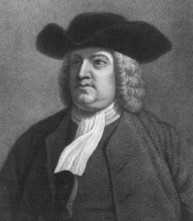
|
| William Penn |
Philadelphia is tucked down in the Southeast corner of Pennsylvania, right next to Delaware and New Jersey. All three states once belonged to William Penn and started out Quaker-dominated. In time, they settled down to a life of independent states, and with the growth of population plus speed of transportation, they are all getting smudged together again. The Quaker influence is there if you look for it, and rather fierce, even hostile, political competition between the states is there, too. But if you were a foreign visitor who doesn't look at maps, you could drive around the metropolitan area without knowing which state you were in. To a large extent, the Rand-McNally lines are a hindrance to commerce and convenience, but they have their value. The quirks of political jurisdiction give the Philadelphia metropolitan area six U.S. senators, and the opportunity to take shrewd advantage of the three legal systems. You can buy things without a sales tax in Delaware, and estate tax lawyers tell me that if you must die, die in Delaware. At one time, New Jersey was a great place to get an uncontested divorce, Pennsylvania a better place to start an unincorporated business. More recently, the New Jersey doctors are complaining that malpractice rates are unbearable, but they are not as bad as they are in Pennsylvania, and it is rapidly becoming true that if you are going to be born, you will need to be born in New Jersey because the obstetricians have all moved there. That's also true in the District of Columbia; obstetrics has just about entirely fled to Virginia. Better watch out where you have your auto accidents, too. Neurosurgeons and orthopedists have also responded to the local disincentives to living near certain types of juries.
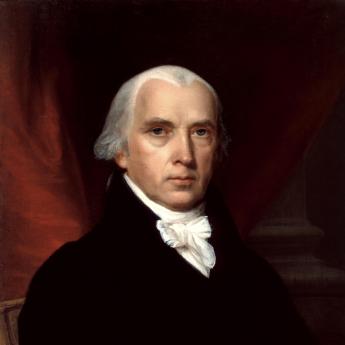
|
| James Madison |
Long ago, James Madison designed things this way on purpose. The main author of our constitution hated taxes and oppressive government as much as any other founding father and argued it was a good thing to let neighboring states have differing laws. Corporations which do interstate business hate the complexity of course, but as Madison argued, people do shift their business, their businesses, and even their residence if the neighboring states become too extreme in their differences. It's still worth a thirty-minute drive to buy silverware and China in Delaware, and if you are driving to the New Jersey shore, you ought to fill up your gas tank on the Jersey side of the bridge. At one time, there was a thriving resort town in the Jersey woods, mostly entertaining people who needed a spell of New Jersey residence to be eligible for New Jersey divorces.
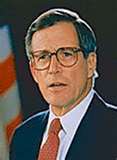
|
| Governor du Pont |
These things respond to local circumstances fairly rapidly. I once met a man from the Delaware Chamber of Commerce who boasted that the Chamber could get a Delaware law changed over a weekend if it had some particular commercial advantage. Governor du Pont saw the bigger advantages of this flexibility and got some laws enacted which drew most of the big credit card companies to Delaware, and at least a branch of all the big national banks. Delaware is starting to emulate Lichtenstein , and fairly successfully.
The effect on Philadelphia banking has been disastrous. Once the banking center of the whole continent, Philadelphia now does not have the headquarters of a single major bank. True, banking is becoming an obsolete industry whose products no one really wants, but the particularly severe effect in Philadelphia comes from the fact that if you were going to have a big bank in the metropolitan area, you would have it in Delaware.
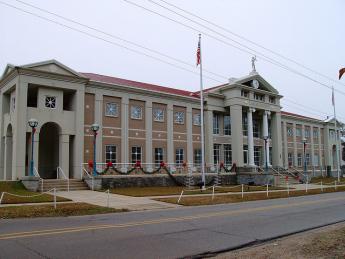
|
| Delaware Court of Chancery |
The location of so many corporate headquarters in the little state attracts lots of outside lawyers, of course, and it puts a heavy burden on the Delaware Court of Chancery, the court for corporate disputes. The judges are appointed by the governor, and it doesn't take all that much outside money to lean on the governor, so the nation's giant corporations are at the mercy of a very small group of local politicians. The politicians, on the other hand, operate freely in an environment where comparatively few of their constituents have any interest in the goings-on of major corporations from far away.
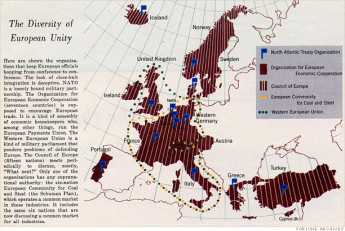
|
| European Common Market |
It's an interesting thing that the legislatures of all three formerly Quaker states are torn with sectional disputes. In Pennsylvania and Delaware, it's the cities against the farmers. In New Jersey, it's the North versus the South. All states are having a hard time balancing their budgets in a recession, but somehow New Jersey has worse deficits than the others, and therefore more quarrels about taxes. The northern politicians dominate the legislature, and the south feels it is often the victim of state laws designed to help the North in its constant war with New York City. Ever since 9/11, the financial district of New York has been sending its subsidiary employees to safer cheaper regions. That might have meant going to New Jersey, but the tax flounderings there have led to many of those relocations going on a few miles to upstate Pennsylvania. You don't ordinarily think of Scranton as a financial center, but take another look. Madison, no doubt, would smile at the tendency, but wrinkle his brow at all the unintended consequences. At least, everyone in the region speaks English more or less, otherwise, the European Common Market could learn a lot from studying our local scene. About fifteen years ago, there was actually an unsuccessful provision on the ballot for South Jersey to secede.
Lewis Harlow van Dusen, Jr. (1910-2004)

|
| Croix de Guerre |
Lew van Dusen was one of the great story-tellers of a story-telling city. In one continuous lunch conversation he could string together personal anecdotes about Lloyd George, Lawrence of Arabia, William Bingham, the making of the hydrogen bomb, the Croix de Guerre (which he had been awarded), Nicholas Murray Butler, several Supreme Court Justices, Harvard Law School (where he led the class), and on and on until the waitress would just go ahead and clear the table. He even told of his own great suffering as a boy sitting at proper Philadelphia dinners, where it was a firm rule that acceptable topics of conversation were limited to the Wimbledon lawn tennis matches and the sinking of the Titanic.
When the landmark U.S. Supreme Court case of State Oil v. Kahn came up for arguments, he and I rode together on the Metroliner down to Washington, stayed at a club there, and after the hearing took the train back to Philadelphia. During the entire time, Lew never stopped talking, and his voice was very loud. There was the time in Macao when a retired British diplomat came up to him and said he knew the history of every gravestone in the cemetery for foreigners, except five, and two of those names were on the letterhead of Lew's firm (Drinker, Biddle and Reath). Drinker, it turns out, was American consul and discovered that all of his guests were poisoned by the cook. He traveled all night, getting stomachs pumped out, but not his own, and died the next morning from the poison. Biddle, on the other hand, was also a physician interested in Yellow Fever and died of it when he contracted the disease from one of the subjects.
There was the time when he was the young guest of Nicholas Murray Butler at a luncheon with British Prime Minister Lloyd George. "Tell Mr. Roosevelt," said George, "That Social Security is nothing but a dole."
And the time when King George gave everybody the day off on his 25th Anniversary as King, so they played cricket. His teammate was Lawrence of Arabia, and after the game, Lawrence hopped on his motorcycle and rode off down the road to be killed. Lew was the last person to see Lawrence alive.
Well, when you get to the Supreme Court, the public stands in line on the steps, out in the rain. But the lawyers go around to the back door, where there are a lounge and a lunchroom. Inside two minutes, Lew was surrounded by lawyers as he told more stories. One of them tugged my sleeve and asked, "Is that who I think it is?" I said I supposed so, although who he had in mind is still a mystery to me.
State Oil turns out to have been as important to antitrust law as we supposed it would be; the fine points of vertical integration were afterward explained to me. And finally, I was told how, when he was chairman of the Ethics committee of the American Bar Association, Lew's committee caused the ABA to reverse its long-standing opposition to cameras and audio equipment in courtrooms. The effect of this has been slow, but gradually courts are permitting the televising of trials, and eventually they probably all will permit it. But not yet the U.S. Supreme Court. Non-lawyers still stand in the rain outside, and if there are no seats left inside, too bad.
Corrupt and Contented
In 1904, first in McClure's Magazine and then in the book Shame of the Cities, Lincoln Steffens described the root cause of Philadelphia's bad local politics as failure of the people to turn out to vote.
The Philadelphia machine isn't the best. It isn't sound, and I doubt if it would stand in New York or Chicago. The enduring strength of the typical American political machines is that it is a natural growth -- a sucker, but deep-rooted in the people. The New Yorkers vote for Tammany Hall. The Philadelphians do not vote; they are disfranchised, and their disfranchisement is one anchor of the foundation of the Philadelphia organization."
Just exactly a century later, a Republican member of the Legislature coined a phrase:
"You show me a hundred thousand dollars, and I'll show you a Pennsylvania judge."
Asked to comment, two Democratic politicians on the inside (although one is dead and the other is in Federal prison for embezzlement) replied:
"That isn't precisely so. The precise way of stating it is that, to be elected a judge has two basic requirements. The first is the approval of a local ward leader. The second is the expenditure of between seventy and hundred-thirty-thousand dollars. With these two requirements fulfilled, just about anyone can be elected judge, regardless of legal qualification."
Is it a mystery why we have a malpractice crisis? Other explanations are offered, but this one, the system of "elected" judges, should be examined first. It's a slightly worse system than appointing them. Someday, someone will discover why state courts are much more corrupt than federal ones. Is the court system getting worse from the bottom up? Or getting better from the top down?
Mouthpiece of the Mob
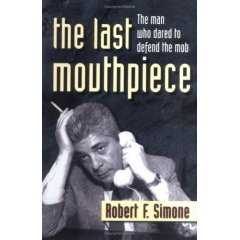
|
| Advocate for the Mob |
Robert F. Simone, a defense lawyer for Philadelphia Mafia bosses, was sentenced to four years in prison, and published a book in 2001 about his bizarre experiences called The Last Mouthpiece: the man who dared to defend the mob. Even taken with several grains of salt, the book contains a lot to make us ponder.
The criminal justice system is one of those necessary parts of society that most of us don't wish to know much about. But there's an awful lot of it, it's dreadfully expensive, and it is permitted to become even less satisfactory when it's obscure. It would seem, for example, that almost everybody who is brought to trial is ultimately found guilty. A criminal defense lawyer who happened to sit next to me at a luncheon said that in thirty years of practice, she could only remember two cases where her client was clearly not guilty. But if you attend a dozen or so trials at 13th and Arch Street, you come away with the feeling that the justice system is pretty inefficient and haphazard, with the defendants often admitting to things a spectator sees no reason for them to admit, and often getting packed off to jail after less formality than a spectator would seemingly wish for himself. The Sixth Amendment to the Constitution guarantees representation by a lawyer, but that representation often lacks the vigor one would pray for. The system seems to be run on the principle that these defendants are probably guilty of something and what matter if it isn't this particular thing, it would be something else.
From these unproven surmises, I come away with the impression that the system has possibly been relaxed a little too far in their favor; these people do such a poor job defending themselves that the system helps them a little. For one thing, the common criminal can't afford a good defense if it is going to cost several hundred dollars an hour, for several weeks. But then all of a sudden a mafiosa, or godfather or whatever, comes to court with unlimited cash for lawyers, thinks nothing of hiring investigators to go find additional evidence, has no problem paying the expenses of new witnesses, whether expert or non. Equal treatment under the law requires that the leniency built into the system for chronic losers must also be available when the public prosecutor is suddenly outgunned. Maybe that's not truly the case, but it is definitely the impression you get.
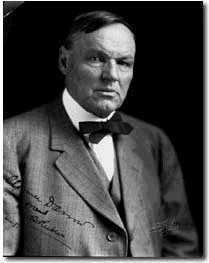
|
| Clarence Darrow |
Bobby Simone's book seems to attribute his success to two strategies, both of them traceable back to Clarence Darrow. The first is to pounce on each and every mistake made by the judge or the prosecutor and make a great fuss about it. The second is to attack the credibility of the witnesses. Since the reported requirement for mafia membership is to have participated in at least one murder, a competent defense lawyer can easily make it impossible for a jury to believe anything such a criminal swears to on the witness stand, at least if the assertion is that the godfather ordered a mob rub-out. Without credible witnesses, no conviction is possible. At least according to this book, it is thus possible to discuss a new murder every five pages, and its "not guilty" verdict in five more, time and again in a several-hundred-page book. If the ordinary reader is dismayed, the judges, prosecutors, and FBI agents are seething with rage and frustration. The press convinces the public that these defendants are guilty of dozens of murders, the pressure is intense. So, just get rid of that lawyer and things will revert back to the normal string of confessions and convictions, most of which are warranted.
The book spins a convincing argument, even when you understand it is spun by a partisan with an ax to grind, at the end of a career of making the best out of what may often be weak arguments. If the government side of the prosecution seems to have played unfair with him, it is probably true that organized criminal activity in Philadelphia seems greatly lessened in 2006. Let's see what happens to it after legalized gambling comes to town. In 2007.
Economics of La Cosa Nostra
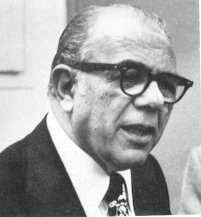
|
| Angelo Bruno |
During all of the reign of Angelo Bruno, it was a common street opinion that The Organization tried to stay away from drugs, prostitution and shooting anybody except other mobsters. Some of that attitude is found in the scene of the movie The Godfather where a neophyte going to his first killing is instructed to "Watch out for those goddam innocent bystanders". It was okay to bribe the police, not okay to annoy them. Counterfeiting and kidnapping were big no-no's, even though counterfeiting was a core activity for the ancestral Mafia in Western Sicily during the Nineteenth century.
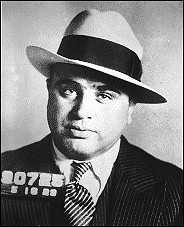
|
| Al Capone |
According to Robert Simone's book, the Philadelphia mob was mainly enriched by loan sharking. There are a lot of people who suddenly need cash desperately and can't get it quickly from banks. Simone himself was a compulsive gambler and frequently was in urgent need of money, either to throw it away or pay it back. Other people get caught in some illegal activity and suddenly need bail money to stay out of prison or up-front money for a lawyer. Or whatever. The Philadelphia mob had a reputation for being able to loan amounts of fifty or a hundred thousand dollars in response to a phone call, with home delivery of the money in fifteen minutes. For this, they would charge interest in the range of three percent a week, well above the usury limit, but probably not greatly out of proportion to the risk of loss. The police have little interest in transactions between willing parties, at least until the borrower fails to pay it back. Even at that point, it becomes a question of whether kneecaps will actually get broken, or baseball bats actually come in contact with skulls. Probably not very often, because the threat seems a credible one.
To run such a business requires large amounts of cash, hidden in safes or bricked up in walls. From this comes theft or attempted theft, with violent defense measures that often don't concern the police, much, unless those aforementioned bystanders get injured. Sometimes couriers get tempted to make unscheduled detours, but the police are fairly tolerant of informal restitution efforts. All in all, it's a nice clean illegal business.
An interesting sidelight is income tax evasion. It's entirely possible that The Organization would be willing to pay taxes if it could be done without filling out all those forms. Restaurants, bars, and market stalls can be run as a way to launder money and yet pay tax on it. But boys will be boys, and no doubt the IRS has, or had, some legitimate concerns. For years I felt the government was over-reaching when it jailed Al Capone for income tax evasion, after being unable, however, convinced it may have been, to convict him of overtly illegal activities. That's one side of it. But if you envision these organizations with millions of dollars in cash hidden away, it's easy to imagine them extending invisible credit to their associates for services rendered but not yet paid out and, of course, untaxed. Calling for such money on demand is not much different from having it in a bank. If appreciable amounts of that circumvention go on, the Internal Revenue Service really might have a grievance. Its image would be improved by demonstrating it is pursuing a named crime rather than a pretext to jail someone it doesn't like. Legislation could surely be devised which more carefully specified such illegalities. It might then be possible to bring an end to the appearance of putting people in jail for merely enjoying an ornate lifestyle. People who, almost by definition, cannot be proven to have committed a crime.
Mussolini in South Philadelphia

|
| Sicily |
The western tip of Sicily is as mountainous and remote from the heart of Europe as the Hebrides in Scotland. Like the Highland Scots, the western Sicilians ran their own informal government out of sight and out of reach. Even the Church in that region of Sicily had a sense of kinship to Eastern Orthodoxy rather than to Roman hierarchy. The flavor of the local culture can be sampled in Tomasi di Lampedusa's classic novel The Leopard which, among other things, helps explain why so many Italians hated Garibaldi, mostly known to the rest of us as Italy's great unifier. Mussolini was in the same class.
At the time of the great Italian immigration early in the Twentieth century, Italy was in near-chaos. Benito Mussolini presented himself as a welcome strongman who put down crime and disorder, particularly Communist disorder and made the trains run on time. Most of his efforts took place in the urban centers of Italy, paying little attention to rural regions like the far tip of Sicily until rather late in his rule. Meanwhile, western Sicily had its own traditional medieval way of maintaining order. The Mafiosi contained elements of the old feudal nobility, following secret activities similar in ceremony and brutality to the southern American Ku Klux Klan. Most of the inhabitant families had been living in the same villages for centuries, and by intermarriage had become very cohesive. They knew who was who, and who could be trusted. Secrecy, omerta, was their rule, murder a regrettable tradition. In this way, the stable community protected itself against roving brigands, local psychopaths, and thieving government officials. There were competitive bands who needed to be warned against; the "Black Hand" was a notorious group of local extortionists who employed dynamite as their signature. Although murder and mysterious disappearance were common enough, the Mafia had their official secret nobility, and murders were not condoned unless they were authorized by the legitimized but secret nobles. It was this secret competitive government that Mussolini decided to stamp out.
Meanwhile, back in Philadelphia clusters of immigrants from the same immigrant groups formed organizations based along the same lines. Every wave of immigrants from whatever country has always brought a crime wave with them to America, prison records document these immigrant waves, and most of the victims of each crime wave are almost always fellow immigrants. In the case of the Italians, the organizations were already in existence. For a while, the Black Hand terrorized the slums. And then the Mafiosi got themselves together, steadily eliminating trouble makers but only after a certain amount of due process authorizing the rubouts as justified. As has been true of every immigrant wave, the police were not trusted to see that justice was done, and gradually withdrew to let the informal government govern in the neighborhoods. The established American government would certainly not tolerate a rival nation within its borders, but rendering unto Caesar was moderately tolerable. Soldiers were appointed to an ununiformed militia, the victimized immigrants were coerced to contribute to the cost of their own protection, just like taxation in the more open community. The original and most enduring source of revenue for the Mafiosi was the one that was traditional back home in Sicily -- paid protection.
So when this group learned that back home Mussolini was waging war against the Mafia, the ties of loyalty to Italy were readily severed. Fascism, whatever that strange word meant, was a bad thing. Maybe the American government wasn't so bad, even when there was a war against Italy.
Philadelphia Mafia: The First Fifty Years
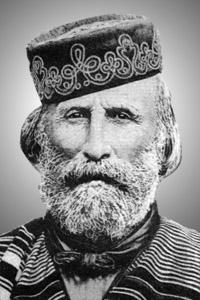 |
| General Giuseppe Garibaldi |
General Giuseppe Garibaldi unified Italy, but a great many Italians either didn't want to be unified, or emigrated to America after 1860 to escape the turmoil. The far western tip of Sicily was the most remote place in Europe, protected by mountains and volcanoes, speaking its own language, and loyal to no government except its own informal one. Over a period of centuries, secret traditions of feudalism and invisible governance had protected Sicily from invaders of various sorts. Although religion was a powerful force, theirs had traces of the Greek Orthodox Church; allegiance to the Vatican faded out as the local priesthood got closer to it. These people mostly wanted to be left alone, and dealt with outside authority in various devious ways, not stopping with murder if necessary. Informal taxes were collected as "paid protection" since a secret army costs money if only to support funerals and soldiers' widows. Rank within the underground army was identified by various degrees of "honor", which could sound vague but were in fact quite unambiguous. Central to the code of the Sicilian underground government, like all guerilla movements was a strict rule of silence, "omerta". As an intern in a hospital accident room, I have seen members of this organization actually go to their deaths, grimly repeating the mantra, "I don't know nuthin."
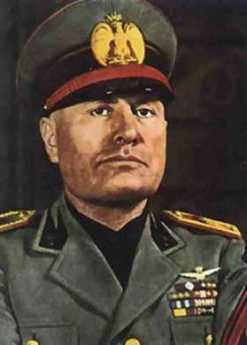 |
| Benito Mussolini |
Italy may have been unified by Garibaldi in the sense of being freed of French, Austrian and Papal domination, but unification was far from peaceful and contented, with losers often choosing emigration. A second wave of emigration was provoked by the harsh rule of the dictator Benito Mussolini, who determined to squelch underground resistance once and for all.
Western Sicilians originally chose New Orleans as their new home, which unfortunately for them already had its own secret society, the Ku Klux Klan. A prompt reaction to the "Italians" with ten or twelve lynchings soon convinced the Sicilians to resettle elsewhere. It seems possible that some of the later techniques of the Mafia were learned from the Klan. In any event, the Sicilians split into two main groups, one going to New York and the other to Philadelphia. Offshoots of the New York group moved to the mining areas of Luzerne County in central Pennsylvania (Hazelton), while another early group migrated to Norristown. There were, of course, links of intermarriage among these groups, but in the early years they drifted apart as separate colonies.
Italian immigrants were no exception to the common tendency of new immigrant groups to gravitate into crime. Records of the Pennsylvania police and jail systems for three centuries show successive waves of inmates with surnames identifying Scottish, then German, then Irish, and eventually Italians. At present, seventy percent of prison inmates are black. Almost without exception, the main victims of immigrant predation have been members of their own immigrant group. Immigrants are easily victimized, somewhat defenseless, and uncertain of the assistance of local law enforcement. Among the most famous of the lawless predator groups among the Italians was the Black Hand, whose specialty was extortion with notes signed with a black hand symbol, enforced by putting bombs under porches. Locals will show you a place on Ninth Street a couple of blocks from the Pennsylvania Hospital where the Black Hand blew things up. The Black Hand, however, was not the Mafia; it exemplified what the Mafia was formed to control.
The Italian community for fifty years was centered on Christian Street, mostly between Eighth and Ninth, gradually migrating westward toward Eleventh Street. Christian Street had been named by the Swedish Philadelphia colony after their monarchs, but the original Swedes tended to remain in Queen (Christina) Village, along Delaware, while the newer migrants drifted to newer areas. During the Civil War, northern railroads heading south ended in Camden. In time, the main Civil War traffic ferried across the Delaware River to wharves at the foot of Washington Avenue. South Street was the honky-tonk area, with a black community growing along with it. After the War, an immigration station was constructed in the Washington Avenue wharf, and the new Italians tended to settle nearby. As the streets were extended westward, the street names were also extended, but the region of Eighth and Christian was largely open fields when the Italians moved into the area, and never had been Swedish. Although there were forty or more murders in the block of Christian from Eighth to Ninth in ten years after the first World War ("Murderers Row"), in modern times the neighboring region is prized by Italian residents as an extremely safe place to live, because the Don likes it nice and quiet.
While it is probably true this safety net quality might not be so evident to blacks and Vietnamese, the safe streets for Italians feature are universally attributed to the Mafia. The Sicilian group quickly reestablished the secret army of "soldiers" and "dons" (usually one don overseeing ten soldiers), started collecting taxes in the form of protection money from the local residents, and putting one "capo" in overall command. You had to be a Sicilian, and a Western Sicilian at that, to be eligible for membership in this secret army. The hierarchy was secret but could be surmised by the elaborate "respect" paid by one to another.
My office partner, Dr. Robert Gill, tells a story illustrating the paying of respect. He was called in consultation to an Italian home by Dr. Baglivo, a highly respected general practitioner in the Italian community. The two of them walked down Eighth Street, and as they passed a barber shop, Dr. Baglivo suggested they both go in for a haircut. Evidently, the patient to be visited was a very important person, and as they went in the shop, Dr. Baglivo introduced Dr. Gill to the group of assembled loiterers as the big doctor from the Pennsylvania Hospital, come to visit you-know-who with the last name ending in a vowel. The group jumped to their feet, in respect, and the barber turned to the lathered-up, half-shaved man in the barber chair. "You!", he cried out, "Get out of that chair! Let the Doctor have a haircut.!" The man dutifully scrambled out of the chair with shaving cream dripping, and humbly sat in a waiting chair, while the big doctor got his haircut. As they left the shop, payment for the haircut was elaborately refused. The point, of course, is not so much one of respect for the medical profession, as respect for someone who had been chosen to attend a capo.
The Mafia was thought to do a fair amount of slashing and breaking of kneecaps, but killing was not permitted except at the order of the boss, or capo. The police could be fairly tolerant of informal methods of law enforcement, but dead bodies brought newspaper attention where even paid-off politicians might not be able to shield the Organization from "heat". For the first forty years, members of the Mafia were sort of volunteer firemen, earning their living as tradesmen and laborers; Mafiosi were paid protection money but were not generally wealthy. The identity of the capo was for forty years a complete mystery to the non-Sicilian community.
But then, along came Prohibition.
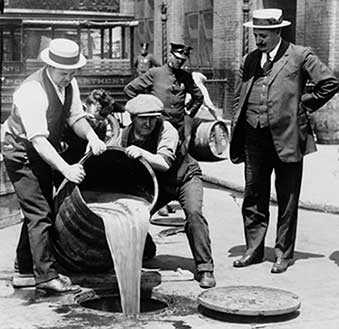 |
| Prohibition |
Prohibition created big money fairly safely, so bootleggers proliferated widely. It was soon no longer possible for one tightly-knit fraternal organization to intimidate a whole host of petty criminals acting alone or in small groups, so the Mafia was forced to control the bootlegging industry through dominating its sources of supply. As a general rule, "rum-running" involved bringing in conventional brand liquor from Canada. That route made Chicago, Boston and New York the major entry and distribution points for "good stuff". From Philadelphia south, most illegal liquor was "moonshine" or other illegally distilled products. Some liquor was distilled in abandoned buildings and garages, but a substantial amount was distilled in the Pine Barrens of nearby New Jersey. The colorful history of the Teamsters Union can be traced in part to the transportation network established for conveying one form of bootleg or another to its retail destinations. Trucks were often hijacked, so paid protection took a new motorized form. The manpower required soon exceeded the number of Sicilian neighbors related by intermarriage. Local groups had to be coordinated with national groups, requiring the establishment of syndicates and governing councils. Even then, one group of recognized Mafia might collide with another; the resulting murders had to be negotiated through a quasi-judicial appellate system.
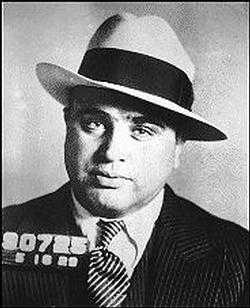 |
| Al Capone |
Philadelphia appears to have had a share of gangland warfare, but mainly that was based in Chicago and New York. In one year, Chicago experienced four hundred gangland murders, Philadelphia only forty. Al Capone came to visit Philadelphia, for reasons unknown, was assured he was most unwelcome and got himself put in jail, for his own protection. Eastern Penitentiary likes to show off his well-decorated cell, to which meals were apparently catered. What was really going on remains a mystery. A group of ten Philadelphia Mafiosi is now known to have gone to New York to participate in the "Castellammerese Wars", where two large New York Mafia groups engaged in a fierce battle for supremacy in what was now a source of vast riches. Occasional lurid episodes like this surfaced in Philadelphia, but the Mob was determined to remain as obscure as possible, and many details are missing or deliberately misrepresented. The essence of it all was that Prohibition had transformed the Mafia from a little vigilante group who imposed law and order on a lawless immigrant community, into a tightly organized army of killers, who mostly devoted their war efforts to exterminating rival tribes, while their daily activities consisted of running marginally tolerable criminal activities like gambling and loan sharking.
sting book by Celeste A. Morello called Before Bruno. In 1927, the Mafia decided they could no longer tolerate the Zanghi gang of four or five or a somewhat larger gang of Lanzetti brothers. On Memorial Day, 1927, several Zanghi members were standing on the corner of Eighth and Christian, when they were approached by several men in black overcoats. Down the street came a car with several others carrying shotguns. After the smoke cleared, three Zanghi (one of them the uncle of Mario Lanza the singer) were lying in a pool of blood, and the car went careening down Christian Street with four Mafiosi, including Salvatore Sabella, crouched on the running boards. "Musky" Zanghi, who was intended as another victim, emerged from the neighboring building and acted like a crazy man. "Sabella," he cried, "Sabella did it!". And he continued to squeal, right into the police station and newspapers. The unthinkable had happened; someone ratted. As it turned out, Sabella was revealed as the Capo himself, and general consternation ensued. Just how this information got circulated is unknown, but a story has it that $50,000 was paid to Musky to shut his mouth, Musky failed to appear in court as a witness, the court system was persuaded to blame the whole thing on an unknown underlying named Quattrana (who went to jail for eight years), everybody else was not guilty, Sabella retired as capo at the remarkably young age of 40 and lived for years in Norristown. In fact, because of the 1929 crash, Sabella the capo had to work as a butcher in Norristown, receiving small gifts as a pension. And, as these undocumented stories would have it, it took fifteen years but eventually someone, surely a friend of Sabella, "got" Musky Zanghi, who was hiding out in New York.And the Lanzetti brothers? Well, they got eliminated, reputedly by Sabella's successors in the organization, but the violence triggered extensive Grand Jury investigations led by Judge Edwin O. Lewis, later the father of Independence Mall. Thereafter, mob rubouts became considerably less frequent. Although newspaper and FBI activity had been extensive, and apparently effective, a more detached view makes it more likely that repeal of the Volstead Act was the major factor causing mob activity to subside.
REFERENCES
| Blood and Honor: Inside the Scarfo Mob, the Mafia's Most Violent Family George Anastasia ISBN-13: 978-0940159860 | Amazon |
| Before Bruno: The History of the Philadelphia Mafia Book 2 C. A. Morello ISBN: 978-0967733425 | Amazon |
| The Last Gangster George Anastasia ISBN-13: 978-0060544232 | Amazon |
| The Last Mouthpiece: The Man Who Dared to Defend the MobRobert F. Simone ISBN-13: 978-09401596932 | Amazon |
REFERENCES
| The Pine Barrens: John McPhee: ISBN-13: 978-0374514426 | Amazon |
Franklin Declares Independence a Year Early
Joseph Priestly became a close friend of Benjamin Franklin almost as soon as they met. Priestly was an Anglican clergyman who broke loose and formed the Unitarian Church, and meanwhile, his scientific discoveries also entitle him to be called the Father of Chemistry. Franklin, of course, was the discoverer of electricity; it would be hard to be sure which of the two was more brilliant. In July, 1775, Franklin wrote the following letter to Priestly, which makes a trenchant case that the American colonies should, and would, break away from England. Since some legal authorities, following Lincoln's lead, maintain that Jefferson's manifesto "informs" the United States Constitution, it might be well to begin referring to this letter as an even clearer statement of the mindset of America's founding leaders.
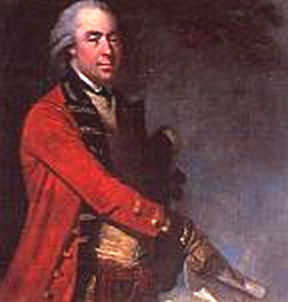
|
| General Thomas Gage |
" Dear Friend (wrote Franklin),
"The Congress met at a time when all minds were so exasperated by the perfidy of General Gage, and his attack on the country people (i.e. Of Lexington and Concord), that propositions of attempting an accommodation were not much relished; and it has been with difficulty that we have carried another humble petition to the crown, to give Britain one more chance, one opportunity more of recovering the friendship of the colonies; which however I think she has not sense enough to embrace, and so I conclude she has lost them forever.
"She has begun to burn our seaport towns; secure, I suppose, that we shall never be able to return the outrage in kind. She may doubtless destroy them all; but if she wishes to recover our commerce, are these the probable means? She must certainly be distracted; for no tradesman out of Bedlam ever thought of increasing the number of his customers by knocking them on the head; or of enabling them to pay their debts by burning their houses.
"If she wishes to have us subjects and that we should submit to her as our compound sovereign, she is now giving us such miserable specimens of her government, that we shall ever detest and avoid it, as a complication of robbery, murder, famine, fire, and pestilence.
"You will have heard before this reaches you, of the treacherous conduct to the remaining people in Boston, in detaining their goods, after stipulating to let them go out with their effects; on pretence that merchants goods were not effects; -- the defeat of a great body of his troops by the country people at Lexington; some other small advantages gained in skirmishes with their troops; and the action at Bunker's-hill, in which they were twice repulsed, and the third time gained a dear victory. Enough has happened, one would think, to convince your ministers that the Americans will fight and that this is a harder nut to crack than they imagined.
"We have not yet applied to any foreign power for assistance; nor offered our commerce for their friendship. Perhaps we never may: Yet it is natural to think of it if we are pressed.
"We have now an army on our establishment which still holds yours besieged.
"My time was never more fully employed. In the morning at 6, I am at the committee of safety, appointed by the assembly to put the province in a state of defense; which committee holds till near 9, when I am at the Congress, and that sits till after 4 in the afternoon. Both these bodies proceed with the greatest unanimity, and their meetings are well attended. It will scarce be credited in Britain that men can be as diligent with us from zeal for the public good, as with you for thousands per annum. -- Such is the difference between uncorrupted new states and corrupted old ones.
"Great frugality and great industry now become fashionable here: Gentlemen who used to entertain with two or three courses, pride themselves now in treating with simple beef and pudding. By these means, and the stoppage of our consumptive trade with Britain, we shall be better able to pay our voluntary taxes for the support of our troops. Our savings in the article of trade amount to near five million sterling per annum.
"I shall communicate your letter to Mr. Winthrop, but the camp is at Cambridge, and he has as little leisure for philosophy as myself. * * * Believe me ever, with sincere esteem, my dear friend, Yours most affectionately."
[Philadelphia, 7th July, 1775.]
REFERENCES
| The Invention of Air: A Story of Science, Faith, Revolution,and The Birth of America, Steven Johnson ISBN: 978-1-59448-852-8 | Amazon |
Donor Intent
At least three of the greatest treasures of Philadelphia are now used in ways that almost certainly flout the expressed wishes of the donor. Steven Girard's
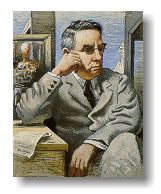
|
| Alfred Barnes |
bequest for the enhancement of "poor, white, orphan boys" is now devoted mostly to black children, many of the girls, many of them non-poor by some definitions, and many of them orphans only in a limited sense. Alfred Barnes wanted his art treasures to be used for education, outside the city of Philadelphia which had offended him, and definitely not part of the Philadelphia Museum of Art which he disliked. They are now to be moved to Philadelphia's Parkway, close to and under the thumb of, the Philadelphia Museum of Art. John G. Johnson's immense art collection now resides within the Museum of Art in spite of the firm declaration by this eminent lawyer that it was to remain in his house, and definitely not to be used to promote some huge barn of a museum.
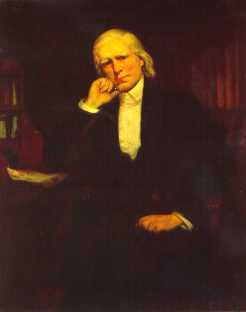
|
| William J Duane |
It's hard to imagine how any set of instructions could be devised to be more clear than these. Barnes employed a future Supreme Court Justice, Owen Roberts, to write his will. Girard similarly employed the preeminent counsel of his time, William J. Duane, to devise an extraordinarily detailed set of instructions. John G. Johnson was himself considered to be the most eminent lawyer in the city. In fact, he once received a fee of $50,000 for his opinion about a corporate financial plan, consisting of the single word "No" scrawled on its cover.
It would be interesting to know whether these famous cases are typical of the way wills are treated, either in this city or in the nation generally. Perhaps they are notorious mainly because they are so unusual. But perhaps they are indeed rather representative and stand as lurid examples of the general failure of the rule of law. Perhaps they reflect some deeper wisdom of the law, where Oliver Holmes intoned that the standard was not logic, but experience.
<Perhaps some guidance can be found in the decisions of Lewis van Dusen, Sr. who for several decades established the Orphans Court of Philadelphia as a model for the world to follow. Someone seems to have thought he set a good example. But was his reign an exception, or a glowing example of the triumph of society's wisdom over the crabbed grievances of dying millionaires in their dotage?
These remarks are made while the newspapers are filled with the story of a Texas billionaire who married a magazine model fifty years younger than himself. Some prominent local heiresses are known to have run off with their stable boys. Indeed, you don't need to read many tabloids to see a dozen examples of such behavior. Is it possible that some of them were acting up out of frustration at the probable betrayal by the courts of more reasoned instructions for their wealth?
U.S. and E.U. Exchange Experiences (1)
THE Global Interdependence Center (GIC), founded by Nobelist Lawrence Klein in 1976, brings noted foreign financiers to address Philadelphians interested in finance, and takes those Philadelphians abroad to return the visits. It's a gracious, entertaining, and highly stimulating travel club of very nice folks. Its 25th Annual Monetary and Trade Conference (in 2001) was especially exhilarating. Christian Noyer, President of the Banque de France, gave a description of the rationale and direction of the European common currency. Since he was the Euro's driving force right from the beginning, the experience of hearing him was pretty much like hearing Alexander Hamilton tell the story of the founding of the American banking system. Such a notable event needs to be reported.

|
| Christian Noyer |
Christian Noyer urged that the central concept of the European Union is deliberate, voluntary surrender of national sovereignty -- for a mutually beneficial purpose. The declared purpose of the limited surrender of national control of the currency is economic; price stability, lower interest rates, the stimulation of international trade by lowering transaction costs. But the unstated, grander, purpose is the elimination of war. Because the limited technical purpose has been achieved in almost all areas, the grander purpose of eliminating war has not been an accident. With this simple, even humble, declaration it immediately becomes possible for a mildly irritated American audience to understand that European reluctance to become our active military ally grows out of a highly commendable set of motives, and widely differing historical experiences.
<As things worked out, the new nations who have recently joined the Union ("The U") are anxious to modernize, because the people of those nations demand modernization and their leaders must agree to achieve it. Inflation, that hitherto inevitable fund-raiser for national governments, must be eliminated in order to join and stays eliminated because the other members of The U will not tolerate it in a partner. In his curious way, "price stability" has placed the Union on the side of the people against the locally powerful, although it would be untactful to emphasize it. From the elimination of inflation comes lower interest rates, and from that, a stable currency. From that comes economic growth, for which the political lingo seems to be "modernity". As a consequence of this undeniable success, all nations in the area want to join the Union, and none wants to leave it. If that prevailing attitude doesn't lead to the elimination of what might then be a civil war, it's hard to know what will eliminate it. The marvel of all this skillful analysis is how natural, soft and modest it sounded, feeling like an old soft shoe. Eventual political unification is clearly an old dream in Noyer's head, but for now, he seems content with the vindication that it is possible to have a currency without having a country control it. It seems to be a steamroller of economic logic, flattening out the pretenses of merely political power.
No less an economist than Martin Feldstein has written that stable unified currency is doomed in the European context of widely diverse labor markets; Noyer seems pleasantly serene in the face of this argument. He wouldn't say so, of course, but some in the audience got the idea that Noyer probably believes the power of this cooperative idea will eventually discipline the unions the way it disciplined the politicians. One certainly hopes so, for the sake of this smooth, likable French aristocrat.
Compromise Outside the Borders of a Debate

|
| Cardinal Mazarin |
For example, the north European states, Germans, in particular, must resign themselves to subsidizing the Mediterranean nations for years to come, working a hard work ethic while they watch their wards live an easier one. But it can be accomplished; New England has been subsidizing Mississippi for more than a century, and Appalachia has been fighting the rest of the country's wars for them since 1860. The South was always more feudal, had a more distinct class system, had a culture of upper-class military schools, whereas the North had a background of largely religious reasons for emigrating to the New World. Lincoln, for example, was an ardent Whig, which in those days meant an advocate of helping commerce by the intervention of government. That is essentially a 17th Century French idea, said to originate with Cardinal Mazarin and Jean-Baptiste Colbert. Whether it is useful to continue the same idea for four later centuries is an emotional issue in a class with our own reluctance to change a word of the Constitution. There is even a shadow of present concern that Americans will have so forgotten the lessons of free interstate commerce that they might somehow surrender it for some other blandishment. Certainly, free international trade has its enemies. The abolition of slavery was, of course, an overdue achievement, too, but perhaps our long slog toward equal rights has allowed this second crusade to overshadow the history of what really was the main one. In case anyone feels impelled to start a quarrel about this viewpoint, let me remind him that Quakers started the abolition movement, right here in Philadelphia, and have nothing to apologize about, for maintaining the Union was a more important justification for Civil War that was the abolition of slavery.

|
| Jean-Baptiste Colbert |
With the American Civil War repeatedly reminding us how dangerous it can be for even unified nations to disagree about vital regional issues, it is useful to review such American inter-state friction even closer to the time of unification, namely the repayment of Revolutionary War debts. Here, the American post-unification memories were still about the same as pre-unification. Essentially, only the legal documents had changed very much. Secretary of the Treasury Alexander Hamilton was trying to arrange equitable federal assumption of all thirteen state war debts after Virginia had already paid off its bonds and obviously had thus given up the leverage of refusing to pay them. Virginia at that time was the largest of the component states, and because George Washington was President, Virginia was politically very powerful. But submerged within the now more powerful national government and subject to its rules, Virginians were now in quite a new position. Because Hamilton was trying to establish a good international credit reputation for the new national government, and because he wanted to acquire a creditor's power over all the states, he was anxious for the federal government to assume all state debts. Naturally, Virginians believed they would not have paid off the bonds if they had known this was coming. That's different in this case from knowing the rules before they acted. Imaginative alternatives were limited because the recent war had left no money in any treasury, or even likelihood that foreigners would extend credit. Because the Europeans chose to create monetary union as a step toward political union, the problem confronted European negotiators who were still positioned on behalf of independent sovereign states. The Greek government was skirting close to default on its bonds, whereas in the other case the
The solution reached was to mollify Virginia with a political plum, the location of the Nation's capital named Washington across the Potomac from George Washington's home, potentially directing the flow of Atlantic trade to the Potomac and to Virginia. Philadelphia was intensely displeased, and there are remarkably few statues and mementos to Virginia patriots to be found in that city, even today. However, the political maneuver remains as a classic; when negotiations reach an impasse on some central issue, try to balance the political debt with arrangements which have little to do with the issues at hand. In the case of the European Union, the Greeks have no money and probably can never repay the present bailouts, let alone any extra future indebtedness. Because of the recent international recession, other sources of funds from unrelated nations may well be unavailable. Argentina has recently nationalized a huge Spanish oil developer operating on the Argentine property, so there is a question whether the Spanish banking system is affected in some way that will further strain the Greek default, and thus further drying up sources of European credit. China is beginning to show signs of the Liquidity Trap, where ample funds are available in its banks but no one wishes to borrow money to build facilities, to produce goods, which the Chinese may not be able to sell. So, there are signs available to even the casual observer that it may simply not be possible to find the money to finance another Greek bailout, except to go back to the Germans. Since Adolph Hitler within recent memory had come close to conquering all of Europe militarily, there is understandable reluctance to appeal to Germany to become the rescuer of Europe, financially. The situation thus comes close to crying out for a solution that benefits some rescuer other than Germany, or which benefits Germany in some way that is not monetary. Like it or not, Germany has already rescued East Germany once, Greece at least twice, and can expect several more decades of subsidizing its less provident fellow Europeans. It is getting to be time for the rest of Europe to express its gratitude in some tangible, visible way.
The Value of Large Law Firms

|
| Kermit Roosevelt |
Kermit Roosevelt of the famous family teaches Constitutional law at the Penn Law School, writes books about the social scene, and dropped around for lunch at the Franklin Inn Club, recently. The discussion soon danced around a paradox; law students would almost kill to get accepted at one of the big law firms, but a substantial number of them say the big salaries cannot compensate for the pain inflicted on the lawyers. That isn't exactly the image the public has of them, so it seemed worth asking about.
In the first place, corporate legal clients almost always choose one of the big firms to represent them, so work at the big firms is mostly the work of big corporations. Big corporations pay big fees to the big firms, which they regard as prestige firms. On the other side, almost all the new hires at big law firms are drawn from about five prestige law schools. Finally, the nature of the young lawyers' complaint is that they are given scut-work to do, in large volume, under great time pressure. Scut work in their eyes seems to mean the reading of huge piles of documents in order to summarize them for other members of the law firm who are higher up the ladder. This scut work is so repetitive and boring that a great deal of it is being outsourced to India. Whatever goes on here? Why is so much money being paid to waste the time of our finest legal minds, graduates of our most competitive prestige institutions, when it could apparently be handled much more cheaply by unknowns who work five thousand miles away?
Let's look at the prestige law schools for a moment, asking what it is they provide their students that are so highly prized by everybody, in spite of the fact that it could mostly be supplanted by anonymous overseas drones? Here, we get two puzzlingly contradictory opinions. These law schools teach on a highly academic and theoretical level and almost never is there a faculty member who actively practices law. The consequence is that graduates of these schools almost invariably admit that they discover that almost nothing they were taught had any usefulness in their careers. That's not true among the scorned lower-tier law schools, who generally have large numbers of "adjunct" professors engaged in active law practice. The conclusion has to emerge from this that everything useful for the practice of corporate law is taught to the young graduates after they are hired, thus keeping the trade secrets proprietary, since the high salaries paid to restrain migration either to law schools or lowly competitors. And the migration is further restrained by the circumstance that these young titans of the law have really never learned how to practice the normal kind of law. That's accusatory, of course, and the people accused are very skillful in defending themselves, so let's just consider it a conjecture without evidence to support it.
Even on a speculative level, this conspiracy theory isn't completely satisfying. It does not address the puzzle why major corporations which rule the economic world would pay so much for what is difficult to justify qualitatively. They can afford it, perhaps, but they are not stupid. Mr. Roosevelt suggests that many important lawsuits will inevitably be lost since they are not all settled out of court. If a corporation loses a big suit, it needs to justify itself to its board, its customers, and maybe even its stockholders. The use of a prestige law firm to represent it confers at least the idea they did everything possible to win, and they lost to another law firm that is understandably well-paid, prestigious, and unusually skillful at winning. The management of the client corporation, in other words, is protecting itself.
Meanwhile, the big law firms are recruiting large numbers of junior employees from wealthy families and proven academic ability. If they survive the disagreeable vetting process, they may well be eligible to become either legal stars or big rainmakers. There's no guilt about running this gladiator fight because the pay is very good, indeed.
The lunch was concluded on a note of musing. This all may not be entirely right, but it probably isn't entirely wrong.
Charter of Incorporation of Franklin Inn Club (1902)
In compliance with the requirements of an Act of the General Assembly of the Commonwealth of Pennsylvania, entitled "An act to provide for the incorporation and regulation of certain corporations," approved the 29th day of April, A.D. 1874, and the supplements thereto, the undersigned, all of whom are citizens of Pennsylvania, having associated themselves together for the purpose hereinafter specified, and desiring that they may be incorporated according to law, do hereby certify:
- The name of the proposed corporation is The Franklin Inn Club
- The purpose for which this corporation is formed is to promote social intercourse and friendship among authors, illustrators, editors and publishers, and to that end to maintain a clubhouse for the use of its members.
- The business of the corporation is to be transacted in the City of Philadelphia.
- The corporation shall have perpetual succession by its corporate name.
- The names and residences of the subscribers are as follows:
- S. Weir Mitchell, 1524 Walnut St. Phila.
- J. Bertram Lippincott, 204 S.19th St. Phila.
- Edward Brooks, 5971 Drexel Road, Phila.
- Francis Howard Williams, 5349 Green St. Phila.
- William Jasper Nicolls, 1018 S. 49thSt., Phila.
- The corporation has no capital stock.
- The number of Directors of the corporation is fixed at seven, and the names and residences of those who are chosen Directors for the first year are as follows:
- S. Weir Mitchell, 1524 Walnut St. Phila.
- Joseph G. Rosengarten, 1708Walnut St. Phila.
- S. Decatur Smith, Jr., 1927 Spruce St. Phila.
- Cyrus T.Brady, The Normandie, Phila.
- John Luther Long, Ashbourne, Pa.
- Horace Howard Furness Wallingford, Pa.
- Craige Lippincott, 218 S. 19th St., Phila.
- The number, designation and terms of office of the several officers of the corporation and the time and manner of holding elections may be prescribed by the corporation.
- The corporation shall have power to regulate the admission of members, their suspension or expulsion and causes which justify such suspension or expulsion and the manner of effecting the same, and the mode and manner in which the property of said corporation shall be divided and appropriated in case of a dissolution of said corporation or winding up of its affairs; and any member expelled shall forfeit all right which he may have to any of its property, real or personal.
Witness
our hands and seals this 17th day of April Anno Domini
one thousand nine hundred and two.
(signed) S. Weir Mitchell (seal)
(signed) J. Bertram Lippincott (seal)
(signed) Edward Brooks (seal)
(signed) Francis Howard Williams (seal)
(signed) William Jasper Nicolls (seal)
Commonwealth of Pennsylvania
City and County of Philadelphia} ss.
Before me, the subscriber, Notary Public for the Commonwealth of Pennsylvania, residing in the City of Philadelphia personally appeared
J. Bertram Lippincott, Francis Howard Williams and William Jasper Nicolls, thereof the subscribers to above and foregoing certificate of incorporation of The Franklin Inn Club, and in due form of law acknowledged the same to be their act and deed. Witness my hand and Notarial seal this 17th day of April Anno Domini
one thousand nine hundred and two.
(signed) Winfield J. Walker, Notary Public
In the Court of Common Pleas No 5 of
Philadelphia County of
March Term, 1902.
No. 2657.
And now, this 12 day of May A.D. 1902, the above Charter and Certificate of Incorporation having been on file in the office of the Prothonotary of the said Court since the 18th day of April A.D.1902, the day on which publication of notice of intended application was first made, as appears from entry thereon, and due proof of said publication having been therewith presented to me, a law Judge of said County, I do hereby certify that I have perused and examined said instrument and find the same to be in proper form and within the purposes named in the first class of corporation specified in section 2 of the act of the General Assembly of the Commonwealth of Pennsylvania, entitled "An act to provide for the incorporation and regulation of certain corporations," approved April 29th 1874, and the supplements thereto, and that the said purposes are lawful and not injurious to the community. It is, therefore, on motion of William Morris, Esq. on behalf of the petitioners, ordered and decreed that the said Charter be approved, and is hereby approved, and upon the recording of the said Charter and its endorsements and this order in the office of the Recorder of Deeds in and for said County, which is now hereby ordered, the subscribers thereto and their associates shall thenceforth be a corporation for the purpose and upon the terms and under the name therein stated.
(signed) Robert Ralston, Judge
Recorded in the office for the recording of deeds
In and for the
County of Philadelphia in
Charter Book 27 page 209.
Witness
my hand and seal of office this 13th day of May Anno Domini
One thousand nine hundred and two.
(signed) Wm. S. Vare, Recorder
The Man Behind the Mann
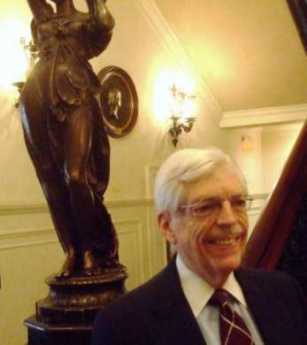
|
| William Leonard |
William Leonard, a distinguished lawyer retired from the distinguished firm of Schnader, Harrison Segal and Lewis addressed the Right Angle Club recently about his adventures running the new and improved Mann Center in Fairmount Park. A member of the board, he was suddenly asked to act as interim CEO when Peter Lane went on to another career. His task was to hold the organization together, while a permanent replacement was recruited. It turned out that directing an organization and actually running it are two entirely different things. It was necessary to learn about show business programming, the problems of rock groups, the whims of donors, the headaches associated with food vendors, and lease renewals with city governments, not to mention the rigidities of state and federal rules. Leonard obviously enjoyed the challenge, although most of us wouldn't.
The Philadelphia Orchestra had been playing summer concerts in the park since 1930, eventually adopting the name of Robin Hood Dell, East. Although the city contributed a couple hundred thousand dollars of support, and several hundred thousand other dollars came from non-ticket sales, classical music was always a long way from breaking even. The big revenue came from Rock Concerts, which may have been humiliating for the classical musicians of international fame, but was nevertheless what it took to survive, take it or leave it. Fred Mann in 1976 took the lead in raising funds for a roofed outdoor performance center, and the enormous energy of Peter Lane was brought from the New York Pops to get things going. In ten years, the Mann Center increased its outside support to $2.8 million of the $8 million annual budget and was putting on forty performances a season, with attendance increasing by 20% from 2006 to 2007. All this was accomplished in spite of the city government dropping its contribution to zero, and dropping music courses in the school system.
In a sense, the city stringencies may have been a blessing for the Mann. A second capital campaign raised $15 million for expanded facilities and parking, as well as an education center, to meet the new community need. A complimentary ticket program distributes 50,000 free tickets yearly, and seats on the lawn cost $10. If you want to get under the roof, it costs more. The free program familiarized parents with the program, and the educational center is now thriving.
Mr. Leonard brought along the new CEO, Cathy Cahill, and it looks as though he made a good choice. She's only been here for 19 days, but she went to Temple and Drexel before taking jobs out of town. She's a cellist herself, which should ease labor relations somewhat, although the pep and enthusiasm are surely innate. We hear that SEPTA is planning to re-open the R-5 station, and jitney bus service for the whole Park complex will be shared with the Please Touch Museum and other new activities in the 1876 exhibition area. There are plans for a Shakespeare repertory group to have a home here. This drive and enthusiasm are going to be necessary because Rock Groups are now competing in the Wachovia Center, and the Tweeter Center in Camden. Apparently, the secret of classical music finances leaked out.
www.Philadelphia-Reflections.com/blog/1479.htm
South Amboy Explodes

|
| Explosion |
South Amboy, New Jersey, is a waterfront industrial town on a remote promontory behind Staten Island, jutting into lower New York Bay. It's across the Raritan River from historically important Perth Amboy, but it's fair to say that few people ever heard of South Amboy until sunset on May 18, 1950, when they suddenly heard a lot. An entire freight train, five lighters, and a railroad pier suddenly exploded and disappeared. About twenty-five people were never seen again; the largest piece of metal from the explosion was only about a foot in length. A significant part of the town was leveled, steeples were knocked off churches, and windows were broken in five surrounding counties. Considering what caused it, it seems remarkable that so few people were killed. The explanation usually given is that the explosion blew straight up and straight down; the distant windows were smashed by pressure implosion.
When Pakistan split off from the rest of India, there were bloody migrations in which millions of people died. So Pakistan bought the rights to the design of certain land mines to protect its new borders and contracted with a firm in Newark, Ohio to manufacture the mines. Two trainloads of these explosives were shipped from Ohio to a railroad pier owned by the Pennsylvania Railroad in South Amboy, to be lightered out to a waiting cargo ship and sent to Pakistan. The first of these two shiploads sailed off uneventfully, and on May 1, 1950, the second shipment had already left Ohio and was underway, when the Coast Guard suddenly declared the South Amboy pier to be closed and forbidden. As the train chugged slowly eastward, frenzied negotiations took place with Admirals in Washington. There was plenty of time, because the train moved very, very slowly and it was detoured over six different railroads to Wilmington Delaware, where the Hercules Powder Company had packed two freight cars with dynamite, which were to be hooked onto the end of the train as it inched its convoluted way to South Amboy.

|
| South Amboy Explodes |
The method of packing the land mines was of some importance during the huge litigation which inevitably followed. Land mines were packed in cardboard boxes about six feet long, divided into six compartments. Our own Army regulations about such things state that never, never should fuse be packed in the same carton with the mines. However, this particular shipment had five mines to a carton, with the fuses in the sixth. It was later argued that this particular arrangement proved harmless in the first of the two Pakistan shipments, but there was the testimony that defective fuses were removed from those boxes and passed back up the line, where those deemed satisfactory were re-packed in the cartons which were in this, the second shipment. A fuse, by the way, does not quite describe these objects, which were screwed into a hole provided on the bomb part. They contained a spring and a steel ball in a tube; when the gadget was cocked it was held by a hare-trigger. The idea was that the pressure of stepping on the mine shot the steel ball into the ball of explosives, and boom.
The railroad ammunition pier, for some reason called The Artificial Island, consisted of two rail lines extending a quarter mile from land, but no structures. Stevedores transferred the boxes from the train to the lighters, and then five lighters took the partial shipments out to the anchorage where the ocean freighter was waiting. The deck of the lighters was lower than the train tracks, so a wooden ramp was laid from the freight car to the lighter, resting on several mattresses on deck. It all worked on the first shipment, didn't it?
Well, it didn't work this time, and we have no way of knowing who stumbled or dropped something; we only know it all went sky-high. For this, the ship-owners were delighted because it is a well-established principle of Admiralty law that unless the ship was in contact with the owners, their liability is limited to the value of the damaged vessel. Under conditions of total disintegration, that means the lighters had a liability of zero. But there were six railroads, the Pakistani government, the Coast Guard and the two manufacturers of the explosives available to sue. Everybody had insurance, so a dozen insurance companies were involved. All of the victims and hundreds of people with property damage, all had lawyers; everyone agrees that many lasting friendships were established among lawyers who were milling around. Finally, the judge declared this case just had to be settled, or else it would continue for the rest of everybody's lifetime. The total amount of the claims submitted came to $55 million. Obviously, the settlement would be for less than that, but settlements are kept secret and you are not supposed to know how it turned out.
So, the question that remained was this. If everybody was insured, why not let the insurance companies haggle about who owed what to whom. Why did all of those railroads have lawyers hanging around? Well, the answer is a lesson for all of us. You need a lawyer to watch your insurance company's lawyer, because once a claim action begins, you and your insurance company develop a conflict of interest.
www.Philadelphia-Reflections.com/blog/1482.htm
The Corinthos Disaster

|
| Oil Tanker on Fire |
Fire, huge fire. The Corinthos disaster of January 30, 1975, was the biggest fire in Philadelphia history, and one hopes the biggest forevermore. Its immensity has possibly lessened attention for some associated issues which are nevertheless quite important, too. Like the issue of punitive damages in a lawsuit, or the need to balance environmental damage with a national need for energy independence. And the changing ways that law firms charge their clients. We hope the relatives of the victims will not be offended if the tragedy is used to illustrate these other important issues.
On that cold winter day, two big tanker ships were tied up alongside the opposite banks of the Delaware River at Marcus Hook. The Corinthos was a 754-foot tanker with a capacity of 400,000 barrels of crude oil, tied up on the Pennsylvania side at the British Petroleum dock with perhaps 300,000 barrels still in its tanks at the time of the disaster. At the same time, the 660-foot tanker Edgar M. Queen
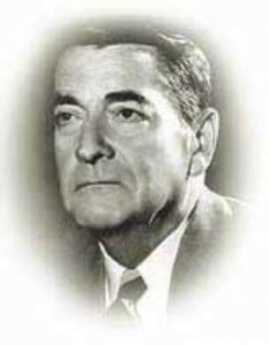
|
| Edgar M. Queeny |
with roughly 250,000 barrels of specialty chemicals in its hold, let go its moorings to the Monsanto Chemical dock directly across the river in New Jersey, intending to turn around and head upstream to discharge the rest of its cargo at the Mantua Creek Terminal near Paulsboro. Curiously, a tanker is more likely to explode when it is half empty because there is more opportunity for mixing oxygen with the combustible liquid sloshing around. A tug stood by to assist the turn, but the master of the Queeny felt there was ample room to make the turn under her own power. With no one paying particular attention to this routine maneuver, the Queeny seemed (to only casual observers) to head directly across the river, ramming straight into the side of the Corinthos. Actually, the Queeny had engaged in a number of backing and filling maneuvers, and the sailors aboard were appalled that it seemed to lack enough backing power to stop its headlong lunge at the Corinthos. There was an almost immediate explosion on the Corinthos, and luckily the Queeny broke free with only its bow badly damaged. Otherwise, the fire might have been twice as large as it proved to be with only the Corinthos burning. The explosion and fire killed twenty-five sailors and dockworkers, burned for days, devastated the neighborhood and occupied the efforts of three dozen fire companies. A graphic account of the fire and fire fighting was written by none other than Curt Weldon who was later to become Congressman from the district, but was then a volunteer fireman active in the Corinthos tragedy.
There were surprising water shortages in this fire on the river because the falling tides would take the water's edge too far away from the suction devices for the fire hoses on the shore. The tide would also rise above a gash in the side of the burning ship, floating water in and then oil up to the point where it would flow out of the ship onto the surface of the river. Oil floated two miles upstream from the burning ship and ignited a U.S. Navy destroyer which was tied up at that point. Observers in airplanes estimated the oil spill was eventually fifty miles long. All of these factors played a role in the decision whether to try to put the fire out at the dock or let it burn out; experts continue to argue which would have been better. There were always dangers the burning ship would break loose and float in unexpected directions, that the oil slick would ignite for its full length, and that storage tanks on shore would be ignited. The initial explosion had blown huge pieces of iron half a mile away, and the ground near the ship was littered with charred, dismembered pieces of flesh from the victims.
, Of course, there was a big lawsuit. When a ship is tied up at a dock it certainly feels aggrieved when another ship crosses a river and rams it. The time-honored principle of admiralty law holds that the owner of an offending ship is not liable for damages greater than the salvage value of its own hulk, which in this case might have been about $3 million. The underlying assumption is that the owner has no way of knowing what is going on thousands of miles away, no control over it, no power to respond in a useful way. Enter Richard Palmer, counsel for the Corinthos. Palmer was aware that the National Transportation Safety Board collects information about ship maintenance inspections in order to share useful information for the benefit of everyone. His inquiry revealed that the inspections of the Queeny for four years before the crash had repeatedly demonstrated that the stern engine had a damaged turbine, and was only able to drive the ship at 50% of its rated power. Why this turbine had not been repaired was now irrelevant; the owners of the ship did have relevant information and had failed to act in a timely safe fashion. The limitation of liability to the salvage value of the hulk now no longer applied if the negligence was judged relevant. The defendants, the owners of the Queeny, decided to settle. While the size of the settlement is a secret of the court, it is fair to guess that it approached the full value of the suit, which was $11 million. Mr. Palmer, by using his experience to surmise that maintenance records might be available at the Transportation Agency, and recognizing that the awareness of the owner might switch the basis for the compensation award from hulk value (of the defendant's ship) to the extent of the damage (to the plaintiff's ship), probably tripled the damage settlement.
Reflections on the extraordinary benefit to the client from a comparatively short period of work by the lawyer leads to a discussion about the proper basis for lawyers fees. Senior lawyers feel that the computer has revolutionized lawyer billing practices, and not for the better. Because it is now possible to produce itemized billing which summarizes conversations of less than a minute in duration, services for the settlement of estates can be many pages long, mostly for rather routine business. Matrimonial lawyers are entitled to charge for hours of listening to inconsequential recriminations; lawyers can bill for hours of time spent reading documents into a recording machine, or sitting wordlessly at depositions. Since the time expended can now be flawlessly measured and recorded on computers, there is little room for a client to remonstrate about their fairness. Discomfort about this system underlies much sympathy for billing for contingent fees, where the lawyer is gambling all of his expenses and effort against a generous proportion of the award if he wins the case, nothing at all if he loses. This latter system, customary in slip and fall cases and justified as permitting the poor client to have proper representation, undoubtedly promotes questionable class action suits and often leads to accepting personal liability suits which should be rejected for lack of merit. The thinking underlying personal injury firms is widely said to be: most insurance companies will settle for modest awards in cases without merit because the defense costs would be no less than that amount, and occasionally a personal liability case gets lucky and extracts a huge award.
Listen to one old-time lawyer describe how legal billing used to be. After the case was over, the lawyer and the client sat down to a discussion of what was involved in the legal work, and what it accomplished for the client. A winning case has more evident value than a losing one, provided the lawyer can effectively describe the professional skills that helped bring it about. The whole discussion is aimed at having both parties leave the discussion satisfied. To the extent that both parties actually are satisfied with the value of the services, the esteem and reputation of the legal profession are enhanced. And the lawyer is a happy and contented member of a grateful community. If he can occasionally claim a staggering fee for a brief but brilliant performance, as in the case of the explosive fire on the Corinthos -- well, more power to him.
It does not take much familiarity with oil refineries to make you realize that cargoes of crude oil are a very dangerous business. We are accustomed to hearing jeers at those who protest, "Not in my backyard", and we deplore those who would jeopardize our national security to protect a few fish and trees in the neighborhood of potential oil spills. Since we do have to import oil and we do therefore have to jeopardize a few selected neighborhoods to accomplish this vital service, the opponents are sadly destined to lose their protests. But that doesn't mean their concerns are trivial. The shipping and refining of oil are dangerous. We just have to live with it and be ready to pay for its associated costs.
HSP: Philadelphia's Attic
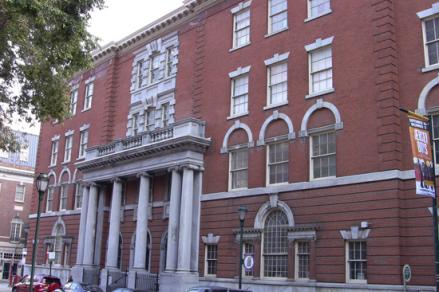
|
| Historical Society of Pennsylvania |
There was a time when the mission of the HSP (Historical Society of Pennsylvania) was clearly and proudly centered on the history of Philadelphia's old families. There generally comes a time in every family when its accumulation of stuff requires facing the fact that many possessions are too valuable to sell and too bulky to store. HSP in time became a place where families contributed these objects of memory and value, at least keeping them out of the hands of antique dealers when dusting and ensuring them became a burden. When many families entered into such a joint venture, the shared goals and experiences created a tradition over time which was reassuring to the donors. The famous lawyer Howard Lewis came to the board of HSP at a time when it was facing up to some of its own problems.
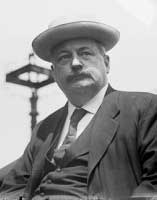
|
| Boies Penrose |
The then Board Chairman Boises Penrose came to the young lawyer one day and told him it was time he joined the board. Well, why? Because your grandfather was once Chairman of the Board; no other explanation was offered. Howard Lewis recounts that it was his introduction to a Philadelphia fact: some board appointments are hereditary. He dutifully joined.
It became apparent that HSP was a museum of immensely interesting artifacts, including decorations used at the Machianza of 1778, a copy of the handwritten originals of the Declaration of Independence and the Constitution, and ten thousand other curious of great interest. It was a place to visit one's family relics, it was a great place to hold a party. It had a three million dollar endowment in 1969. But it had a big problem: essentially no one visited the museum. It isn't hard to imagine the anguish waiting for anyone who stirred up the hornet's nest by pointing out the obvious problem. You can't fire hereditary directors, so hereditary directors don't budge in an argument. You can make hired staff into scapegoats and fire them; that doesn't accomplish much, although it is commonly tried. The Genealogy Society is a natural partner of Philadelphia's attic, but although the two partners were intimately mixed, natural partners who can't be fired add to the scene.
Things went on. Boies Penrose held board meetings which lasted precisely forty-five minutes. He had a train to Devon to catch at 5:15, so meetings ended at 4:45 PM, precisely. Even when a speaker was in mid-sentence, the gavel banged down at 4:45. Eventually this impasse was broken by reaching an agreement with the Atwater Kent Museum to the effect that historical three-dimensional objects would go to the Atwater Kent, freeing up 40% more library space for the two-dimensional papers, maps, and documents which were to become the main focus of the new HSP. More separation between HSP and the Genealogy Society was effected. Much of this was made possible by the extraordinary investment ability of Ralph Kynette, who had run the endowment up to $18 million, in spite of maintaining a spending rule of 9%. There are not many non-profit organizations which can match such a performance.
The reorganized HSP floundered a bit, and then it had the good fortune to enter into a merger with the Balch Institute. The Balch also had a store of valuable papers, but its main mission was educational. The addition of this educational effort to the more static museum and library functions has allowed the recruitment of ambitious staff, and a considerable redirection from Olde Philadelphia to the city as it now is.
In the course of the many reexaminations which all this reorganization stirred up, some familiar issues in non-profit administration had to be faced. The American Museum Association is firm in its principles that no asset in the archives of a museum may ever be sold, except to purchase some other asset which comes closer to the museum's stated mission. The underlying sense of this rule is plain: it would be unfortunate for paid staff to sell artwork for the purpose of sustaining or raising their own salaries. Unfortunately, in a great many instances, collection value has grown more rapidly than the size of the endowment to preserve the collection. That's about the size of the problem at the Barnes Museum, where collections worth many billions cannot be touched to raise money to protect and display them. It is confidently asserted that the Barnes has many objects in its basement which could easily correct its endowment imbalance, but the AMA rule prevents it. The Barnes must now be moved to a new county to overcome this impasse. It all seems like an awkward way to solve one problem by creating another, but the lawyer in Howard Lewis takes it in quite an unexpected direction.
It is his view that locking the museums of the nation in this position creates a constantly shrinking market in the artwork; when a museum acquires a piece of art it forces it to enter a one-way tunnel, never to reappear on the market. A constantly shrinking market of salable art raises prices, and it does so in a way that resembles a violation of the Clayton Antitrust Act, the beneficiaries of which are the art dealers, art collectors and artists of the world. Add to this injury to competition, the tax benefits of creating or holding a constantly appreciating market; and it really is an uncomfortable thing to consider in depth. The American Museum Association ought give serious consideration to finding alternative routes to its legitimate goals. One of the other probably unintentional results of this rule are that the donation of a valuable piece of art to a museum is very likely to lead to its instant sale for cash. The reasoning here is that the donation has not yet been "taken into the collection", and thus it can be sold without violating the Museum Association rule. People who wear wigs while sitting on a bench may consider this a valid interpretation, but when you set about trying to fashion a better museum rule, this rebuttal seems highly contrived.
If we should someday set about to re-examine what we are doing in the legal thicket of museums, we might consider how the principles of non-profit accounting for museums might be fundamentally modified. Since a non-profit is thought to generate no profits, its financial health cannot be measured by the size of its profits. Consequently, it is traditional to account for the finances of a non-profit by measuring whether its assets have grown or declined. However, conducting an annual appraisal of all the artwork in a museum that never sells anything is a monumental expense without any other purpose than to satisfy the accounting rule. Consequently, I'll tell you a little secret. Absolutely everyone ignores the issue, and the annual audits are totally uninformative if not misleading. Who's going to hang the bell on this cat?
Computer Adjectives

|
| ENIAC museum |
We are indebted to Paul W. Schaffer, the curator of the ENIAC museum, for the novel concept that much of the complexity of modern computers can be reduced to a few adjectives. Before we get to that, let's explain how "computing" was done before the University of Pennsylvania revolutionized it.
We once (1940-55) used calculating machines, which are sort of overgrown calculators. As big as baby grand pianos, bearing no resemblance at all to hand calculators which sit on top of desks, calculating machines were noisy as all get-out. A typical "calculating shop" used to contain eight or ten machines, each with a specialized function. Key-punch machines, usually several of them, put holes in cards to be fed into the machines. A couple of sorting machines, to count the holes in the cards and shuffle them into pockets for specified holes, specified by temporary wiring boards on the back of the machine. A collator, which was capable of more complicated sorting and sequencing. And the calculator itself, which was able to count various combinations of holes in cards, and even print out the calculations on very large rolls of paper tape with perforated holes along the edges. Five or six trained operators would move the piles of cards around, feeding them into the appropriate machines in a prescribed order. Sitting off in a corner was the super-operator, whose job it was to design the sequences of manipulation minute and string wires around a wiring board at the back of the machines. His were the brains of the calculating system, and the wires were strung around in accordance with his design. My recollection is that IBM refused to sell these machines, and a typical cluster rented for $1100 a month in 1955. The Pennsylvania Hospital was considered very advanced for having this arrangement as its billing system, but its primitive quality can be seen in the system architecture. The whole system revolved around the concept of producing a bill for every patient in the hospital, every day. If the patient went home, he was given the latest bill. If he remained another day, the old bill was discarded and a new updated one made. It was simple, it was clever, and please don't tell Jefferson. (On the other hand, something appears very wrong about all this progress that fifty years later, the same hospital with hundreds of computers, today cannot produce a hospital bill within a month of patient discharge.)
Well, back to adjectives. John Mauchly the mathematician came to the fundamental recognition that just about everything in mathematics and calculating could be done by "iteration", and re-iteration. Don't be afraid of the words. They only mean you take a small piece of arithmetic, and perform it over and over, millions of times. You really don't need to redesign new machines for each new process, since anything you might want to do could be done by reducing it to the same sort of iteration. So there's the first adjective: Mauchly's iterative design concept amounted to a "general purpose" computer. Many different patterns, perhaps, but all performed on the same machine, just as many different pieces of music are performed on the same piano.
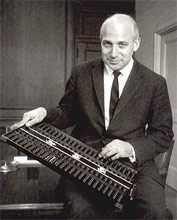
|
| John Presper Eckert, |
His graduate student, John Presper Eckert, eliminated the moving parts. Instead of metal hammers and prongs moving around, Eckert moved electrons. This step vastly increased the speed of the processing and even decreased effective maintenance. The early computers required a man to go around with a wheel-barrow, constantly replacing vacuum tubes as they burned out. But by moving electrons instead of mechanical parts, the iterative speed was so great that overall maintenance, per million calculations, was less. Eckert gave us the "electronic" computer. Together with Mauchly, the two ideas blended into the electronic, general purpose, computer.
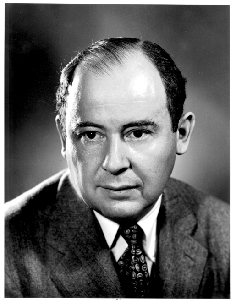
|
| John von Neumann |
So then along came John von Neumann, observing this thing at work. Millions of punched cards were fed into the machine, but the holes in the cards represented data; the instructions were still wired in by physically connecting one contact to another, which had to be changed when the instructions changed. Von Neumann immediately saw how to get rid of half of this non-electronic effort. His contribution was to punch the instructions into program cards and feed them into the machine when the program instructions changed. So now, we had "stored instruction sets". As we still have today, the trio created the idea of a stored-instruction, general purpose, electronic computer, and actually made a working model of it. That's what promoted it ahead of the Mark I and other mechanical computers that had been developed in Europe. Vastly increased speed, vastly decreased costs -- and lots of big bucks for the manufacturer.
So, off to court, to sue for patent protection. Thousands of patents have been granted for various small innovations in the system, but who was entitled to claim ownership of the basic idea? Who invented the general purpose, electronic, stored-instruction calculator? Some puzzled judge finally worked his way out of that jig-saw puzzle by declaring that no one owned the right to have an overall patent. His reasoning was that since von Neumann had rushed to publish his work rather than rushing to the patent office first, it had become the property of the public and no longer belonged to the inventor. Compared with the contributions of a great many present computer billionaires, it really seems as though Mauchly, Eckert and von Neumann were conservatively entitled to a trillion dollars apiece. But life is not fair, and the law is an ass. Or is that so?
In later lawsuits, of which there were a great many, it came out that Mauchly and Eckert were employees of the University of Pennsylvania. They did what they were told to do and were paid for doing it. Maybe the University is entitled to trillions, thereby allowing them to pay their history professors better. But then, one final idea. The University accepted government money to do the job. Maybe all us citizens are entitled to trillions since we collectively commissioned and paid for this work. So, to recover, we seek out a class action lawyer. Standard procedure for class action lawyers is to take most of the money for themselves, sending each member of the class a share which is less than the postage required to send it.
The final outcome in this particular case was a suit between Honeywell (in Minneapolis) and Univac in Philadelphia. Univac essentially decided to go into the patent infringement business and Honeywell refused to pay royalties. Meanwhile, IBM engineers had been called as consultants for some rush job and reported to Mr. Watson that those people in Philadelphia had something really great. So, IBM paid several million to settle the patent infringement claim and started to mass-produce these things, with economic success everybody knows about. Meanwhile, the Honeywell/Univac case droned on and was eventually won by Honeywell when they produced a professor from Iowa who claimed he had the same ideas earlier. The computer concept was thus declared to be "prior art", preventing patent enforcement. By that time, IBM had such a long lead on the litigants, that the market was theirs, and IBM competitors just sort of dwindled away.
Philadelphia's Big Ben
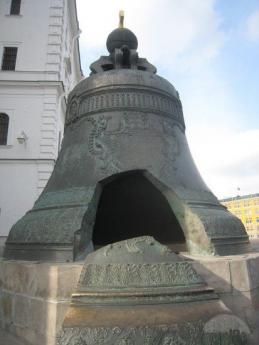
|
| Worlds largest bell in St. Petersburg, Russia |
The largest bell in the world is reported to be in St. Petersburg, Russia, but the second largest is in Philadelphia. No, it isn't the Liberty Bell, which is cracked and dysfunctional, but smaller in any event. The bell sound is so penetrating it seems to come from everywhere, so it isn't surprising that many people believe it must be coming from the tower of City Hall. That's fairly close, but in fact, the bell is atop the former PNB building across the street between Chestnut and Market. When that so-and-so rings, you feel it in your bone marrow even if you are five blocks away. Because it's so big, its note has a very long period of decay, with the result that when it rings it rings very slowly and deliberately.
People who have been there reported the surprising news that there is a penthouse apartment right underneath the bell, which is so well insulated that you can hardly hear the bell toll. Underneath that, however, are suites of offices where the ringing of the bell vibrates enough to knock the fillings out of your teeth. The law department of the Philadelphia National Bank used to be right in the midst of those offices. It's reported that the lawyers in the place were busy at 11 AM every day, inviting somebody, anybody, to go out for lunch. Meet you at the restaurant or club at 11:45.
Cost of Medical Care
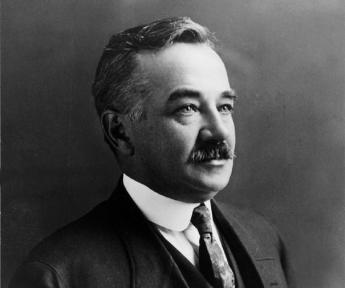
|
| Milton S. Hershey |
On several occasions, Richard A. Kern M.D. (1891-1982) told the story of his part in the founding of the Hershey School of Medicine. Dick Kern was a distinguished professor of Medicine at Temple University, well known for his contributions in the field of asthma and allergy, a past president of the College of Physicians of Philadelphia, and a former Grand Master of Pennsylvania Freemasonry. The Milton S. Hershey School was considering the creation of a medical school and needed advice.
Milton Hershey had been a strict Mennonite, which is closely related to Quakerism, and had accumulated a huge fortune making chocolate candy. He left generous trusts to endow a theater and various other public services in the town of Hershey, but his ownership shares in the chocolate company had been left to the Hershey School for orphans. The value of the shares had far outgrown the ability of the school to employ them usefully, and they were considering a medical school. In 1963, as at present, everybody else was wondering how to get out from under the crushing cost of running a medical school. The sudden inquiry from a donor both willing and able to start a whole new medical school from scratch was an opportunity not likely to appear again soon. Kern carefully considered the options, including the danger of scaring off the naive potential donors with too high a price. Finally, he screwed up his courage and suggested a price to the trustees, of fifty million. The prompt answer was, done, you've got your medical school.
In due course, Kern found himself on the platform at the inaugural ceremonies of the school, sitting next to the guest of honor, that man who had made such an instant decision. Chatting amiably, Kern mentioned that he had always wondered how high the Hershey Foundation would have been willing to go. The answer was just as prompt as the original one. "Hundred-twenty."
Greenwich, Where?
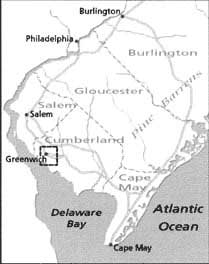 |
| Greenwich NJ |
If you sail north up the Delaware Bay, you would go past Rehoboth, Lewes, Dover, New Castle, Wilmington -- on the left, or Delaware side. On the right, or New Jersey side, it's a long way from Cape May to Salem, the first town of any consequence. That is, the Jersey side of the riverbank is still comparatively uninhabited. When the first settlers came along, with vast areas to choose among, it might have seemed attractive to settle on the Delaware side, because the peninsular nature of what is now called Delmarva (Del-Mar-Va) would provide land access to two large navigable bays, the Delaware, and the Chesapeake. To go all the way up the Delaware to what is now Pennsylvania would give trading access to a whole continent, so that eventually proved to be where immigration was headed. But as a matter of fact, the marshy Jersey shore seemed more attractive for settlement by the earlier settlers.
A settler has to think about starving the first year or two, because trees have to be cut down, and stumps pulled up before the land can even be plowed. After that, comes planting and growing, then finally harvesting. Trees, behind which Indians can hide, are a bad thing all around in the eyes of a settler. The flat swampy meadows of the Jersey bank were just exactly what the Dutch knew how to manage. Dam up the creeks and drain the ground, and you will soon have lots of lands ready for the plow, without any confounded trees. By the end of the seventeenth century, the English who had made the mistake of settling in rocky Connecticut finally saw what the Dutch were able to do, and came down to take it away from them.
 |
| Greenwich scenery |
That's why there is a Salem, New Jersey, and also a Greenwich, New Jersey. Greenwich ( around here they pronounce it green-witch) had 870 residents at the last census. It is one of the cutest little colonial villages you are likely to encounter. The local historians refer to it as an unreconstructed Williamsburg, drawing prideful attention to the fact that these houses were really built in the colonial period, and are in no way imitation reconstructions. The isolated charm of this place is in large part due to being surrounded by a maze of wandering creeks, so visitors by land travel don't get there in time for lunch unless they take great care to follow a local road map. If you arrive by water, it's no problem; just navigate up the crooked and twisting Cohansey River.
Although pioneer settlement was much earlier, the oldest house still standing in that rather damp area was built in 1730. Things are pretty much the way they were before the American Revolution because the Calvinists who settled here were not prepared for the Jersey mosquito, which obviously is abundant in such a marshy area. With the mosquito comes relapsing (Vivax, malaria, black water (Falciparum) malaria, and Dengue Fever (graphically known locally as break-bone fever). As a matter of fact, encephalitis is also mosquito-borne. When you don't understand the insect carrier situation, survival in such an environment depends on local fables and lore, like going to the mountains for the summer after the planting season, and only returning at harvest time. That sounds to a New Englander newcomer like a superstitious cloak for lazy living, especially since masses of fish come up the river in teeming waves, looking for mosquitoes to eat. So, Greenwich is charming, but it never was thriving.
Working hard to find something to say about the town, it would appear that Paul Revere himself came riding into Greenwich in December 1774, urging the town to join their Boston relatives in the destruction of tea belonging to the British East India Company. Greenwich accordingly had a public tea burning on December 22. Since the more notorious Boston tea party took place on December 16, 1773, and the British Tea Act was passed in May, 1773, it is not exactly accurate to say the rebellion spread like wildfire. One has to suppose that the inflammatory tale told to the local farmers by Paul Revere was likely a little enhanced, since a careful recounting of the events in Boston suggests a number of ways the uproar might have been avoided if Samuel Adams and his friends had been less provocative. Or if Massachusetts Royal Governor Thomas Hutchinson had been less flighty. Or for that matter, if Benjamin Franklin had restrained himself when he got hold of Hutchinson's letters at a critical moment when he was in London. In retrospect, the best model for behavior was provided by the Royal Navy; the whole Boston Tea Party was surrounded by armed British naval vessels, who did not lift a finger throughout the demonstration.
Anyway, little Greenwich had its minute of fame with a tea burning. Otherwise, it has had a very quiet existence for three centuries.
REFERENCES
| Paul Revere & The World He Lived In | Amazon |
New Jersey: A Keg Tapped at Both Ends (2)
 The New Jersey legislature first fought for Independence, then about debts, then railroads and corporations, and now -- about debt, again. 
|
The New Jersey legislature ratified the Declaration of Independence in the Indian King Tavern of Haddonfield, then moved to Princeton and ever since has been in Trenton. The Statehouse in Trenton is the second oldest in the nation, after the one in Annapolis, although it has grown like a snail with the original building nestled inside many additions. In one sense it is totally unique; it's the only state capitol in the nation where you can look out a window and see another state. It's right on the water's edge of Delaware, a hundred yards from those Hessian barracks that Washington surprised in 1777.
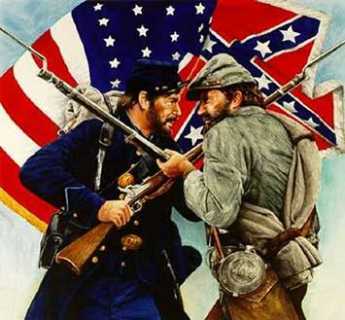
|
| Rivals, North and South |
In its early years the legislature concerned itself with raising troops during the Revolution. After that, it spent a great deal of time settling debts to pay for the Revolution. From that arose the traditional rivalry, even hostility, between the northern and southern halves of the state. To some degree, this reflects the two original provinces of East Jersey (Scottish Quakers) and West Jersey (English Quakers), but the Quaker character persisted much longer in West Jersey. The northern half, with many Dutch settlers spilling over from New York and Congregationalists from Connecticut, evolved into mainly a population of debtors; debtors enjoy inflation because it cheapens the cost of their repayments. The southern half of New Jersey, persistently Quaker in the settlement, was where creditors lived; creditors want to recover the value of the money they risked, so they hate inflation. The Mason Dixon line, extended, would cross southern New Jersey. However, it was the northern half of the state which favored the Confederacy during the Civil War, whereas the Quakers in the south were strongly opposed to slavery. Later on, irritation over permitting Atlantic City gambling was one of the various issues which eventually prompted South Jersey to try to secede from the northern spendthrifts; the secession proposition was actually on the ballot in the late Twentieth Century. Up until 1966 the Republicans always dominated the Senate, but that was because each of the 21 counties had one senator, and you can't gerrymander county lines. Then, it was deviously proposed that the state should be re-divided into 40 numerically equal Senatorial districts (i.e. instead of counties); the Senate has had a Democratic senatorial majority more or less ever since, in spite of numerous Republican majorities in state-wide elections. The legislative districts in the Assembly are reapportioned every ten years to respond to the new census; it is close to the facts that the subsequent gerrymandering of that decennial reapportionment effectively forecloses the politics (and predicts the agenda outcome) within the Assembly for each subsequent decade. In recent years, state Congressional delegations have all become increasingly polarized as a result of partisan gerrymandering. New Jersey leads the way in this unfortunate process: the Assembly and the Congressional delegation are polarized in what has become a national pattern, but in addition, its state Senate is permanently gerrymandered by substituting "districts" for "counties", and redrawing the boundaries in the state constitution.
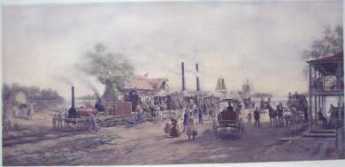
|
| The Amboy and Camden Railroad |
Over time, the early legislature devoted most of its time to chartering corporations, because there were no universal corporation laws and each new corporation required a separate legislative charter. During the early Industrial Revolution, a great many new businesses sought the authority to limit investor liability. Each corporation had its own enabling act and hence its own deal, its own set of rules and conditions open to limiting amendments by competitors or favorable restatement at the urging of lobbyists. Along came the first railway in America, Stevens's conception of the Amboy and Camden Railroad. The New Jersey legislature, no doubt persuaded by private inducements, not only gave the Amboy and Camden permission to use eminent domain to acquire its right of way, but also conferred a perpetual tax exemption, and perpetual railroad monopoly. For the next fifty years, the legislature then concerned itself with hardly anything except railroad matters. As Willie Sutton said about banks, that was where the money was.
Perpetual is a pretty unambiguous adjective, of course, and it might be an interesting topic in judicial gymnastics to observe how the state would get itself out of the impossible economic straight-jacket of conferring a perpetual monopoly on only one railroad. It proved achievable, however, when the proprietors of a new Stanhope Railroad slipped exemptions and enabling legislation for itself into one of the thousands of corporation bills which flooded through the legislature, unread by anyone except the authors. After the Governor who also hadn't read the bill, signed this sleeper into law, the uproar was predictably loud and accusatory. In a sense, the wrangle about New Jersey railroads was not finally settled by the legislature at all but by the Pennsylvania Railroad, which crossed Delaware at Trenton, and went south to Philadelphia along the Pennsylvania side of the river. New Jersey had not only lost the advantage of railroad competition, but it had also essentially lost all of the main North-South railroad traffic made possible by improved bridge construction methods. Almost all rail traffic was East-West, and the Pennsylvania RR soon captured national dominance. Among other things, railroads thus avoided the expensive hidden costs of going before the New Jersey Legislature. New Jersey preferred to seek a new constitution with a new organization of matters, but one thing about New Jersey never seems to change. Between eleven and twelve thousand bills are still introduced every year. Overloading the attention of the legislators creates the main opportunity for corrupt politics in all legislatures, and is the central strategy for its concealment. It's even worse than New Jersey actually passes about 300 laws a year by sitting for a hundred hours in plenary session: the legislature sits for 30 or 40 three-hour sessions in the afternoon each year, usually Monday and Thursday, from November to May. We try to be a nation of laws and not of men, but it would be hard to praise the application of that truism in New Jersey, where quite obviously the Governor does most of the governing, and deciding, and dispensing. Recent Governors have evidently preferred to borrow money rather than pay any attention to balancing a budget, since New Jersey has gone during fifty years from having no income or sales tax to having the highest of them both, and the highest property taxes, plus $50 billion in debt. Let's repeat the central point: the thing which will matter for a decade is how the legislature gerrymanders the voting districts after the 2010 census. The second source of corruption is the severe limitation of individual political contributions, combined with a lack of limits of donations to the County political machine; the machine totally dominates all New Jersey nominations, and by gerrymandering can ignore the general elections. The public has discovered that this process leads to the second-highest state tax rate in the nation, and wealthy people are fleeing to other states in noticeable numbers. Since wealthy people pay a disproportionate share of taxes, the disappearance of this tax source throws a major tax burden onto those with lower incomes. As this process spirals out of control, something about it must change.
| Posted by: K | Jan 4, 2012 7:11 PM |
| Posted by: Hi | Feb 22, 2011 2:00 PM |
| Posted by: me | Mar 21, 2010 12:22 AM |
| Posted by: yo | Jan 12, 2010 11:15 PM |
69 Blogs
William Penn Conducts a Witchcraft Trial
 A public official has to obey the law, and conform to the traditions of his office, even if it is obvious that he thinks the whole thing is silly and unfair.
A public official has to obey the law, and conform to the traditions of his office, even if it is obvious that he thinks the whole thing is silly and unfair.
William Penn: Visionary with Persuasiveness
 Even when we know how it eventually turned out, it is hard to imagine how William Penn would dare to suppose the King might give him Pennsylvania, and even harder to understand how he managed to negotiate the agreement.
Even when we know how it eventually turned out, it is hard to imagine how William Penn would dare to suppose the King might give him Pennsylvania, and even harder to understand how he managed to negotiate the agreement.
Concessions and Agreements
 Most 17th Century colonies were proprietorships, requiring agreements for local autonomy without losing allegiance to the home country. William Penn cleverly expanded the New Jersey document into the intellectual precursor of the U.S. Constitution.
Most 17th Century colonies were proprietorships, requiring agreements for local autonomy without losing allegiance to the home country. William Penn cleverly expanded the New Jersey document into the intellectual precursor of the U.S. Constitution.
East Jersey's Decline and Fall
 Some day, a novelist will make East Jersey famous. There's lots of material there.
Some day, a novelist will make East Jersey famous. There's lots of material there.
Jury Nullification
 William Penn demonstrated one of the most incisive legal minds in England by trapping the British courts in what remains a central unresolved dilemma for the law. He was the defendant in his own case. By the South's way of looking at things, it was a pacifist effort to restrain mindless abolitionism. Meanwhile, both sides calculated it would win if the South decided to fight.
William Penn demonstrated one of the most incisive legal minds in England by trapping the British courts in what remains a central unresolved dilemma for the law. He was the defendant in his own case. By the South's way of looking at things, it was a pacifist effort to restrain mindless abolitionism. Meanwhile, both sides calculated it would win if the South decided to fight.
The King's Last and Final Word
 King Charles II did give Wilkes-Barre to Connecticut first, and the same king did later give the same land to William Penn. Unfortunately for Connecticut, at that time the last word was all that mattered.
King Charles II did give Wilkes-Barre to Connecticut first, and the same king did later give the same land to William Penn. Unfortunately for Connecticut, at that time the last word was all that mattered.
William Allen, Tory
 History is written by the victors, so the rich Tory William Allen is largely forgotten. But he was Chief Justice, probably the richest man in the colony, the son in law of Andrew Hamilton and the father in law of John Penn, the Proprietor, and Governor.
History is written by the victors, so the rich Tory William Allen is largely forgotten. But he was Chief Justice, probably the richest man in the colony, the son in law of Andrew Hamilton and the father in law of John Penn, the Proprietor, and Governor.
Articles of Confederation: Flaws
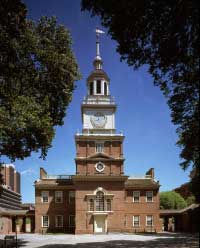 Some subtle features make the Constitution a vast improvement over the Articles of Confederation.
Some subtle features make the Constitution a vast improvement over the Articles of Confederation.
Perpetual?
 If you get careless with your words, you may have to renounce them. The Articles of Confederation were stated to be perpetual, so maybe the Constitution is impertinent. Maybe someone would say it was treason.
If you get careless with your words, you may have to renounce them. The Articles of Confederation were stated to be perpetual, so maybe the Constitution is impertinent. Maybe someone would say it was treason.
John Dickinson, Quaker Hamlet
 John Dickinson was the most respected lawyer and politician of his time. He had a lot to do with writing the Declaration of Independence but refused to sign it.
John Dickinson was the most respected lawyer and politician of his time. He had a lot to do with writing the Declaration of Independence but refused to sign it.
A Pennsylvania Farmer in Delaware
 John Dickinson achieved national fame in 1773 by publishing twelve letters written earlier denouncing the Townshend Acts. They were published anonymously as Letters From a Pennsylvania Farmer. His farm, curiously, was in Delaware.
John Dickinson achieved national fame in 1773 by publishing twelve letters written earlier denouncing the Townshend Acts. They were published anonymously as Letters From a Pennsylvania Farmer. His farm, curiously, was in Delaware.
Pennsylvania Prison Society
 When the British monarchy put William Penn in jail, they set in motion a social movement which has changed prison management more than it changed Penn.
When the British monarchy put William Penn in jail, they set in motion a social movement which has changed prison management more than it changed Penn.
Parliamentary Procedure (1)
 Presiding over the Senate at Sixth and Chestnut, Vice President Thomas Jefferson observed pretty earthy behavior. So he wrote a book praising the rules of the British Parliament. Things must have been pretty bad if he, of all people, chose that model.
Presiding over the Senate at Sixth and Chestnut, Vice President Thomas Jefferson observed pretty earthy behavior. So he wrote a book praising the rules of the British Parliament. Things must have been pretty bad if he, of all people, chose that model.
Parliamentary procedure(2)
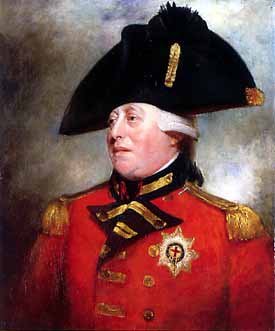 Parliament once was the model for civil discourse, but the corporate model supplanted it. Now, it's all the lengthened shadow of one man, the CEO. King George III learned what happens when you annoy Americans with that style.
Parliament once was the model for civil discourse, but the corporate model supplanted it. Now, it's all the lengthened shadow of one man, the CEO. King George III learned what happens when you annoy Americans with that style.
IF ALL MEN WERE ANGELS, NO CONSTITUTION WOULD BE NECESSARY
 A lot of shrewd thinking went into the checks and balances of the Constitution, some of it in quaint language.
A lot of shrewd thinking went into the checks and balances of the Constitution, some of it in quaint language.
On the Subject of Rights
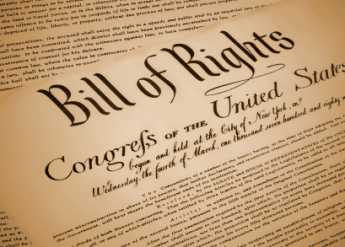 Human rights were mainly a religious issue to the Founding Fathers, demanding a Bill of Rights to signify God's supremacy over legislatures. When John Marshall transformed the Constitution into the capstone of the legal system, constitutionally affirmed rights became a legal trump card for those who feared or opposed the actions of the government. With that difference, it's little different, two hundred years later.
Human rights were mainly a religious issue to the Founding Fathers, demanding a Bill of Rights to signify God's supremacy over legislatures. When John Marshall transformed the Constitution into the capstone of the legal system, constitutionally affirmed rights became a legal trump card for those who feared or opposed the actions of the government. With that difference, it's little different, two hundred years later.
Unwritten Features of the Constitution
 Considerable anger is sometimes directed toward Judges who find unintended provisions in the Constitution. On the other hand, James Madison and some other Founding Fathers were careful to design the Constitution to create outcomes that are far from explicit.
Considerable anger is sometimes directed toward Judges who find unintended provisions in the Constitution. On the other hand, James Madison and some other Founding Fathers were careful to design the Constitution to create outcomes that are far from explicit.
Government Features Under Stress
 A major strength of the U.S. Constitution is that it comfortably adjusted to consequences it had not foreseen. Equally important is its ability to encompass developments no one could have foreseen.
A major strength of the U.S. Constitution is that it comfortably adjusted to consequences it had not foreseen. Equally important is its ability to encompass developments no one could have foreseen.
Constitution V: The Unforeseeable
The sturdiness of the American Constitution emerges from surveying the way it copes with huge changes which could not possibly have been foreseen.
Eleventh Amendment
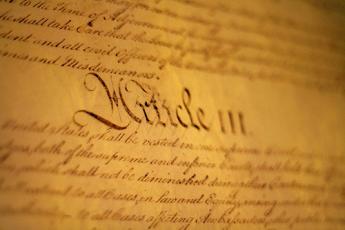 Since the Bill of Rights doesn't really count as corrections, the Eleventh Amendment is sort of the first attempt to change the Constitution. In retrospect, the purpose seems unclear.
Since the Bill of Rights doesn't really count as corrections, the Eleventh Amendment is sort of the first attempt to change the Constitution. In retrospect, the purpose seems unclear.
The Supreme Court Arrives, A Little Late
 The third branch of government took a generation to establish its place, and John Marshall made it happen. If you love the Supreme Court, you probably hate Thomas Jefferson.
The third branch of government took a generation to establish its place, and John Marshall made it happen. If you love the Supreme Court, you probably hate Thomas Jefferson.
Unwritten Constitution
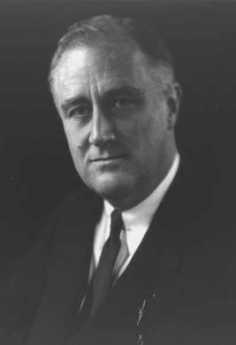 The Twenty-second Amendment to the U.S. Constitution serves an excellent purpose, even though the 80th Congress which proposed it may have had quite different motives.
The Twenty-second Amendment to the U.S. Constitution serves an excellent purpose, even though the 80th Congress which proposed it may have had quite different motives.
Delaware's Court of Chancery
 Georgetown, Delaware is a pretty small town, but it's where the major corporations of the nation plead their case.
Georgetown, Delaware is a pretty small town, but it's where the major corporations of the nation plead their case.
Fees for Trial Lawyers, Section 1983 Variety
 Suing your own town is now getting so popular it clogs the courts.
Suing your own town is now getting so popular it clogs the courts.
Following the Rules
 Arlen Specter's tribulations while becoming the chairman of the Senate Judiciary committee.
Arlen Specter's tribulations while becoming the chairman of the Senate Judiciary committee.
Unwritten Lessons For the European Union
 The Europeans, trying to unite 27 countries into one, should study America's problems uniting 13 colonies in 1787. It isn't easy, and it gets harder with increasing the numbers of participating states.
The Europeans, trying to unite 27 countries into one, should study America's problems uniting 13 colonies in 1787. It isn't easy, and it gets harder with increasing the numbers of participating states.
Owen Roberts
His old law firm devotes a reception room to his name, but not everyone is pleased with either his writing the documents establishing the Barnes Foundation, or his capitulation to Franklin Roosevelt
Owen Roberts: A Switch in Time
 His old law firm devotes a reception room in his name, but not everyone is pleased with his writing the documents establishing the Barnes Foundation, or his capitulation to Franklin Roosevelt's threat to pack the US Supreme Court.
His old law firm devotes a reception room in his name, but not everyone is pleased with his writing the documents establishing the Barnes Foundation, or his capitulation to Franklin Roosevelt's threat to pack the US Supreme Court.
Seventeenth Amendment
 The consequences of this little-noticed amendment should be re-examined.
The consequences of this little-noticed amendment should be re-examined.
Patent Pending
 The provision for patents is part of the Constitution, and seems a little out of place. The motion was made by James Madison and seconded by Thomas Pinckney. But some of us think it sounds more like the work of Ben Franklin.
The provision for patents is part of the Constitution, and seems a little out of place. The motion was made by James Madison and seconded by Thomas Pinckney. But some of us think it sounds more like the work of Ben Franklin.
Lindbergh Baby Kidnapping Trial
 Bruno Richard Hauptmann was surely guilty of something, although it remains doubtful if he deserved to be electrocuted for the death of Charles Lindbergh's baby.
Bruno Richard Hauptmann was surely guilty of something, although it remains doubtful if he deserved to be electrocuted for the death of Charles Lindbergh's baby.
Sorry, But This May Hurt a Little
 Lots of people experience some injury in the course of medical treatment, but only a tiny fraction of them bring suit. Since life expectancy has increased by three years in the past ten, most people think this is a risk worth running. Compensating everybody who has an injury would be unimaginably expensive.
Lots of people experience some injury in the course of medical treatment, but only a tiny fraction of them bring suit. Since life expectancy has increased by three years in the past ten, most people think this is a risk worth running. Compensating everybody who has an injury would be unimaginably expensive.
The Supreme Court Gets Fed Up With Professors
 The interpretation of American law belongs to Judges, not to law schools, and administration of the courts is controlled by the U.S. Supreme Court. Period. What the two subjects have to do with each other was not explained, but Washington DC has a way of circulating rumors. The opinion was a warning.
The interpretation of American law belongs to Judges, not to law schools, and administration of the courts is controlled by the U.S. Supreme Court. Period. What the two subjects have to do with each other was not explained, but Washington DC has a way of circulating rumors. The opinion was a warning.
Let's Give the Supreme Court Some Help
 It's getting to be time to have an up-or-down vote on the constitutional right to privacy.
It's getting to be time to have an up-or-down vote on the constitutional right to privacy.
Look Out For That Ship!
 Tales of the Sea abound, even a hundred miles from the ocean.
Tales of the Sea abound, even a hundred miles from the ocean.
The Economic Power of Laws
 The power to tax is the power to destroy, and so is the power to regulate. But anarchy can also destroy.
The power to tax is the power to destroy, and so is the power to regulate. But anarchy can also destroy.
The Supreme Court Revisits Girard's Will
 The tangled history of Stephen Girard's will and its two trips to the US Supreme Court, tells us a lot about what's at stake in the appointment of judges.
The tangled history of Stephen Girard's will and its two trips to the US Supreme Court, tells us a lot about what's at stake in the appointment of judges.
Malpractice Epidemic?
It's often the best doctors, not the worst, who get sued for malpractice.
Malpractice: Insurance War Stories
 It takes as long as six years from the time of a malpractice incident, to the time an award is paid for it. Manipulated finances in the meantime generate lots of problems.
It takes as long as six years from the time of a malpractice incident, to the time an award is paid for it. Manipulated finances in the meantime generate lots of problems.
Malpractice: Reported Medical Errors
 It
It
Malpractice: State or Federal Problem?
 It would be lots easier to solve the malpractice problem if it could be all concentrated in one federal place.
It would be lots easier to solve the malpractice problem if it could be all concentrated in one federal place.
Medical Tort Reform (1)
 Executive Summary.
Executive Summary.
Or, A Few Bad Apples?
 A few doctors do get sued more than others, but research has failed to produce a simple explanation.
A few doctors do get sued more than others, but research has failed to produce a simple explanation.
Trial Bar Cavalry Charge
 In an unguarded moment, a member of the plaintiff trial bar spins out his side of the argument with doctors.
In an unguarded moment, a member of the plaintiff trial bar spins out his side of the argument with doctors.
The Judiciary and Politics by the End of the Civil War
A famous 19th Century commentator grumbles about the intrusion of politics into Supreme Court decisions, at the end of the Civil War. Note the date, subject matter, and political parties of the opinion-writers. Sydney Fisher was a Philadelphian, but he owned 300 slaves in Maryland.
Dark Morning at the Supreme Court
 Shouldn't the Supreme Court televise its hearings?
Shouldn't the Supreme Court televise its hearings?
Selection of Judges
 There is no perfect way to select judges, but the British system of distinguishing barristers from other lawyers has much to recommend it.
There is no perfect way to select judges, but the British system of distinguishing barristers from other lawyers has much to recommend it.
Economic Power of Laws
 Three states, PA, NJ, and DE, were founded by the same man at about the same time, with the same ethnic and religious supporters, along the banks of the same river. And yet they have turned out rather differently. Why?
Three states, PA, NJ, and DE, were founded by the same man at about the same time, with the same ethnic and religious supporters, along the banks of the same river. And yet they have turned out rather differently. Why?
Lewis Harlow van Dusen, Jr. (1910-2004)
 rode together on the Metroliner down to Washington, stayed at a club there, and after the hearing took the train back to Philadelphia.
rode together on the Metroliner down to Washington, stayed at a club there, and after the hearing took the train back to Philadelphia.
Corrupt and Contented
Pennsylvania elects judges, and that is slightly worse than appointing them.
Mouthpiece of the Mob
 What newsmedia called Murder, Inc., was related to an amazing number of homicides. Mostly, the accused were found not guilty. What's about all this?
What newsmedia called Murder, Inc., was related to an amazing number of homicides. Mostly, the accused were found not guilty. What's about all this?
Economics of La Cosa Nostra
 Organized crime in Philadelphia has always seemed a little quaint. The most famous local godfather seems to have designed an organization that made lots of money without annoying the public.
Organized crime in Philadelphia has always seemed a little quaint. The most famous local godfather seems to have designed an organization that made lots of money without annoying the public.
Mussolini in South Philadelphia
 The American public had scarcely heard of Benito Mussolini before World War II, but Italian immigrants in South Philadelphia were agitated by news from the old country.
The American public had scarcely heard of Benito Mussolini before World War II, but Italian immigrants in South Philadelphia were agitated by news from the old country.
Philadelphia Mafia: The First Fifty Years
 For forty years after 1880, The Philadelphia Mafia was a small vigilante group secretly protecting Sicilian immigrants from marauding gangs of local Italians, which were definitely not the same thing. Prohibition transformed the whole nature of the underworld.
For forty years after 1880, The Philadelphia Mafia was a small vigilante group secretly protecting Sicilian immigrants from marauding gangs of local Italians, which were definitely not the same thing. Prohibition transformed the whole nature of the underworld.
Franklin Declares Independence a Year Early
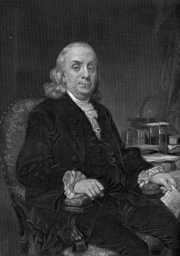 Franklin made no secret of his goal of national independence, at least a year before the Continental Congress voted and Thomas Jefferson composed his rather rambling declaration.
Franklin made no secret of his goal of national independence, at least a year before the Continental Congress voted and Thomas Jefferson composed his rather rambling declaration.
Donor Intent
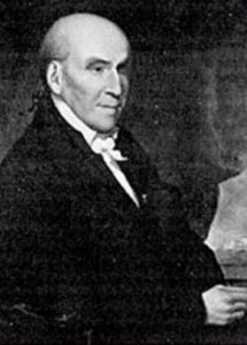 Measure a civilization by how it acts when a donor has died but his possessions endure. Especially when his firmly declared wishes conflict with their own.
Measure a civilization by how it acts when a donor has died but his possessions endure. Especially when his firmly declared wishes conflict with their own.
U.S. and E.U. Exchange Experiences (1)
 The European Union follows the American example. ...
The European Union follows the American example. ...
Compromise Outside the Borders of a Debate
 .....Break a deadlock by seemingly unrelated trade-offs.
.....Break a deadlock by seemingly unrelated trade-offs.
The Value of Large Law Firms
 Young lawyers clamor and strive to be employed by huge law firms, but most of them complain bitterly once they achieve the goal. What's this all about?
Young lawyers clamor and strive to be employed by huge law firms, but most of them complain bitterly once they achieve the goal. What's this all about?
Charter of Incorporation of Franklin Inn Club (1902)
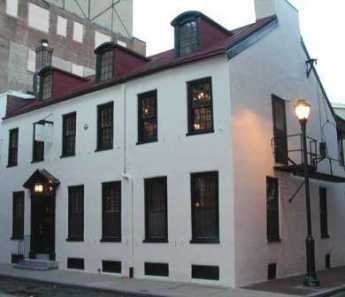 In 1902, four noted Philadelphia gentlemen appeared before a judge and incorporated the Franklin Inn Club, whose purpose was to promote social intercourse among authors, illustrators, editors, and publishers.
In 1902, four noted Philadelphia gentlemen appeared before a judge and incorporated the Franklin Inn Club, whose purpose was to promote social intercourse among authors, illustrators, editors, and publishers.
The Man Behind the Mann
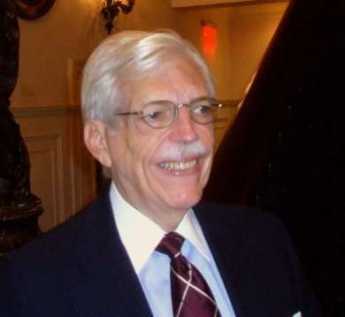
South Amboy Explodes
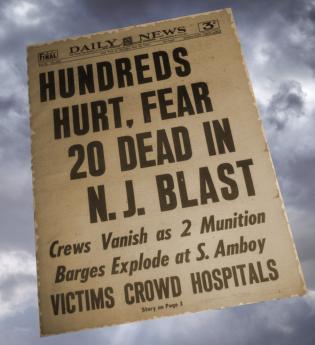 On May 18, 1950, South Amboy, New Jersey blew up, breaking windows of five counties in its neighborhood.
On May 18, 1950, South Amboy, New Jersey blew up, breaking windows of five counties in its neighborhood.
The Corinthos Disaster
 We hope the 1975 Corinthos disaster proves to be the worst fire in Philadelphia history; it's hard to imagine a bigger one.
We hope the 1975 Corinthos disaster proves to be the worst fire in Philadelphia history; it's hard to imagine a bigger one.
HSP: Philadelphia's Attic
 The Historical Society of Pennsylvania started out in 1824 as a repository of family treasures. Several mergers and changes of direction have given it a new mission.
The Historical Society of Pennsylvania started out in 1824 as a repository of family treasures. Several mergers and changes of direction have given it a new mission.
Computer Adjectives
 The basic concepts of a computer can be reduced to three adjectives, related to the ideas of three men at the University of Pennsylvania. Mauchly made a general purpose computer. Eckert made an electronic version of it. And von Neumann designed the stored instruction set. An electronic, stored-instruction, general-purpose computer resulted..
The basic concepts of a computer can be reduced to three adjectives, related to the ideas of three men at the University of Pennsylvania. Mauchly made a general purpose computer. Eckert made an electronic version of it. And von Neumann designed the stored instruction set. An electronic, stored-instruction, general-purpose computer resulted..
Philadelphia's Big Ben
The second largest bell in the world tolls at noon in Philadelphia. You can't overlook the sound, but many people don't know where it comes from.
Cost of Medical Care
 Milton Hershey agreed to fund the Hershey Medical School out his own pocket, after a ten-minute conversation.
Milton Hershey agreed to fund the Hershey Medical School out his own pocket, after a ten-minute conversation.
Greenwich, Where?
 A charming little colonial village in the Pine Woods of New Jersey has a long history, few visitors, and nothing reconstructed. It's the real thing.
A charming little colonial village in the Pine Woods of New Jersey has a long history, few visitors, and nothing reconstructed. It's the real thing.
New Jersey: A Keg Tapped at Both Ends (2)
 The New Jersey legislature began by ratifying the Declaration of Independence in Haddonfield, then moved to Trenton and concerned itself with debts, then with railroads, then corporations, and now -- with debts, again.
The New Jersey legislature began by ratifying the Declaration of Independence in Haddonfield, then moved to Trenton and concerned itself with debts, then with railroads, then corporations, and now -- with debts, again.